#this is a tribute to both succession AND Barry by the way. if you even care
Text
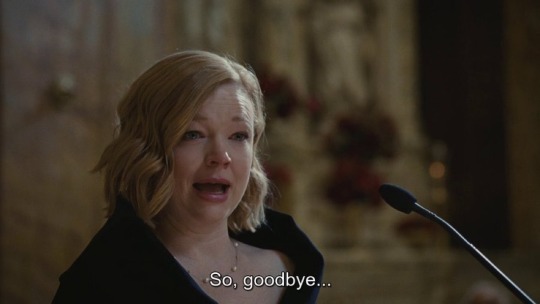
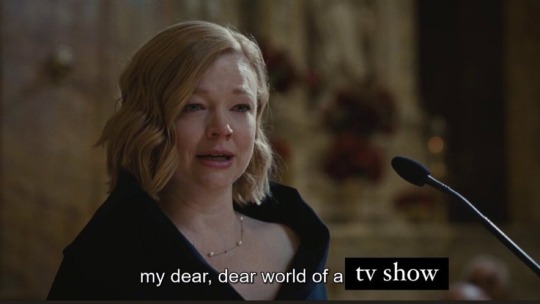
half an hour </3
#i did NOT pre grieve I’ll have you all know#this is a tribute to both succession AND Barry by the way. if you even care#succession#barry hbo
840 notes
·
View notes
Text
Donald O’Connor Deserves to be a Super Star By Susan King

Donald O’Connor was a star. But I always thought he should have been a super star – a honorary Oscar-winning, an AFI Life Achievement Award and a Kennedy Center Honors recipient. He should be considered an equal to other legendary musical comedy stars, like Fred Astaire and Gene Kelly, especially considering his remarkable athletic and acrobatic “Make ‘Em Laugh” number in the beloved Kelly-Stanley Donen MGM musical SINGIN’ IN THE RAIN (‘52), in which he literally backflips off walls, leaps over a sofa and even wrestles with a fabric mannequin. It was a gravity defying routine that is still a work of brilliance nearly 70 years later.
What makes that number even more astonishing, is that it was O’Connor’s second attempt at the exhausting routine that’s captured on film. He told me in a 2002 Los Angeles Times interview that “when they filmed it, no one checked the aperture of the camera properly. It was all fogged up. So, the whole day’s shooting was ruined. We had to go back and do it again. But for me, it kind of helped because I knew it better and I was able to do it better in the number.”
During his heyday, O’Connor had it all. He was adorable, impish, possessed a lovely voice, great tap-dancing skills and uncanny comedic chops. And, he managed to hold on to his dignity and get laughs playing straight man to a wisecracking mule in Universal’s extremely lucrative FRANCIS series. In 1997, he told me that he loved doing the franchise, which began in 1950 with FRANCIS. “It was wonderful,” he noted. “It gave me a chance to get away from the song-and-dance character. I never thought they would be that successful.”
O’Connor quipped that he had a “fantastic” relationship with the mule, voiced by Chill Wills. “I have worked with a lot of jackasses! I’ve had plenty of experience. We were very dear friends until he started getting more fan mail and that was the end of that! That broke up our relationships. Ego clashed with ego.”

So why did superstardom evade him?
After all, when the Film Society of Lincoln Center honored him 1997, The New York Times’ dance critic Anna Kisselgoff gushed, “To call Donald O’Connor a song-and-dance man is like calling Shakespeare a strolling player.” O’Connor’s timing was off. When he reached the height of his popularity in the early 1950s, the studio system and big movie musicals were on their way out. He only made a handful of musicals after SINGIN’ IN THE RAIN. And then movie offers basically dried up after the ill-fated biopic THE BUSTER KEATON STORY (‘57), which tanked with both critics and audiences.
And then there was his life.
O’Connor made audiences laugh, but his real-life was anything but joyous. He was literally born in a trunk in 1925 to a circus strongman and a circus acrobat. He lost his father at six months old when his father died of a heart attack in the middle of his routine. O’Connor’s overbearing mother put her children in the act. O’Connor told me he joined the family act when he was just 13 months old. “The first thing I did was dance and do acrobatic trips.” O’Connor told me that his mother never sent him to school. His sister was killed when she was hit by a car, and when O’Connor was 12, his brother Billy died of scarlet fever.
He began drinking when he was about 19 years old while serving in World War II and began to rely on the bottle. His New York Times obituary quoted him saying, “Instead of coming home and having one or two drinks, I’d have one or two bottles.” O’Connor had a heart attack while in his 40s, spurred by his use of nitroglycerin pills before his nightclub acts so he would have the stamina for his routines. He would later have quadruple-bypass surgery in 1990. O’Connor had a physical collapse in 1978 due to his alcoholism. He was sober by 1979 and remained so until his death at 78 in 2003.

I got the opportunity to interview him three times: in the early 1980s, when he was at the Dorothy Chandler Pavilion in a production of Show Boat as Cap’n Andy; in 1997 when he co-starred in the Jack Lemmon/Walter Matthau comedy Out to Sea; and in 2002 when he was appearing at the Academy of Motion Pictures Arts and Sciences’ tribute to SINGIN IN THE RAIN.” Each time I found him charming and sweet.
I was recently watching William A. Wellman’s action-adventure Beau Geste (‘39) and there was O’Connor charming as the younger version of Gary Cooper’s character. He’s was equally enchanting in his first major film SING YOU SINNERS (‘38), in which he portrays Bing Crosby’s younger brother (Crosby is actually old enough to play O’Connor’s father) who becomes a jockey. He became a teen dream when he was put under contract at Universal in the early 1940s, usually appearing with Peggy Ryan in a series of youth-oriented musicals. Critics took notice of the teenager with The New York Times praising his turn in the musical comedy MISTER BIG (‘43), stating “as fresh and delightful a performance as any jaded eye could care to see.”
O’Connor told me that he did 14 films in one year before he entered the service. “The pictures were making so much money, they tried to get in as many as they could so they could release them once every three months while I was in the service. So, when I was in the service, my career was going up all the time. They all made a fortune for the studio.”

He was so popular in the 1950s that he hosted the Academy Awards in Los Angeles in 1954 (Fredric March anchored in New York) and that same year won the Emmy as the host of The Colgate Comedy Hour. And after watching him performing on Texaco Star Theater, New York Herald Tribune’s critic John Crosby enthused that O’Connor was “one of the greatest all-around talents in show business.”
I went on YouTube to watch clips of O’Connor recently. I suggest you do, too. It’s uplifting and joyous watching his fun routine on skates in the “Life Has its Funny Little Ups and Downs” from I LOVE MELVIN’S (‘53), which reunited him with his SINGIN IN THE RAIN costar Debbie Reynolds. And I also enjoyed his “I Love a Mystery” routine from the Deanna Durbin musical SOMETHING IN THE WIND (‘47), in which he duets with numerous colorful balloons.
After he began sober, O’Connor returned to work in such films as Milos Forman’s RAGTIME (‘81) and Barry Levinson’s TOYS (‘92), and he continued to work on stage, in clubs and on TV. He told me in 1997 that retirement was a dirty word to him, and even at 72, he was on the road about 32 weeks a year. “It keeps me really busy. I sing, dance, do comedy.” I told him that he should do more movies. “Well, I know it,” O’Connor said, laughing. “Get in there and talk it up. Be my agent!”
#Donald O'Connor#Singin in the Rain#muscial#classic musical#old hollywood#Make Em Laugh#funny#Gene Kelly#TCM#Turner Classic Movies#Susan King
301 notes
·
View notes
Text
Veteran Stage and Screen Actor Lisa Banes Dies at 65 After Hit-and-Run

Veteran Stage and Screen Actor Lisa Banes Dies at 65 After Hit-and-Run
A mainstay of the New York stage, she also acted in films, including “Gone Girl.” She died 10 days after she was struck by a scooter as she was crossing a street in Manhattan.
Lisa Banes, whose stage and screen career spanned four decades, died on Monday at the age of 65. Her death comes 10 days after she was struck by a hit-and-run driver in New York City, according to police.
“We are heartsick over Lisa’s tragic and senseless passing,” Banes’s manager, David Williams, told People. “She was a woman of great spirit, kindness, and generosity, and dedicated to her work, whether on stage or in front of a camera and even more so to her wife, family, and friends.”
Williams told the outlet that Banes had succumbed to “a traumatic brain injury and was unable to recover” while at Mount Sinai Morningside hospital. Banes had the right of way at an Amsterdam Avenue crosswalk when she was hit by a scooter or motorcycle, the New York Post reported, citing police. Per the Associated Press, the New York Police Department said the driver did not stop and that no arrests in the case have been made. Williams told the AP he believed that the Los Angeles–based Banes was on her way to visit her alma mater, Juilliard.
https://canvas.jaycollege.com/eportfolios/12207/Home/__2021HD
https://canvas.jaycollege.com/eportfolios/12212/Home/_Man_In_Love
https://groups.google.com/g/sunny-sisters/c/U-T36gw64ng
https://groups.google.com/g/sunny-sisters-movie/c/ExgL_A8u8ho
https://groups.google.com/g/sunny-sisters-2021-1080p/c/a9E-qLljX68
https://groups.google.com/g/sunny-sisters-1080p/c/OeeKk3IBjJc
https://groups.google.com/g/sunny-sisters-movie-chinese/c/yH5RB45_okA
https://groups.google.com/g/sunny-sisters-movie-chinese/c/cQA5VRAnTOc
https://groups.google.com/g/sunny-sisters/c/p_CYurmbKrU
https://groups.google.com/g/sunny-sisters/c/ImlO7oCk_IM
https://groups.google.com/g/sunny-sisters-movie/c/xX9Mxl7G1BE
https://groups.google.com/g/sunny-sisters-movie/c/o1DSqRIF5UE
https://groups.google.com/g/expediente-warren-obliga-1080p-pdo-por-el-demonio/c/8h2KSbVcl2Q
https://groups.google.com/g/expediente-warren-obliga-2021do-por-el-demonio/c/ssJiDZaFp5I
https://groups.google.com/g/expediente-warren-obligado-por-el-demonio-1080p-2021/c/ko_Jt8IMfwE
https://www.guest-articles.com/news/veteran-stage-and-screen-actor-lisa-banes-dies-at-65-after-hit-and-run-a-mainstay-of-the-new-16-06-2021
https://www.guest-articles.com/news/gone-girl-actress-lisa-banes-dies-aged-65-following-accident-us-actress-lisa-banes-16-06-2021
https://www.guest-articles.com/news/gone-girl-actor-lisa-banes-dies-10-days-after-hit-and-run-in-new-york-us-actress-lisa-16-06-2021
https://www.thewyco.com/news/veteran-stage-and-screen-actor-lisa-banes-dies-at-65-after-hit-and-run-a-mainstay-of-16-06-2021
https://www.thewyco.com/news/gone-girl-actress-lisa-banes-dies-aged-65-following-accident-us-actress-lisa-banes-has-16-06-2021
https://www.thewyco.com/news/gone-girl-actor-lisa-banes-dies-10-days-after-hit-and-run-in-new-york-us-actress-lisa-16-06-2021
https://movie793738308.wordpress.com/2021/06/16/gone-girl-actor-lisa-banes-dies-10-days/
https://healthymboa.org/forum-healthymboa/topic/gone-girl-actor-lisa-banes-dies-10-days/#postid-5868
http://www.shadowville.com/board/buyselltrade/on-the-movie-screen-she-played#p481319
https://www.getrevue.co/profile/satubulan65/issues/weekly-newsletter-of-satubulan65-issue-1-652678/0fe05ce8-a0a5-4a96-9ab9-8983e156a144
https://m.mydigoo.com/forums-topicdetail-287509.html
https://www.codergirls.org/forum/internshipcollege-essay/gone-girl-actor-lisa-banes-dies-10-days
Born in Ohio, Banes acted in several films throughout her career, including as Tom Cruise’s love interest in 1988’s Cocktail and the mother of Rosamund Pike’s Amy in 2014’s Gone Girl. She also appeared on TV shows such as The Orville, Nashville, China Beach, and Masters of Sex. Banes made her Broadway debut in Neil Simon’s 1988 play Rumors. She then booked roles in the 1998 musical High Society and the 2010 revival of Noël Coward’s Present Laughter. Tributes from her collaborators, including Seth MacFarlane and Dana Delany, poured in on Twitter.
“I am brokenhearted to share that Lisa, my beautiful wife and my love, passed away last night,” Banes’s wife Kathryn Kranhold said in a statement to Deadline. “We appreciate the love, support and prayers from all of you across the country. Lisa was listening.”
“I am brokenhearted to share that Lisa, my beautiful wife and my love, passed away last night,” Banes’s wife Kathryn Kranhold said in a statement to Deadline. “We appreciate the love, support and prayers from all of you across the country. Lisa was listening.”
Known for her wry humor and confident, elegant presence, Ms. Banes appeared in more than 80 television and film roles, as well as in countless stage productions, including on Broadway.
She found quick success in the theater after coming east from Colorado Springs in the mid-1970s and studying at the Juilliard School in New York.
In 1980, when the Roundabout Theater revived John Osborne’s “Look Back in Anger,” with Malcolm McDowell in the lead role as the angry Jimmy Porter, she played his overstressed wife.
“Lisa Banes has a remarkably effective final scene,” Walter Kerr wrote in The New York Times, “on her knees in anguish, face stained with failure, arms awkwardly searching for shape and for rest.”
The next year, at the Long Wharf Theater in New Haven, Conn., she was in a production of the James M. Barrie comedy “The Admirable Crichton,” playing a daughter in an upper-crust British family that becomes shipwrecked on a deserted island.
“As Lady Mary,” Mel Gussow of The Times wrote in his review, “Lisa Banes has a regal disdain. Gracefully, she plays the grande dame, and with matching agility she becomes a kind of Jane of the jungle, swimming rivers and swinging on vines — a rather far-fetched transformation, brought off with panache by this striking young actress.”
Off Broadway roles kept coming. Later in 1981 she and Elizabeth McGovern had the lead roles in Wendy Kesselman’s “My Sister in This House” at Second Stage Theater. In 1982, at Manhattan Theater Club, she was the sister Olga in Chekhov’s “Three Sisters,” part of a starry cast that included Dianne Wiest, Mia Dillon, Jeff Daniels, Christine Ebersole and Sam Waterston.
In 1984, when Ms. Banes was in the midst of a run in Wendy Wasserstein’s comedy “Isn’t It Romantic” at Playwrights Horizons, The Times named her one of 15 stage actresses to watch. She was nominated for a Drama Desk Award for her performance in that play.
Her Broadway debut came in the 1988 Neil Simon comedy “Rumors,” and she returned to Broadway in Tom Stoppard’s “Arcadia” (1995), the Cole Porter musical “High Society” (1998) and a revival of Noël Coward’s “Present Laughter” (2010).
One of her most recent stage appearances was in 2018 at the Huntington Theater Company in Boston, where she played one of the two lead roles in the premiere of Eleanor Burgess’s “The Niceties,” a drama that pitted her seemingly progressive lesbian professor against a young Black college student, played by Jordan Boatman.
Don Aucoin, reviewing the production in The Boston Globe, praised their performances, saying that “both find the nuances in their characters, conveying the occasional cracks within their seeming certitude.”
As Ms. Banes established herself in the theater, Hollywood also came calling. Her first film role was in 1984 in “The Hotel New Hampshire,” Tony Richardson’s adaptation of the John Irving novel, and she began turning up frequently on television, including in regular roles on “The Trials of Rosie O’Neill” in the early 1990s and, more recently, “Royal Pains,” “Nashville” and the outer space comedy “The Orville.”
“Her stage presence, magnetism, skill and talent were matched only by her unwavering kindness and graciousness,” Seth MacFarlane, the creator and star of “The Orville,” said on Twitter.
On the movie screen, she played Tom Cruise’s arrogant older girlfriend in “Cocktail” in 1988 and the acerbic mother of a missing woman in David Fincher’s “Gone Girl” (2014), with Ben Affleck and Rosamund Pike.
Lisa Lou Banes was born on July 9, 1955, in Cleveland. Her father, Ken, worked in advertising, and her mother, Mary Lou (Shalenhamer) Banes, was a model.
Lisa grew up in Colorado Springs, where she focused on acting early. Her first paying job, she told The Gazette of Colorado Springs in 2014, was as a cast member at a dinner theater in nearby Manitou Springs.
“They served liquor,” she said. “I’m pretty sure I lied about my age because I was only 15 and you had to be 16.”
In addition to Ms. Kranhold, Ms. Banes is survived by a brother, Evan Sinclair, and her stepmother, Joan Banes.
In the 10 days after her accident, actors and playwrights who had worked with Ms. Banes expressed their support and shock at what happened.
Ms. Burgess, who wrote “The Niceties,” said she had been with Ms. Banes shortly before she was struck by the scooter and described her as a “brilliant, vibrant, wonderful woman.”
Correction: June 15, 2021
An earlier version of this obituary misstated the surname of an actress who appeared with Ms. Banes In the 1982 Manhattan Theater Club production of Chekhov’s “Three Sisters." She is Christine Ebersole, not Ebersol.
Her death, at Mount Sinai Morningside Hospital, was confirmed by the New York Police Department, which said she had been struck by the scooter June 4 as she was crossing Amsterdam Avenue near West 64th Street in Manhattan.
The operator of the scooter had driven through a red light before crashing into Banes and then fled, said Sgt Edward Riley, a police spokesperson. Riley said Tuesday that no arrests had been made.
Banes lived in Los Angeles and had been in New York visiting friends, her wife, Kathryn Kranhold, said.
Known for her wry humour and confident, elegant presence, Banes appeared in more than 80 TV and film roles, as well as in many stage productions, including on Broadway.
She found quick success in the theatre after coming east from Colorado Springs, Colorado, in the mid-1970s and studying at The Juilliard School, in New York.
In 1980, when the Roundabout Theatre revived John Osborne’s “Look Back in Anger,” with Malcolm McDowell in the lead role as the angry Jimmy Porter, she played his overstressed wife.
“Lisa Banes has a remarkably effective final scene,” Walter Kerr wrote in The New York Times, “on her knees in anguish, face stained with failure, arms awkwardly searching for shape and for rest.”
The next year, at the Long Wharf Theatre in New Haven, Connecticut, she was in a production of James Barrie's comedy “The Admirable Crichton,” playing a daughter in an upper-crust British family that becomes shipwrecked on a deserted island.
“As Lady Mary,” Mel Gussow of The Times wrote in his review, “Lisa Banes has a regal disdain. Gracefully, she plays the grande dame, and with matching agility she becomes a kind of Jane of the jungle, swimming rivers and swinging on vines — a rather far-fetched transformation, brought off with panache by this striking young actress.”
Off-Broadway roles kept coming. Later in 1981, she and Elizabeth McGovern had the lead roles in Wendy Kesselman’s “My Sister in This House” at Second Stage Theater. In 1982, at Manhattan Theatre Club, she was sister Olga in Chekhov’s “Three Sisters,” part of a starry cast that included Dianne Wiest, Mia Dillon, Jeff Daniels, Christine Ebersole and Sam Waterston.
In 1984, when Banes was in the midst of a run in Wendy Wasserstein’s comedy “Isn’t It Romantic” at Playwrights Horizons, The Times named her one of 15 stage actresses to watch. She was nominated for a Drama Desk Award for her performance in that play.
Her Broadway debut came in the 1988 Neil Simon comedy “Rumors,” and she returned to Broadway in Tom Stoppard’s “Arcadia” (1995), the Cole Porter musical “High Society” (1998) and a revival of Noel Coward’s “Present Laughter” (2010).
One of her most recent stage appearances was in 2018 at the Huntington Theater Company in Boston, where she played one of the two lead roles in the premiere of Eleanor Burgess’ “The Niceties,” a drama that pitted her seemingly progressive lesbian professor against a young Black college student, played by Jordan Boatman.
Don Aucoin, reviewing the production in The Boston Globe, praised their performances, saying that “both find the nuances in their characters, conveying the occasional cracks within their seeming certitude.”
As Banes established herself in the theater, Hollywood also came calling. Her first film role was in 1984 in “The Hotel New Hampshire,” Tony Richardson’s adaptation of the John Irving novel, and she began turning up frequently on television, including in regular roles on “The Trials of Rosie O’Neill” in the early 1990s and, more recently, “Royal Pains,” “Nashville” and the outer space comedy “The Orville.”
“Her stage presence, magnetism, skill and talent were matched only by her unwavering kindness and graciousness,” Seth MacFarlane, creator and star of “The Orville,” said on Twitter.
On the movie screen, she played Tom Cruise’s arrogant older girlfriend in “Cocktail” in 1988 and the acerbic mother of a missing woman in David Fincher’s “Gone Girl” (2014), with Ben Affleck and Rosamund Pike.
Lisa Lou Banes was born July 9, 1955, in Cleveland. Her father, Ken, worked in advertising, and her mother, Mary Lou (Shalenhamer) Banes, was a model.
Lisa grew up in Colorado Springs, where she focused on acting early. Her first paying job, she told The Gazette of Colorado Springs in 2014, was as a cast member at a dinner theater in nearby Manitou Springs.
“They served liquor,” she said. “I’m pretty sure I lied about my age because I was only 15 and you had to be 16.”
In addition to Kranhold, Banes is survived by a brother, Evan Sinclair, and her stepmother, Joan Banes.
In the 10 days after her accident, actors and playwrights who had worked with Banes expressed their support and shock at what happened.
Burgess, who wrote “The Niceties,” said she had been with Banes shortly before she was struck by the scooter and described her as a “brilliant, vibrant, wonderful woman.”
© 2021 The New
2 notes
·
View notes
Text
What is the joke?
The title of this post is a common question some people have asked in regard of “So You’re a Cartoonist?” and certain other comics quite a bit over the years, seeing how some strips tend to be often times centered around a very confusing meme or inside jokes Dobson heard about. Then there are also those that were never meant to be funny to begin with, as they are focused on Dobson soapboxing about criticism or what he considers is an issue in nerd culture you should be outraged about, cause otherwise you are a nazi.
And then there are “strips” like this one, published in early April 2014.
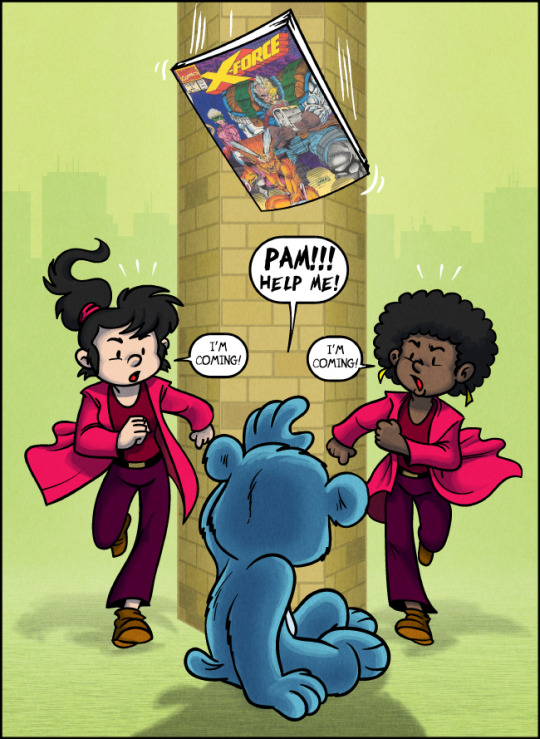
And I just have to ask: Why does that even exist? Cause honestly, it is not even a joke. It is a butchered reference.
For those not aware what it references, here the short explanation:
In 1961 DC comic writer Gardner Fox, who among other things created Jay Gardner, the Golden Age DC comic Flash, wrote the comic “Flash of Two Worlds”. In this book, then current Silver Age Flash Barry Allen manages to vibrate his molecules at such a frequency, that he breaks through a dimensional barrier into a parallel earth called “Earth-2”. An alternate reality in which Jay Gardner, whose only a fictional comic book hero in Barry’s world, actually exists. But his days as the Flash have been over for years, having retired and married his girlfriend. However, with three of his old villains on the loose and Barry trying to find a way home, Jay decides to help The Flash, taking up the old costume again, leading to a team up between the heroes of two major time periods in comic history.
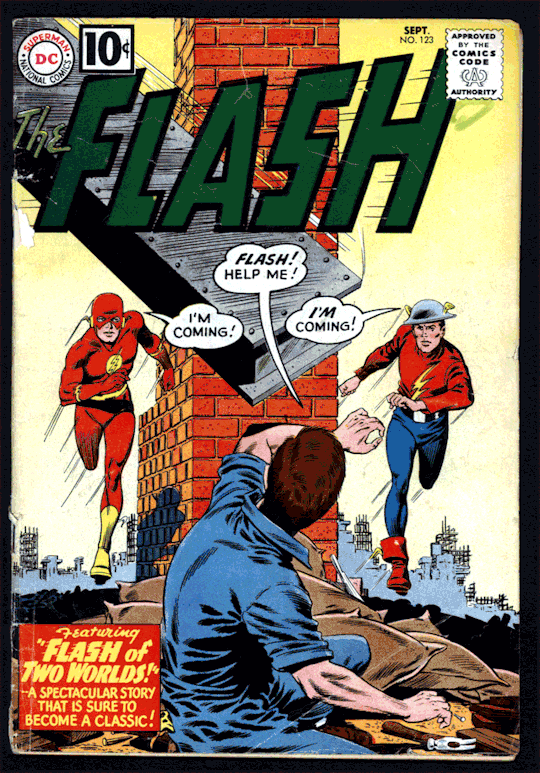
This comic marks a major point in the development of DC comics in general. Not only was it a meta celebration/tribute of the Golden Age Flash who had been long replaced in the public eye by Barry Allen, its success led to DC eventually revitalizing a lot of their major but at that point retired Golden Age characters, by making them all part of the Earth-2 reality.
The concept of a parallel-earth next to the main heroes reality introduced in this story would also become the very foundation for the concept of the DC multiverse, starting with the JLA story “Crisis on Earth-One” in 1963, over time eventually leading up to the most defining DC crossover that ever came and one of the most important comic events in the history of superhero comics: Crisis of Infinite Earths from 1985.
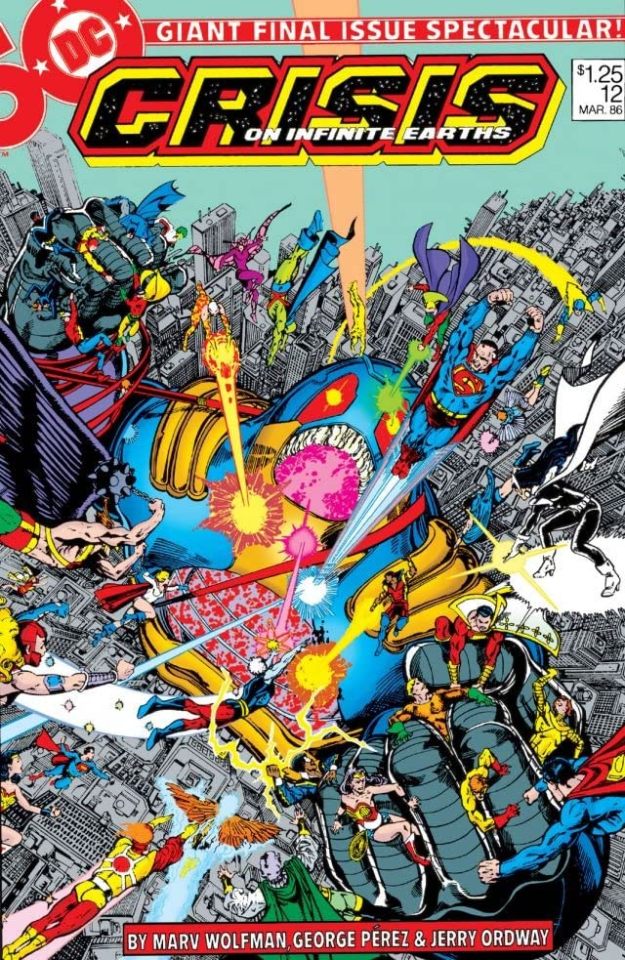
As of 2020, Flash of Two Worlds has been referenced in nerd culture a lot. Particularly the iconic cover has been referenced and parodied by many, including DC itself.
And yes, that cover is iconic. And why shouldn’t it be? Two Flashes, unaware of the other because of the “wall” (aka the dimensional barriere) trying to save someone, creating a certain suspense for the reader if the guy calling for help can be saved by either of the two speedsters before he is hit by the steel beam? Begging the question, how either of the two heroes may react when exposed to the other one? It is a genuinely suspenseful scene within just one pic, featuring the heroes of two generations of readers.
A pic that does however also lend itself for easy referential humor. All you need to do is just look for a franchise where something like alternate versions of main characters exist and replace them accordingly with the characters on the cover.
Here, have some fanart someone drew based on it of Sonic e.g.

And now imagine what others could do by doing something like that with characters from Rick and Morty, the Marvel multiverse, Star vs., Super Sentai, Paper and Regular Mario… different possibilities are given. You can either make it just a “straight” alternate take of the cover with other characters, or you can poke fun of it by changing something in the pic up significantly (e.g. I could imagine a Rick and Morty parody simply having Rick on the left being too drunk to save him, while on the right he is just mumbling something about Morty not having to worry cause he can just revive him in a clone body).
But the “joke” also only works if a certain context is still given.
People need to be aware of what the pic is referencing overall (the Flash of two Worlds cover) but also of the fact that such alternate versions of characters on the pic exist within the franchise that replaces the Flashes. The Sonic pic e.g. works, because it shows both classic and modern Sonic as the heroes. Something we had seen able to coexist within Sonic Generations and Sonic Forces.
In Dobson’s take however, the joke falls flat because Dobson uses something that up until ONE sketch prior has not even existed before: Black Pam.

For the record, this pic was released in late March 2014. You would now think that this picture existing was related to something like Dobson mocking critics of him for turning his self insert from a human into alternate universe Augustus Gummi all of sudden, by exaggerating changes in the designs of his other characters. But that can’t really be it, cause Dobson had turned himself into a furball of failure already for a year. He had also mocked the change in comics prior, as seen e.g. here.

So, why does “Affirmative Traction” as the one with Pink Dobson and Disco Pam is titled, exist? And by the way, I don’t like to call Black Pam racist, cause she could be way more stereotypical, but you really didn’t need to go Cola Light Disco blacksploitation with her design, Dobson.
But back to “Pam of Two Worlds”; As said, the joke with “two Pams” doesn’t really work, cause one of them is essentially a non entity and could also just be replaced with any other race or gender swapped version Dobson could have thought off. Furthermore, why is Dobbear calling for help exactly? Because a copy pasted tradepaperback of X-Force, likely drawn by Liefeld, is going to hit him on the head? I know it is just meant to be a joke and not something to think of too much, but the thing about jokes is, they too need to make a certain amount of sense and have a certain logic to them in order to work. This doesn’t really work because the “danger” is 150 pages of distillated 90s Marvel trash going to hit him on the noggin.
As long as it is not thrown from the Empire State Building, I doubt it can be any danger to Dobson. In fact, if he really wanted to draw something from which the Pams of two strips could save him, it should have been a spray water bottle. At least then the majority of people on the internet would get the joke.
#adobsonartworks#adobsonartwork#andrew dobson#so you are a cartoonist#syac#crossover#dc comics#reference humor#comics
21 notes
·
View notes
Text
Why The Bee Gees Were More Than Saturday Night Fever
https://ift.tt/3441PUp
Generations of music fans know the Bee Gees — British-born, Australia-based brothers Barry, Robin and Maurice Gibb — as the musical act that created the songs for Saturday Night Fever, the 1978 movie that made John Travolta a star and catapulted what was known at the time as “disco” music to the forefront of pop culture.
But not only did the Bee Gees create indelible dance staples like “Stayin’ Alive,” “Night Fever,” and “More Than a Woman,” but they had an entire career before Saturday Night Fever, one which was launched in the 1960s and yielded pop classics like “How Do You Mend a Broken Heart,” “To Love Somebody,” “Massachusetts,” “I Started a Joke,” and more, before their gradual turn toward R&B and dance with hits such as “Jive Talkin’” and “Nights on Broadway.”
Along the way, the Bee Gees broke up, battled each other and various addictions, went through dizzying career ups and downs, wrote hits for other artists and succumbed to tragedy, with Robin, Maurice, and younger brother Andy (who started as a solo act before joining his siblings in the Bee Gees) passing away in 2012, 2003 and 1988 respectively.
They also experienced one of the most vicious backlashes in pop history as the tide turned against disco by the end of the 1970s — a backlash that may have been fueled by racism and homophobia as well as the oversaturation of the market.
Now the entire story of the Bee Gees has been chronicled in an excellent new documentary, The Bee Gees: How Can You Mend a Broken Heart, which premieres this weekend on HBO in the US and Sky Documentaries in the UK. The film is directed by Frank Marshall, the legendary producer whose own track record with Amblin and his own Kennedy/Marshall Company includes films such as the Indiana Jones series, the Back to the Future trilogy, Poltergeist, the Jurassic Park/World saga, Who Framed Roger Rabbit?, Arachnophobia (which he also directed), The Sixth Sense and many more.
Den of Geek had the privilege of speaking with Marshall about his own view of the Bee Gees, working with Barry Gibb and the families of the other brothers, their place in pop culture and more.
Den of Geek: I went into this film not being a particularly huge Bee Gees fan, but certainly knowing who they are and knowing certain parts of the legacy like Saturday Night Fever. I came out of it wanting to get all those early albums and just fascinated by their whole story.
Frank Marshall: Well, thanks. It was an extraordinary journey. That’s what I love about documentaries, you don’t know where you’re going, unlike my day job where I know everything I’m doing that day. This was such a great journey of discovery and so I’m glad you enjoyed it.
I read that your father was a musician and you play guitar yourself, so music has always been an important part of your life.
Yeah. That was the connection here, that I grew up in a musical family. My dad was a guitar player and conductor and composer. He was actually under contract at Capitol Records. So there was a lot of connective tissue that went into this. So it kind of made sense to me. It was kind of natural.
What was your first exposure to the Bee Gees and what was it about them that struck a chord for you, so to speak?
When I thought back I knew their early songs because I grew up obviously in the ’60s, ’70s, but they really didn’t have an impact for me until Saturday Night Fever. I was shooting The Warriors, which was also at Paramount, and so it was a big deal to have this movie soundtrack suddenly become such a giant success. That was my first realization that they were pop superstars. The music from the movie was incredible. The songs were all different and really fit to the movie. Then to find out later, when I’m doing this doc, that none of it was planned, that’s incredible.
I love that portion of the documentary where it comes out that some of the execs at Paramount at the time were looking down at the “little disco movie” and had no idea what it was going to become.
Certainly, at that moment I happened to be at Paramount when that was going on. We were doing The Warriors, and I remember hearing about a little disco movie. John Travolta was a TV star. Nobody saw this coming.
What inspired you to do a film about the Bee Gees? You worked with Martin Scorsese on The Last Waltz, which is a very different film, but in terms of how to make a great music documentary was that an inspiration?
Well, Marty’s kind of an inspiration for whatever you want to do. But I’ve always loved documentaries. I’ve never really had the opportunity to do them just because they take so long and they’re so involved, and I’ve had my day job. But we started dabbling. I directed my first short doc about 10 years ago and I really loved it, but it was only 50 minutes and it was a very specific subject. We’ve kind of been dabbling in them and then Kennedy/Marshall, about five, six years ago, started really making them.
I was over at Capitol Records meeting with the head, a fellow named Steve Barnett, who had just remodeled and refurbished Capitol Records. I was marveling at how fabulous it was and it reminded me of my early days with my dad and being there and everything. So we started talking about documentaries or stories that might be told at Capitol.
He said, “Well, I just acquired the Bee Gees catalog. We want to try some to do some things to reintroduce and reinvigorate the catalog, and we think a documentary would be great.” I said, “Hey, I’m in. I’ve always thought there were an amazing group and I’d love to get into how that all came about.” So it was being in the right place at the right time for me, and that was four years ago.
Read more
TV
HBO Max New Releases: December 2020
By Alec Bojalad
Movies
Zappa Review: Alex Winter’s Documentary Profiles a True Mother of Invention
By Tony Sokol
What would you say is the secret to a good documentary?
I think you have to dive deep. I think it can’t be superficial and you can’t tell a story that people know. I think you really have to dig deep into the characters to find that. You start with a general arc and for me it was the family and this gift of creativity that they had. But where did it come from?
The reason I went and got Nigel Sinclair to produce this was I looked at the fabulous doc that he did with Ron Howard on the Beatles and I said, “If they can find footage that had never been seen before of the Beatles then he can help me find footage for this.” It has to be one of those things that had never been seen before.
It needs to have some weight to it. As they say, it needs to be authentic, it needs to be real. You can’t pull wool over people’s eyes. They know if it’s a puff piece. This one, it has its ups and downs. It’s got its joyous moments but there’s also some tragedy. It’s happy and sad. So I think that it really makes for the right story and it’s right for a documentary.
Were Barry Gibbs and the families of the other brothers up for it from the start, or did it take some convincing?
Well, it started with Barry. I met Barry when he came out here for the Grammy tribute and we kind of hit it off, I think, because I’m the oldest in my family, I have younger brothers, and we both grew up in a musical family. So we shared a lot of commonality. You have to get to know each other. I traveled down to Miami several times where we’d just talked. We didn’t shoot, we didn’t do any interviews. Then he introduced me to the rest of the family. Obviously, he was blessing the project and he just felt it was just the right time.
Was one of your goals to show people that the Bee Gees were more than Saturday Night Fever? There may be generations who don’t even know that they sang “How Can You Mend a Broken Heart” or “Massachusetts” or any of those other songs.
Yeah, I think it was really to reintroduce them to fans, but also introduce the younger generations of music buffs and music fans to who they really are. We’re really celebrating their legacy and what incredible songwriters they were.
They were this group that everybody knew, but I have two 20-year-old daughters and when I started putting on songs like “Islands in the Stream” and “Guilty,” they go, “Oh yeah, Barbra Streisand wrote that,” or “That’s Dolly Parton.” I said, “No, it isn’t. This is the Bee Gees.” They go, “What?” So, you’re right. There are all these songs that people know, but they don’t realize the songwriting gifts that the Bee Gees had as well.
One of the most shocking moments in the film was the Disco Demolition Night and the analysis of it by Vince Lawrence, who was a security guard at Comiskey Park for that event. When he started talking about pulling the Isaac Hayes and Al Green records out of the bonfire, that just blew me away. And the backlash against the Bee Gees was unbelievably intense.
When you delve into what was that about, I remember it but you don’t understand the impact society was having on music in those days and on the career of these guys. They were on the front wave of global superstardom. It wasn’t just local superstardom. They didn’t understand what was happening. They were just caught up in the changes and trends happening in society and the music was reflecting that. It’s the same kind of backlash that’s happening today about what you believe in.
Read more
Movies
Indiana Jones 5 Producer Promises Harrison Ford is the Only Indy
By Don Kaye
Movies
Jurassic World: Dominion Could Open the Door for More Jurassic Park Movies
By Don Kaye
First of all, they weren’t disco artists. They got labeled that. But, as you know, they were R&B, they were rock, they were so many other things, but they got labeled as this and then they got blamed for it. It wasn’t their fault. It was really unfair. It was that thing that we talk about in the movie that so often happens to superstars. Now, we understand it but back then they didn’t. So we went to explore why and that’s when we found Vince and we found Nicky Siano to really set and authenticate what was going on.
Nicky (a resident DJ at Studio 54 during the disco era) mentions in the doc how disco became such a success that the music industry basically oversaturated the market with it, which I think is also something you see in the film business. A superhero movie becomes big, so let’s shove 10 more superhero movies out there as soon as possible.
I think Nicky says it, it’s about greed. They lose sight of why it’s successful and then oversaturate and then people get angry and there’s a backlash. The Bee Gees were writing other songs as well, but it was that huge reaction to Saturday Night Fever that wasn’t their fault, but they got blamed for it.
When you meet a Barry Gibb, or work with Steven Spielberg or even Orson Welles, as you did early in your career, is there something different about their personalities, the way they look at the world that ties them together as these creative visionaries?
Well, yes, I guess. They’re all perfectionists. They don’t let it go until it’s out the door and they’re made to let go. That’s the commonality. What’s amazing to me, particularly in the case of the Bee Gees, was that Barry was a collaborator. He took this input from everybody around him and that’s what created the musicality that came into their songs. It wasn’t just one thing.
He took ideas from here and from there and said, “Give us a riff over there or play that thing that you played last night.” He remembers it and that was all the creative process for him and he was natural. I think that’s what I see with Steven and certainly with Orson and with Barry is that it came naturally. It’s not work. They’re just naturally creative and that’s really the gift.
What would you like people to take away from seeing this, either brand new fans or older fans?
Well, I think it’s about the longevity and the fact that they were loving brothers. It was complicated, families are complicated, but their incredible musical gift and the impact that they’ve had on the pop music culture should not be underestimated. I think that’s what I want to do, is celebrate their legacy and hopefully people will rediscover them and discover them anew.
cnx.cmd.push(function() { cnx({ playerId: "106e33c0-3911-473c-b599-b1426db57530", }).render("0270c398a82f44f49c23c16122516796"); });
This interview has been edited for length and clarity.
The Bee Gees: How Can You Mend a Broken Heart premieres this Saturday (December 12) on HBO in the US and on Sunday (December 13) via Sky Documentaries in the UK.
The post Why The Bee Gees Were More Than Saturday Night Fever appeared first on Den of Geek.
from Den of Geek https://ift.tt/3a8weVk
2 notes
·
View notes
Text
Intention Headaches Chapter Nine
To Our Crumbling City:
How many dusks, overtaking dawn, have the drones
littered the skies just as the bodies litter the streets
devoid of human spirit, or the spirit in the machine
wishing to devour everything, but falling short
for its gingivitis and inflamed throat; lacking bite
it only leaks information, devoid of context, its
liberating enslavement, braying Cranes (weathered by time) –
Our crusades of laughter, our vicious joviality
slaughtering each other with mugs. Our curse of skin
sagging into itself as we drink ourselves away. Yet these halls
where we age like wine, slow and souring, the grapes
of wrath now forgotten, our hostility tempered
to a refined weapon which has grown rusted;
– (as all things become) Arrested by its final days...
So we, men loving, loving men, all lay in our residences
with our hands tied, to our legs, to our necks, to our lips
just as we find another place to take the whiskey
as if it were a thicker liquid, as if our essences were honey.
I reminisce on our togetherness, although never separated
we would feel ourselves becoming less of each other
and more automatons in Hephaestus’ pornography collections.
Weeping tears of liquid titanium, our craniums feel the bolts
losing their grips on each other. One by one, we slow ourselves
down to the moments where we forget the tides shifting
and not in our favor, but theirs.
We cannot pretend “All is well” when the negotiations
flat on the table, we lean ourselves against, came from the ones
with the wrench, loosening the screws so the table would fall on us.
We fought and we fought our own memories bitten into the dust.
They taste like blood, they are film reels playing the same things:
Cinemas of grotesques parading as “Just another day”.
Of course, we chose the life of one such gang.
So as to relive the memories, but omitting one key detail
that used to bind us all together:
No fault of ours, but a fault of the years. We once fought our everyday.
We once marched against the ones with their names on the tables.
It is both a great amusement and a bitter taste, then, that we act.
Such bravado for such cowardice. Surprised by our surmise, counteract
our love for men, for the love of death. For us, the muscles, the hair,
the beards and the bears, the shaved and the scarred, the bitten.
The sophist, the self-destructive, the slurred and the articulate.
The tortured and the torturer, the smokers and the freshest of breaths.
Those with supple breasts, milk which tastes like ale, hair like cotton
and when I drink from him he tells me to call him Captain.
We gather together, strangers, lovers, cousins, brothers.
Clergymen of our own blunders. Kissing the winds, each other.
Mistakes are acquaintances, even for the antiquated.
I see us all as the spit we lick from each other, our sweat
against the ceiling fans. Hardened buttocks betray
Sideways glances. All our contributions we owe to open secrets –
– If you listen real close, I’ll tell you:
Cranes are who we are, the ones who rest on the water.
Our necks twisted, faith distorted by the Orphic.
Between corners of each district, I see lights that operate.
“Whatever you wish to see at any given time shall be yours.”
Or so they say, the bastards, so holographic.
So courteous as to lie, as we in wait, because out of all the boasts
of technologies, all that were made were means to enslave.
Weaponry cannot baptise us any more than a plague.
For all the so-called advances, we have yet to find a way
to help each other live.
Cranes gather in an unassuming shack, by an unassuming docks.
Our base of operations. Above ground, by mere inches.
It’s a testament to my flair that I do not protest. For all the talk
of atrocities, what better way to live, than to tear through our insides?
We can change our parts for anyone. Our arms, our hearts
Our genitalia. All belong to us at any time, for the price of many lives.
It’s a testament to my amusement that I have played along so long.
So this tribute is for you, broken city, with your watchful eyes.
No, not you. Your uninhabited towers and your houses of horrors.
Those I care not for. This is a tribute to tributaries.
For the seas and the rivers, the ponds and the lakes, the oceans
which divide us all. We are united in the ways in which the currents
drag us under like a siren hungry for its next lover.
Oh, how I wonder who or what this is all for. For the rapids rest
just outside of the city itself. If we could conquer them, no.
If we could fornicate with them, then we may see passage.
For these many bridges will one day collapse.
Thank you, you foul creature. Just as you have thanked us.
Just as we have thanked each other by shaking hands.
Time and time again, I wish to suck your lips.
Beside your bridge.
Part I: Aloe Vera:
Vive la Karen:
Our old friend Karen came a callin’.
During our raucous rancor, our celebratory crowned affair.
No lordships, bishops, lieges, or bison, could stamp away
at our achievements in blissful ignorance.
But one could, our old friend Karen.
Every night, our home served as a tavern. Us, our own servers.
The disc is somewhere, corrupted and overwritten.
Blame it on our laughter, the lack of slumber, the swayed movements.
We couldn’t hear her until the lights were darkened.
We looked around, there was Karen.
“Your next and only mission is to disband.”
The machine’s grand announcement. No uncertainty present.
The panel on the wall with the eyeball, its ocular malice;
Glazed with its sterile gaze. Never more than what was needed.
Lack of subtlety and an unnecessary cruel mercy.
Karen couldn’t make the intent any more crystalline.
But, she decided to lay frosting on our cakes:
“There will be no funds. No rewards for your troubles.
But if your mission proves to be a success, you will not be shot
to death within a twenty-four hour window.”
We all exchanged expressions meant for lovers or distant relatives.
Straits were dire, and not to mention the famine of straights.
Only one was; he was a pale widow, sunken within a ship in a bottle.
I creaked, my bones atrophied, my cane gifting with splinters.
“You heard it, men. Time to pack it up. Our time has come to an end.”
My cyclical smile unwound back below my nostrils.
Everyone cheered, for the truth was an open secret.
Men between men, that was how it was kept.
We were not leaving each other.
We were leaving the city which made us.
I knew that thoughts and words could be heard
But few doubt the resolute.
Forward March:
Outside, still night. Still as it was eternal.
Our collective thoughts: holding hands.
Beef and chicken alike, in a hot pot
Made to be slurped down. That was us.
At least a hundred of us. Foot out in front.
Leg out in back. Each one making their
forward motions in unison to display our union.
We sang a little ditty, a barrage of showtunes.
Our weapons on our backs. Some of us as
Our own weapons, we guided ourselves.
I was eager, yet wary. Weary for the true outside.
So out of reach, the stars were unfocused.
Students left to their own devices.
Rats with shock collars and curds stuck in fur.
I was an all-out war and I am more.
Streets as empty as the night, Patron Saints of paint.
Nary a drive-by in sight. Pardon the mourning
of bloodshed; city wasn’t alive without someone to die.
On cue, a device to electrocute took a man
I loved so dearly that I only ever kissed his hand.
Nary a tear was shed, for the beast was fed at last.
Hunger was a strange thing, wishing for nothing
to fill up the stomach, but we could speak
of all the things we would eat when we escaped.
If only the fates would stop slurping our eyeballs.
I needed them to see, however myopic of me.
Part II: Bridge Out Ahead:
Approach:
As the steel greeted us with its sturdiness
we shook our heads in disgust, our tastebuds distorted.
Stealth was not an option; grasping at straws, we took aim
and attached our mucus membrane gelatin onto the beams.
Smiles and jeers, no time for cheers. Karens, no, turrets.
Torrent of them took aim without firing.
So we stood, forever lost in the absence of Father Time.
“City limits. Turn back now or be prepared to be shot on sight.”
Karen could be a ferocious one, always wanting to empty
the contents of the device inside of several men at once.
Oh, but such a fulfilling release would lead only to an end.
We would not be deterred, so long as my bones ached.
“Mikey, can you go on?”
“– Babe. I’m Logan.”
Only in the early 30s, already losing to the ravages of age.
Our weapons drawn, we took fire at the turrets named Karen.
They took struck at us. Some fell, some put up electric glass
As a means to protect. What we couldn’t protect was the bridge.
We knew our passage would not be a solid one. Not a stone skipped
but a record without any scratches.
Turrets could be intelligent, even within their torrents.
Aimed at the matter which held firm to the bridge’s limbs
we watched the load get blown. Several pieces, several
men hit in the name of revolution. Their concussion wouldn’t
Be in vain. But our means of escape, we were afraid.
Bridge dissipated, too damaged to be a salamander.
Many remain, yet we had to turn back. We saw
the rustic passage as a golden opportunity.
We walked across our fellow’s remains and back
to the home which we abandoned.
Whatever crustacean in the sky would bless us
I would bless in return; hermits, no more.
“Betty, would you do the honors?”
“What about you, Barry?”
Betty and Barry were the same man. Or the two men
were joined together. Their algae arms pawed at the crate
which kept hidden until the very day. I came up
With the idea, myself. I wanted to kiss Betty and Barry.
Betty and Barry were both men, men I could sail with.
Under the crate was our lever, our lover. Such a promise
In the form of a warm and hardened stick.
It had to be kept warm at all times, someone crawling
toward it in secrecy. The lever was powered by our
Equilibrium, no, our affectionate friction.
Part III: Ship of Relations:
Theseus:
Every day since our inception, we supplied ourselves.
Our end was always approaching, and Karen knew it.
Each month after shipment, we took boards.
Our hands were full, planks drawn, quartered. Flanked.
So on that night, or day, we finally deployed.
To test if it would float or sink. Fine testing, it was.
Fine men, we are. Fine enough to squeeze. Like mustard.
No, mayonnaise on a desert day.
Ship did float, and so we installed light
on our boots, so we could walk above water.
Perform miracles, if only for a few seconds.
Then, we watched the docks get shot down.
Karen was a diligent one. If only Karen was a man.
If I could hold a machine like men held me.
Like I’m a baby, and mother brought meat.
Baby Harold, waddling. But this baby was a button:
If I had twenty more years to get my youth back
Then I wouldn’t be so elderly. But in the 30s, you know.
Third decade brought booze and misery.
Booze could serve as a playground, or a death sentence.
One of my men had to help me aboard.
Soon, I and them, all on deck. Out with the city, in
With the forewarning breeze. Passionless in its stirring.
The wind would have to guide us.
My compass was too fogged by malicious software.
Incontinent:
Did we have food?
Yes, we had/have food.
It has expired, it has grown molded.
It tastes of our favourite bourbon.
It smells like a familiar flatulence.
It is food.
Did we have a map?
Yes, it told us where to love and how often.
There were sticks and stones.
In due time, we would break each other’s bones.
Then seal the deal and murder with words.
Later into the night, we would bring a kiss.
Did we have cabins?
Yes, just as we had means to sleep.
In each room weren’t beds, but we would keep
Each other warm in each other’s arms.
The body heat would be our thermostat.
The mast had a glow to it.
Did the ship move?
Just as it sails, a ship moves.
There is a wheel, it goes unused.
We move it to get the experience.
It reminds us to spin.
The ship itself, sails itself.
Automation is our lifeblood.
We designed our ship to forego hesitation.
Part IV: To Cutlery Sharks:
Cutlery Shark:
Waters blackened by the murky chemical invasion.
So long past, we almost think to drink it.
Instead, fresh men take purifying solutions within
the laboratories of the chemistry quarters.
I took a look and took a drink.
I became drunk off of it.
Some of us made the mistake of drinking
from the waters we sailed on; sickness set in.
Stumbled overboard, devoured by the sharks
with teeth made of cutlery.
It bit into our planks and turned some of us to rust.
We shot at the shark, but the creature split
into a husk of tapeworms with acidic spit.
I prayed for our continued passage and what answered:
Explosion! One man, a burly burlesque dancer
threw a brigade of explosives into the water.
The tides themselves roared and the tapeworms no more.
In our stead, a whirlpool and the seas quivering.
Skies above rained down cutlery. Messengers from the gods.
From the whirlpool, we washed our clothing.
I went first, taking a drink, then pouring the soap.
Our clothes fished, a mildew scent perforated
And left an imprint. Damp and musty, we lost nakedness.
I drank to that, as did all the rest.
Ol’ Phil Howards:
Phillip Howards was a man, or a shrew.
Hated men, or hated himself as an extension.
Hated me, but valued our friendship.
I loved the way he loved the fetal position.
Always did think of it as poetic.
Smooth sailing so far, I descended.
Down the hatch of madness.
Where in his private cabin, he was crouched.
In the far corners was his whispers.
He always said things not pale didn’t bode well.
I laugh because he was paler than the ghost of my mother.
Bless that woman’s heart, she raised a loving man.
Me, I was wrinkled more than my grandmother;
When I last saw her was on her deathbed. But I digress.
He always talked like he had one foot in the grave
while hoping others would go in instead.
I ask why he cower. His teeth chatters. He speaks in whispers:
“I’ve seen colours, more than black, more than deep purple.
There is smoke on the water and it signifies danger.
We shouldn’t undergo such a folly.
For I’ve seen colours, more than neon, but something brighter.”
“They haunt my dreams, the seas, they speak.
Though I do not understand their language, I know malice.
There is a healing intent, that I do see. The seas sing to me.
But they are not Siren’s Songs, but signs of foreboding.
What we sail will not cleanse our bodies.”
I laugh because he didn’t understand. He doesn’t wish to.
“If there can be any freedom for my men, any indication
that we can live within each other, and outside, that is enough.”
Although we both were former clergy, we resigned;
His distaste for others, yet belief that no one deserves healing.
Me, I loved men a little too freely.
He spoke again, eyes sunken, his face a full 180:
“There is a beast in the sea. The church spoke of one.
Which would heal any who dared enter.
But I am not ready to be healed by it.
I would rather stay inside, plead ignorance to the outside.
Know this: we know nothing. We will soon.”
I took a drink. Truer words never spoken.
The sea was a harsh mistress who seldom display her phallus.
Before I may part, he said one last thing:
“Friend, I am concerned about your drinking.
You appear in poor health.”
Part V: To Virginia:
First Sights:
As the cutlery sharks pacified, back into the depths
Whence, I too, descended. Only for one more sip.
Sips turn into a chug, which turn into grey hairs.
Hairs upon dogs I wish I had brought along, if only to keep warm.
Up above, breeze of the sea poured salt into me.
That was how I came to see the sights of the city:
We passed by endless roads of nothingness, always paved.
By the wayside were the routine machines paving their ways.
Little cars which drove themselves, express purpose of open flame.
And beside them, the skyscrapers, all plain and never-ending.
So too I, my whole face agape, will we ever find sanctuary?
Past the gangs, past each base, I wanted to know
what was past it all.
All our gazes, mine especially, shifted to the forests.
Those haunting woods with their shrill howls abound.
Those hounds which surely lurk, stalk, prey for me.
As I should pray for them, if my hands weren’t for drinking.
Those thickets and bushes, rustling of leaves from them trees.
I believe I could see shadows from the plants, the rabbits.
Deer and bears, then, something glistening:
Behooved horned creature.
They say Hemingway drank from its blood.
An open wound to ease the troubles.
As I partake in a drink of my own.
Common cure for the bereavement.
It stood to reason, I stand with my legs bent.
Cane not quite working, leg machine broken.
Forests, woods, pines, all stretched for miles and kilometers.
Other units of measurements. I don’t know them.
Centipentagrams? Terasects? Parallax?
One of those words are not like the others.
All that matters is the endlessness...the vast.
Undergrowth overtaking, but a crease, it does cease:
Trees line up. Stop.
Stop! Stop it!
Groan. I knew it.
I know, I knew it then.
The alcohol will not, would not, can never keep it at bay.
Oceans, tempest, they all expand. But the forest doesn’t.
Ain’t hear a root a shootin’.
City limits, where you think it ends, it doesn’t.
There is a mountain, next.
Hills, a rocky point. The forest itself a circle.
No, a circle cannot be a square.
Even if the circle be a peg, cannot be a leg.
Let me explain: like a barrier, a veil, a shield.
Preventing or protecting, cannot say.
But at the hills, past the rocky trail, lie a cliff-side.
Where I see their home: the final base.
We sure were sailing away.
To Virginia:
Dear friend, how did you let the years fill you up so fast?
Like the drink in my belly, in my liver, in my gut.
I ask for you gracefully, without a poem or a song to be sung.
No pretense about it, I remember your top aide:
Was it Vera? Or Santa Maria? Flo-Rida?
Maybe I don’t remember. Let me partake once more.
Aha!
As you are Ginny, she was Victory.
You and her and Virgil. The three of you in matrimony.
No doubt, you lost her in the hospital. As well as yourself.
Every day I stop being me, becoming an adjacent memory.
One day Heart. Hearth. Earth. Arthur. Hurt.
What do any of those ‘words’ mean?
Anyway, if I make it out, I won’t tell the outside:
That you were mad, wicked, numb, or naive.
I’ll read not only my poetry, but your unspoken words.
Just like the way you must wish for it to be.
Just you and her and him.
Those words you wish you could tell him that he already knows.
Those words you still wish you could tell him, anyway.
Before the hospital made you forget.
Or you chose to go.
I wouldn’t blame you, either way.
Oh! Look! Out on the cliff-side face! It’s your base!
Operations were much smoother when you didn’t have to think.
Wouldn’t you agree? Or is it just through my eyes that see?
See far too many things...right now I see…
Just past your base. To my ship’s side. It is!
I look and see To the Lighthouse, its burning beams.
Searchlights take us all someday. So I hope.
What am I doing? Writing this letter to you?
Who am I kidding? It will never get sent.
Just like you will never say the words to him.
The ones he already knows, but you wish you could say.
That’s OK. Just like Oklahoma, the place.
I read about it when I was a kid.
Millennia and a half, maybe more, ago.
It was said to have existed. Like Agartha.
Like Atlantis.
But those places were fairy tales we told each other as children.
I never met you as a kid. I never much believed in the English.
Your house and its hinges, where you reside, your age untapped.
By madness, it still lies still.
No fear for you, only admiration.
I would have let you criticise me any day, if I could continue.
You may live to see more days, but will you ever escape?
Look! I see your garden! Down by the beaches!
Your little Daisies and Petunias, Pansies and Begonias.
How you would walk with your watering can.
Sing, “I must tend to my Sapphics.”
Hark! On cue, one of those devoted.
Adeline with bear claws, passes by pansies.
Hangs on a laundry line a pair of panties.
I wave, so does she. She asks the crew what we’re doing.
“We’re sailing for freedom!” I make my declaration.
“Yeah! Come get y’all freedom!” She echoes the statement.
Even if I cannot send you this letter when my men escape.
I would like to pretend that you have read it.
If there were any proof of an outside world. Or a “world” at all.
I would like to send this your way, as a form of evidence.
I have to go now, Ginny, for gin is calling me
and the end is approaching, my dear friend.
Whom I’ve never interacted with.
Part VI: The End:
Earth is Both Round and Flat:
We did it.
Thoughts and prayers were answered with cheers.
Clangs of mugs! Hoo-rah!
I take my tiptoes to Phil Howards, he mumbles
about his fiendish friend, from the clergy, St. Eliot:
“The sea is a wasteland...the sea is a wasteland…”
I shake my head. The Wasteland was what I counteract.
For water is not soil. Or so it was, I would have soiled my pants.
Rather than the piss that smelled of bourbon.
Taking to him, I say:
“We made it! Soon we shall live!”
His eyes, first things to turn, I see not.
Instead, clam shells or oyster heads.
Spiral homes for hermit crabs.
His mouth was a starfish.
Words were no longer important.
But so I heard, just as I will hear:
“We have not left, only departed. The true end is the end.”
I leave him. There is an above to this.
There cannot be a Hell with a head above water.
One man in the crowd eyes eyes with I, I eye him.
We kiss. First on the lips, then on the fists.
Fists kiss with fists, knuckles bloody.
How men make love aboard a ship of relations.
One other man sees and comes up to me:
“Something new!”
I look. But I disagree.
“Familiar should not be new.”
Image of our former base of operations, in flames.
How we left it. How we left everything.
I shake, so does my face. My head, for good measure.
“Must be a mistake. Sail faster.”
So we went at it. Pushed around, left to right.
Sway with the night; harder, faster, stronger, better.
Currents in our favor. We didn’t yet notice the ship was lower.
Until we reached the end again and found ourselves
back at the beginning.
Water fills the top decks; our ankles get licked by it.
Its liquid, thicker than my blood long since poisoned.
If there is anything I can do, all our years of plans, and
We remain in the same place for I cannot locate action.
“Captain! We keep going around, and each time we do
We sink further below? What is the meaning behind this?”
“Words too obvious! This is a poem!”
“Ah! You’re right! ‘T’is my testicles caressed by Satan!’”
“Much better.”
So I stew in my saltwater sweat. Tastes like men.
So do I, but I don’t let it become my doppelganger.
I will not have my sweat swallow me.
Not when I can swallow it. Sweat is my pride.
Seagulls ahead, murderous cries.
Part VII: Leviathan:
Rumbling in the water:
Riptides in the muddled pond.
It was bad enough to find that the ocean was a moat.
City is a donut hole. No nutrition, only fat.
Our knees were tickled by seaweed. Or mine, leg hair algae.
Riptides grew louder; ripple effect of defective parapets.
My precept for perception failing me.
At this point we started noticing things:
Crocodiles jumping gangrene and tails wagging.
My men grabbed the nearest pointed weapon.
Fire open! Battle cries like the wild ride we chose for ourselves.
But fire proved to be nothing against the Crocodile’s hardened skin.
Us all, cowering, but I, I saw myself as a Doge, crowning.
Wow! It becomes time to step up! Wow!
With the press of a button, my phallus expands.
With it, I can swordfight Crocodiles.
Even past my prime, I am told I hold it well.
We’ll see, when it’s skin against teeth.
Reptiles have bite, but my blade does slice.
For all those teeth, I was the one who made the creatures bleed.
Bleed and retreat, just as the burden of being on the sea.
Sailors and Maritime sea-shanties sing
of a magnificent phallic fascination.
The battle itself, legendary. Decisive victory.
As the last of the creatures fled, my blade sheathed.
My blood was in my body, but I felt as if I was losing it all.
Forfeiting, for I already knew the truth:
the bridge that collapsed was our only way out.
Through it, we could have reached the tunnel.
But no more.
The tunnel is a sheet.
Over a black hole.
Sucking us in to the idea of freedom.
Suckering us, just as it does, and we fell into it.
My head sinks, no drinks left.
Far too sober, head sick. Head split.
“For those who want to live, leave now.”
Were the words I wished to say to my men.
But just as I addressed my evacuating sea men, ripple effect.
Ears ringing. Before, the creatures with teeth
may have made my fellows depart from me.
With my phallus back in my pants, sea men wouldn’t evacuate.
And, as my past erections, in an instant, from the waters
a great creature did rise!
Some unknown poison flower, a mouth dripping.
Plant with scales like a dragon fruit blooming.
Fins and tails, a face thought to be extinct.
Eyes of pure malice, flame emitting.
If there was a time to evacuate, the sea men should have.
Too magnificent, too arousing. Fear heightened.
Taller than the highest man-made structures.
Taller than structures made by AI.
So tall in stature that its body was nary a body at all
But a sizable shadow. Us, breadcrumbs.
If it weren’t for the hatred which summoned it
we may have gone unnoticed.
Too frozen in fear to jump overboard.
Us, a collective, hundreds, morsels to the beast.
Try as I might, there were no apt descriptors.
Despite the prior attempt. It was too great.
My heart understood true hopelessness.
The way the creature leaned until face against our ship:
Eyeing its meal.
“Everyone. Let’s all kiss one another
before our time is up.”
All of our systems, dry.
If not for its distaste for our attempted dissent
we wouldn’t have been its candidate for digestion.
Bestial and anomalous.
One of (Phillip Howards) Craftlover’s anonymity.
I understood his words now; the powerlessness.
Us all must have felt.
Yet powerful, in our final moments, like the Spartans.
No, Athenians. We had to be them: naked and unafraid.
My Grandmother’s Grandmother’s Grandmother:
If you were here with us, would you remember anyone at all?
I looked up to you, thighs greater than the legend of the Grand Canyon.
Child, Baby Boy, I was. You, the Great Grandmother. Mafia Don.
Gang leader with a Sailor’s tongue.
Someone so kindly, baking all the burly men cookies.
I remember, as a child, you told me:
“When I was your age, I sat upon the lap of my Grandmother.
Just as she sat upon the lap of hers. Then, there was your mother.
She had no lap for anyone to sit upon. Aside, the role was for
Us Grandmothers.”
I asked you what to do if a man loves a man and
a men love a men as a whole and everyone had a Sailor’s tongue.
You laughed and said how you were no man, yet
every Sailor needed somebody to bake cookies. It was a maritime rule.
You said how next there will be no grandmothers
because I was the next one chosen.
I objected, your crystalline eye, your sibylline prophecy.
If it would come true, who could I be?
My feelings lie not in war, but the act of action itself.
In turn, you told me:
“When you have feelings, you write poetry.
Poetry lets you hang your naked body in full display
without you being filled with shame.
Poetry is why some men live, laugh, and love.
Others eat, drink, and be merry.
For you, to have a gay old time, just find a rhyme.
Don’t worry about whether it makes sense.
That’s not what metaphors are there for.
Therefore, go off and lay your feelings bare.
Face down, buttocks up.
No need to worry about lazing on your bum.
That’s what men love!”
That was how I would become
the one who crocheted tea stands
with white-knuckled hands and a fluoride thread.
Though I could not bake cookies, I could write poetry.
When you left in the war, I grew to be an old man
before even leaving my twenties.
If you were with us, would you stare the beast into the eye
and serve it cookies?
All we have is our fists. Our spears which pierced with love.
Impaled with the most tender of grafts.
What rendered is a great sense of despair.
Our mission was being fulfilled.
In our failures, we were a success story.
What does it all mean? Would you have said:
“I am your grandmother and I have a lap”?
If I so loved a woman, she would have been you.
I miss your guidance, your arms like monkey bars.
If I know not the right answer, call it nostalgia
that illuminates my soul.
Vore:
“Men! If we shall go, we shall go with in the midst of action!”
That wasn’t what I shouted, but I seconded the motion.
No more. No more. No more. No more. No more.
There weren’t any more words.
For all the times others have swallowed me whole.
This was too much. Too great to bear.
I cannot. I cannot. I cannot. I cannot. I cannot.
What I wish for is to be a poet. Lover. Man.
Not dead. Not mad. Not dead. Not mad.
I watched them; spears made of lightning; code.
Binary and hexadecimal creating enough energy
to electrocute the seas, but focus on the beast.
Everyone, everyone but me. They fought, ‘til the end.
Bitter was the end. For the violence only made the beast grew.
Larger and larger, a boastful source of nourishment.
All our attacks made it hungrier. Rather, it wasn’t an invincibility:
not that we couldn’t scratch; each scratch gave more life to it.
Whatever I had called such a mass of distortion in the seas
it wasn’t correct. This beast, its shape could not be contained.
Not one shape. Not one shape. Square hole in round pegs.
Would any survive the fight? Would any love me?
See me as the lover I am, or once was, before I couldn’t stop?
Or would they see me as a coward, for refusing to be devoured?
Yes.
I watched all of them.
And I jumped, so I could meet my end elsewhere.
Bottom of this body of water, my body shall lie.
To think, I may only become a footnote in the overall history.
The Pantheon’s memory itself is a beast.
Goodbye, my men.
(Before I lost consciousness, my eyes remained open. Before all systems shut down, I noticed: my mind had been awake for too long a time. Over one hour had elapsed. By then, the beast must have returned from whence it came. I fear it may not be the only one. One if by land, one if by sea. So it must be. What of my body? No. Bad question. What of the end? When would I reach the bottom? Every downward spiral, my star loses its twinkle. Each descent, further fading, and every second it grows darker, I think it has reached the blackest point but IT BLACKENS FURTHER. There is no lowest point, it only grows lower, and I may never see a true end…)
Part VIII: Lost at Sea:
Deserted Virgin Islands:
...Cannot have a maiden voyage with crowded cabins
where everyone, so close, almost congealed
tied to each other, mingling and bleeding
to paint the halls and the boards on the floor.
No captain in the captain’s quarters, the wheel
has steered itself.
Down the stream is a continual loop, further
degrading its health.
Further sinking down, no smooth landing.
Only sandpaper on the ocean floor.
Course correction won’t save the inhabitants
when there is nowhere beyond the boundaries.
Outside, empty. Land, empty. Earth experiencing
a flirtation with entropy, a perfect reciprocity.
Forego the salutations. Wave and be forgotten
for what is best is to stare it into the mouth
and drown, than to let yourself be eaten.
#intention headaches#fiction#horror#grimdark#cyberpunk#poem#poetry#poem collection#the bridge#hart crane#lovecraft#bury your gays#all apologies#I know I dont like the bury your gays trope#but theres a lot with this story as a whole where it has topics im otherwise uncomfortable with
16 notes
·
View notes
Text
VAN DYKE & COMPANY
December 9, 1976 (S1;E9)

Directed by John Moffitt
Written by George Burditt, Garry Ferrier, Ken Finkelman, Mitch Markovitz, Don Novello, Pat Proft, Leonard Ripps, Mickey Rose, Aubrey Tadman, Paul Wayne, Dick Van Dyke

Dick Van Dyke (Himself, Host / Various Characters) was born Richard Wayne Van Dyke in West Plains, Missouri, in 1925. Although he'd had small roles beforehand, Van Dyke was launched to stardom in the 1960 Broadway musical Bye Bye Birdie, for which he won a Tony Award. He reprised his role in the 1963 film. He has starred in a number of other films throughout the years including Mary Poppins (1964) and Chitty Chitty Bang Bang (1968). From 1961 to 1966 he played TV writer Rob Petrie in “The Dick Van Dyke Show.” He also starred in “The New Dick Van Dyke Show” (1971-74), “Van Dyke & Company” (1976), and “Diagnosis Murder” (1993-2001).
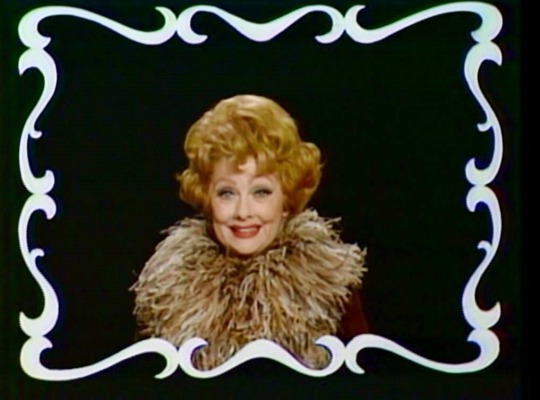
Lucille Ball (Herself, Various Characters) was born on August 6, 1911 in Jamestown, New York. She began her screen career in 1933 and was known in Hollywood as ‘Queen of the B’s’ due to her many appearances in ‘B’ movies. With Richard Denning, she starred in a radio program titled “My Favorite Husband” which eventually led to the creation of “I Love Lucy,” a television situation comedy in which she co-starred with her real-life husband, Latin bandleader Desi Arnaz. The program was phenomenally successful, allowing the couple to purchase what was once RKO Studios, re-naming it Desilu. When the show ended in 1960 (in an hour-long format known as “The Lucy-Desi Comedy Hour”) so did Lucy and Desi’s marriage. In 1962, hoping to keep Desilu financially solvent, Lucy returned to the sitcom format with “The Lucy Show,” which lasted six seasons. She followed that with a similar sitcom “Here’s Lucy” co-starring with her real-life children, Lucie and Desi Jr., as well as Gale Gordon, who had joined the cast of “The Lucy Show” during season two. Before her death in 1989, Lucy made one more attempt at a sitcom with “Life With Lucy,” also with Gordon, which was not a success and was canceled after just 13 episodes.

The Lockers was a male lock dance troupe first known as the Campbell Lockers formed by Toni Basil and Don Campbell in 1971. They were pioneers of street dance. They appeared on “The Tonight Show,” “Saturday Night Live,” and “What's Happening!!” This is their final TV appearance.
Andy Kaufman (Andy) was a performance artist and comedian. He is best known for playing Latka Gravas on the TV sitcom “Taxi.” Andy appeared in movies, on Broadway, did a one man show at Carnegie Hall, enjoyed a brief professional wrestling career, and performed in concerts nationwide. He died in 1984 of lung cancer.
Kaufman is not credited in the opening title sequence nor in the closing voice over credits. This was likely to lend veracity to his continual habit of ‘crashing’ the show and interrupting Van Dyke's guests.
L.A. Mime Company
John Wheeler (Mr. Haley, Network Executive) was in the New York stage productions of Wonderful Town (also on TV in 1958) and Sweet Charity (also the film 1969). He was seen opposite Lucille Ball as Judge Breghoff in the movie Mame. He appeared on one episode of “Here's Lucy” (S6;E16) in 1974. Coincidentally, he played Fred Mertz in the TV film “Lucy and Desi: Before the Laughter” in 1991.
Barry Van Dyke (Honey #2 / Helen's Paramour) was Dick Van Dyke's son born in July 1951, just two weeks after Lucie Arnaz. Like Lucie, he made his screen debut on his parent's TV show in 1962 and went on to larger roles in subsequent series'. Probably his most famous of those roles was as Steve Sloan in “Diagnosis Murder” (1993-2001).
It is a bit odd that Van Dyke's real son is playing (who is inferred to be) his male lover in the “Honey, I'm Home” sketch.
Judy Von Wormer had played one of the singers in “Lucy, The Co-Ed” (HL S3;E6) in 1970.
Brian Bruno and Barney, The Paul Family
Stu Nahan (Announcer)

“Van Dyke & Company” was a short-lived variety show that aired on NBC from September 20, 1976 to December 30, 1976. A pilot episode was shot in October 1975, but the series did not debut for another 11 months.
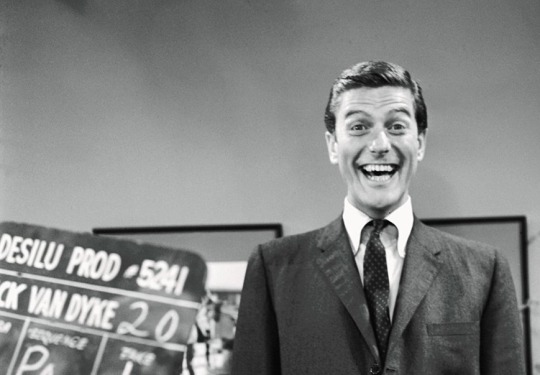
In a 1965 appearance on “Art Linkletter's House Party” Lucille Ball said that “The Dick Van Dyke Show” was her favorite television program. The series was shot at Desilu Studios. It took 11 years for Van Dyke and Ball to collaborate. This is the first time Ball and Van Dyke have acted opposite each other, although the two had appeared as guests on “Salute to Stan Laurel” in 1965.
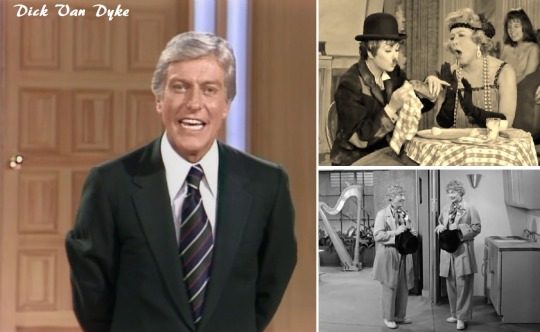
A week before her appearance on “Van Dyke & Company,” Dick Van Dyke appeared on “CBS Salutes Lucy: The First 25 Years” paying tribute to Lucy's skill at pantomime (something both were adept at and demonstrate here) from the set of his show. In 2001, Van Dyke co-hosted “I Love Lucy's 50th Anniversary Special.”
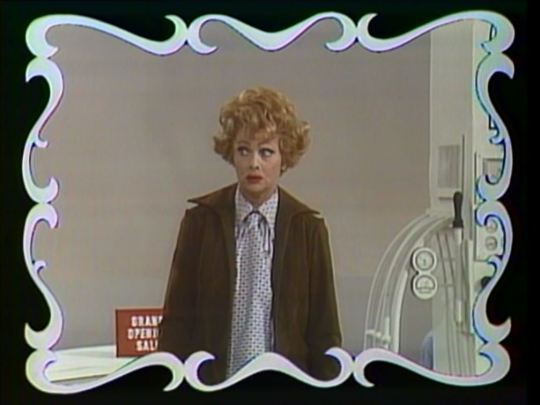
Genealogists claim that Lucy and Van Dyke are distant relatives. They are 10th cousins, once removed.
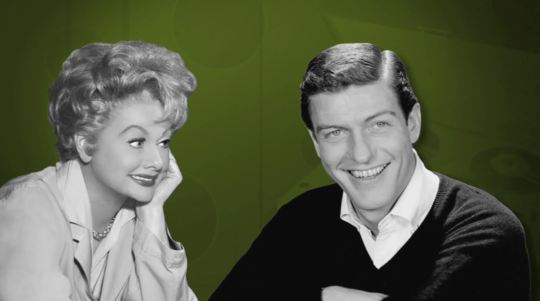
This episode of “Van Dyke & Company” was aired by MeTV on August 6, 2017 (Lucy's birthday). The entire series is available on DVD from MPI Video. Bonus features include audio from Van Dyke as a guest on “Let's Talk to Lucy,” Ball's 1964-65 radio show. For this episode, only Andy Kaufman's Elvis impersonation has been omitted, likely due to royalty restrictions.
On December 15, 1976, less than a week after this episode of “Van Dyke & Company” aired, Lucille Ball was on the dais for “The Dean Martin Celebrity Roast” of Danny Thomas.
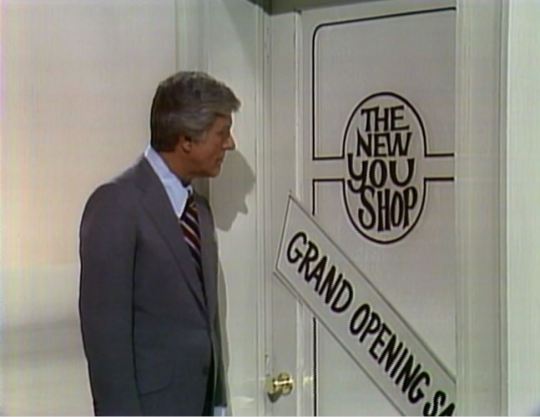
A cold open (pre-credits) has Dick paying a visit to the grand opening of “The New You Shop” staffed by Lucy, in a wordless physical comedy sketch. The premise has Lucy selling new 'body parts' (invisible and pantomimed with the help of sound effects) such as legs, chests, hands, faces, and feet.
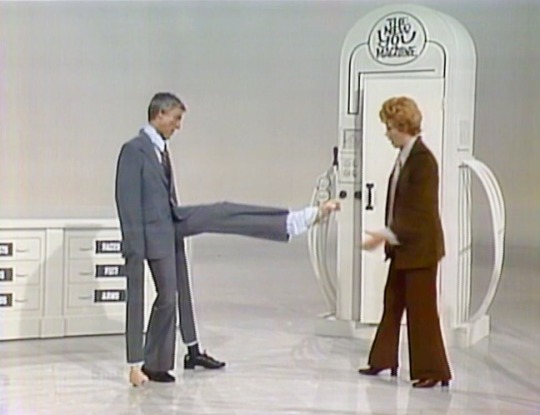
Trying on the parts inside 'The New You Machine', something goes horribly wrong. Dick emerges with arms that scrape the ground and a hand on the end of his foot!

In Dick's monologue he demonstrates the differences in the family hour format as opposed to later time slots using a fictional show called “Honey, I'm Home.” The Family Viewing Hour was a policy established by the Federal Communications Commission (FCC) in 1975. Under the policy, each television network had the responsibility to air "family-friendly" programming during the first hour of the prime time lineup (8 to 9 pm Eastern Time). “Van Dyke & Company” occupied the ‘Family Hour’ time slot.
“Honey, I'm Home” 8pm to 9pm ('Family Hour') – Dick comes home to find his wife waiting patiently on the sofa.
“Honey, I'm Home” 9pm to 10pm – Dick comes home to find his wife kissing another man.
“Honey, I'm Home” 10pm to 11pm – Dick comes home to find the same couple looking at a road map, but the 'honey' he's come home to is the man, not the woman!
He attempts to show the audience “Honey, I'm Home” after midnight, but quickly opens and shuts the door, horrified at what he's seen (and we don't).
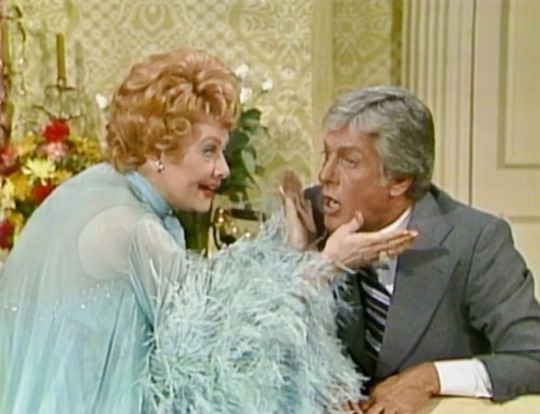
A network executive (John Wheeler) appoints Richard (Dick) to Vice President of Programming in order to get him to tell fading star Marion Lane (Lucy) that her show has been canceled. Lucy receives a big ovation from the studio audience, which indicates this may be the first segment shot, with the cold open pre-taped without a studio audience.
Marion seems to know what he's come for and quickly takes a liberal amount of tablets.
Richard: “Marion, what's that you're taking?”
Marion: “Sleeping pills.”
Richard: “Wouldn't you call that a kind of a heavy dose?”
Marion: “I'd call it an overdose.”
Turns out they were just breath mints. Still fearing the worst, Marion momentarily straddles an open window. When he finally delivers the bad news, she slaps him hard across the face, sending him careening over the divan. The sketch has a surprise twist ending with Richard being Marion's husband!
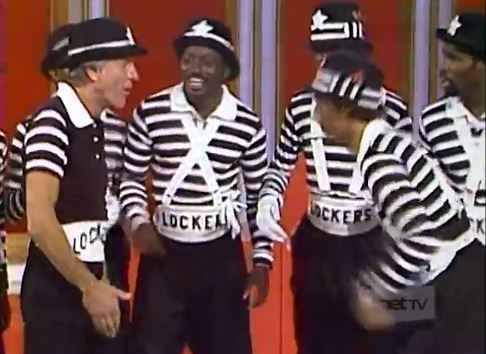
Dick is discovered chiseling a sculpture and telling the audience that he's always wanted Rudolf Nureyev as a guest. He finally got a call from the dancer to tell him that he will be appearing – on “The Gong Show.” “The Gong Show” was a low-budget amateur talent show that had only premiered on TV a few months earlier. This set-up is by way of introducing what Dick calls “the most fabulous dancers around” - The Lockers. After they perform their main act, Dick joins in, even wearing one of their costumes.
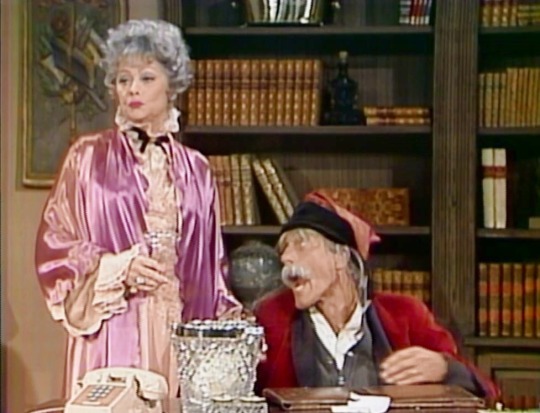
Dick and Lucy play Helen and Edgar, a couple celebrating their 40th anniversary. Edgar is 115 years old, and Helen is 75. She only married him thinking she would soon be a rich widow. Van Dyke's characterization of Edgar is reminiscent of when he played the elderly banker Mr. Dawes Sr. in Mary Poppins (1964). Helen tries everything she can think of to hasten her inheritance.
She cracks a champagne bottle on his head. Nothing.
She tries to guillotine him while blowing out the candles on their anniversary cake. It misses.
She gives him a big anniversary kiss with an electrified wire. He is energized by it.
She offers him some fresh air out on the balcony (which they don't have) and pushes his wheelchair headlong out the terrace doors. Helen thinks she's finally succeeded in offing him, but he comes rolling through the opposite door a few moments later, his wheelchair now a mash-up of a trash can and mobility device.
Helen finally slips Edgar a mickey that does the trick – but first he calls up the newspaper to place his own obituary. The sketch has a twist ending with the entrance of Helen's paramour (Barry Van Dyke), who may be trying to do the same thing to her!

Dick and Lucy are having some banter as themselves when Andy Kaufman arrives with his tape player wanting to be on the show. Although Dick says that Andy should just go away, Lucy says that she's seen Andy on the show before, and that he always interrupts guests, and they've all been very good sports about it. Lucy says that she just doesn't happen to be one and swiftly exits. Dick says Andy has previously insulted Carl Reiner (S1;E4), Hal Linden (S1;E5), John Denver (S1;E3), and now Lucy. Dick exits to find a security guard.
Alone with the audience, Kaufman starts with an imitation of “Sanford and Son” saying (in his inimitable way, with clipped diction and seemingly incapable of imitating Redd Fox)
“Elizabeth. I am coming to join you.”
He then tackles 'the Fonzie' from “Happy Days”:
“Eh. Eh. Sit on it you stupid nerd.”
Again without a trace of intonation or nuance. Finally he does a sped up Elvis Presley imitation. [This song has been omitted from the DVD release, probably due to song royalty fees. It is apparent that it has been edited out because the sketch on video quickly fades out and Kaufman had not yet used the tape recorder he brought onstage at the start.]

In another silent pantomimed sketch (the second of the show), Lucy and Dick play tourists taking photographs in a Tropical Forest.

To get the perfect photo, Lucy and Dick virtually destroy the forest, breaking off twigs, pulling up flowers, and cutting down trees. Luckily, their picnic hamper comes equipped with a hacksaw and dynamite!

In a final act of desecration, Lucy bulldozes the entire area clear, turning the lush setting...
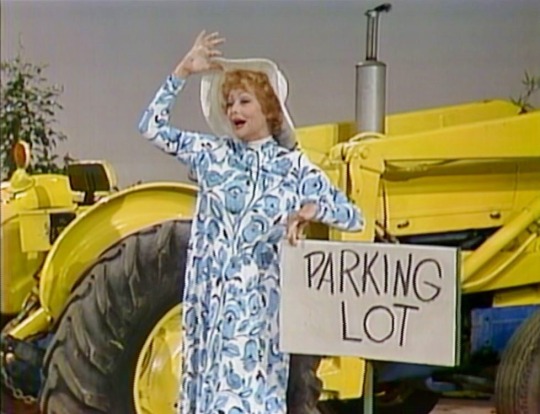
...into a parking lot!
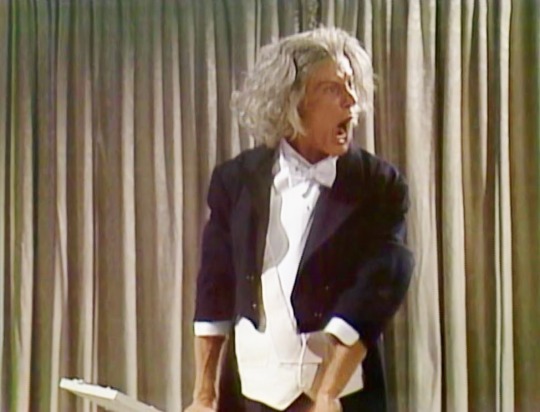
Dick plays a long-haired Maestro (in sneakers) but instead of an orchestra, he conducts dancers. When the dancers go from classical to modern, the Maestro nearly gives up trying to control them, but when the music turns to a Broadway sound, even he joins in.
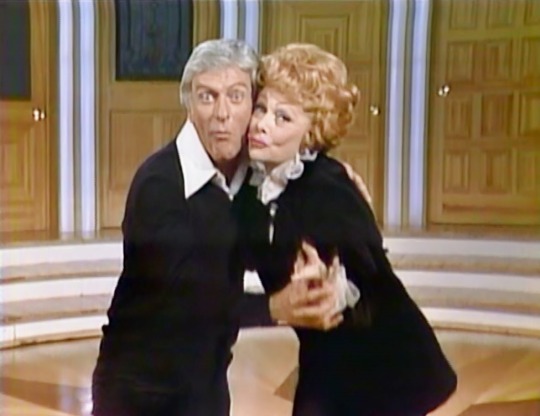
In the closing, Dick sings “You Make It So Easy” to Lucy. The two do some simple, yet funny, dance steps as well.
This Date in Lucy History – December 9

"Lucy and the Military Academy" (TLS S2;E10) – December 9, 1963

"Guess Who Owes Lucy $23.50" (HL S1;E11) – December 9, 1968

“An All-Star Party for Lucille Ball” - December 9, 1984
#Van Dyke & Company#Dick Van Dyke#Lucille Ball#Variety Show#NBC#1976#The Lockers#John Moffitt#Andy Kaufman#Barry Van Dyke#John Wheeler#L.A. Mime Company#Judy Von Wormer#Stu Nahan#TV
9 notes
·
View notes
Text
'Nation in mourning': Tributes flow for Bob Hawke
Former prime minister Bob Hawke has died at the age of 89.
The Labor legend died in his Sydney home on Thursday evening, just two days before the May 18 federal election.
All government flags will fly at half-mast on Friday in honour of Mr Hawke, who was arguably one of the most popular prime ministers in Australian history.
He is survived by his wife Blanche dAlpuget, and children Susan, Stephen and Rosslyn.
Labor leader Bill Shorten tonight paid tribute to Mr Hawke, making a short statement to reporters in Sydney.
Tonight the nation and Labor are in mourning. We have lost a favourite son, he said.
Bob Hawke loved Australia and Australia loved Bob Hawke. But his legacy will endure forever.
Bob Hawke changed Australia for the better. He brought people together, he modernised our economy, he transformed our society, he protected our environment.
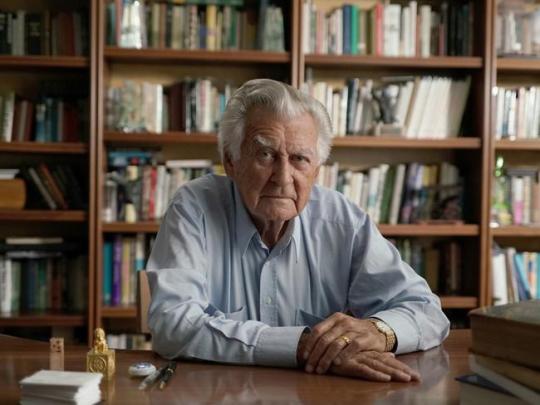
media_cameraBob Hawke arguably one of the most popular prime minister in Australias history.
Speaking at a rainy Brisbane airport on Thursday night, Scott Morrison said what most Australians will remember about Mr Hawke was the bloke.
It was his ability to connect with everyday Australians with a word, with that larrikin wit, with that connection and an understanding of everyday Australian life that we will most remember Bob Hawke, he said.
One thing I remember amongst many - it was Bob Hawke who changed our national anthem to say Australians all let us rejoice and tonight ... I think we can all say as Australians all, that we rejoice in the life of Bob Hawke.
We thank him for his service to our nation and we pray now that he Rest In Peace.
Kevin Rudd tweet
Former prime minister Kevid Rudd also released a statement calling Bob Hawke an Australian insitution.
How Hawke shook the nation awake
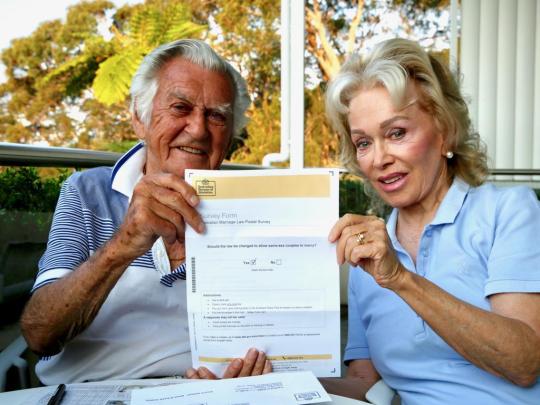
media_cameraBob Hawke and his wife Blanche dAlpuget, who described him as the greatest Australian of the post-war era.
BLANCHE DALPUGETS MOVING STATEMENT
Earlier on Thursday, Blanche dAlpuget confirmed her beloved husbands death in a moving statement.
Today we lost Bob Hawke, a great Australian many would say the greatest Australian of the post-war era.
He died peacefully at home at the age of 89 years.
I and Bobs children, Sue, Stephen, Rosslyn and stepson, Louis, and his grandchildren, will hold a private funeral.
A memorial service will be held in Sydney in coming weeks.
Bob Hawke and Paul Keating and their governments modernised the Australian economy, paving the way for an unprecedented period of recession-free economic growth and job creation.
Bobs consensus-style approach of bringing together the trade union movement and the business community boosted job opportunities while increasing the social wage through Medicare and extra financial support for low-income families.
Together with his highly talented Cabinets, he foresaw the Asian Century and positioned Australia to take full advantage of it through a program of sweeping economic reforms.
Among his proudest achievements were large increases in the proportion of children finishing high school, his role in ending apartheid in South Africa, and his successful international campaign to protect Antarctica from mining.
He abhorred racism and bigotry. His father, the Reverend Clem Hawke, told Bob that if you believed in the Fatherhood of God then you must also believe in the Brotherhood of Man. Bob would add today the Sisterhood of Women.
Bob was dearly loved by his family, and so many friends and colleagues. We will miss him.
The golden bowl is broken.
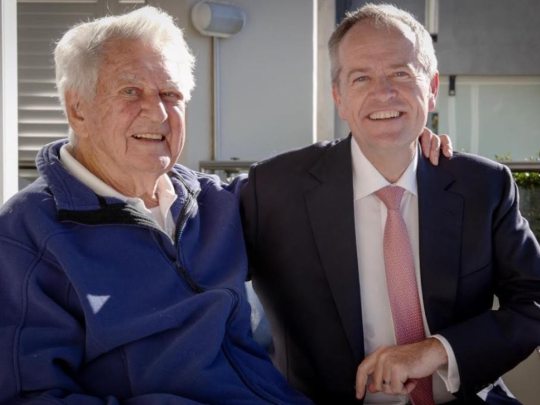
media_cameraBob Hawke with Bill Shorten in a photo released by the Opposition Leader earlier this week.
AFTER HAWKE, WE WERE A DIFFERENT COUNTRY
In a statement issued after the announcement of Mr Hawkes death, Bill Shorten said Mr Hawke was a leader of conviction and a builder of consensus.
In Australian history, in Australian politics, there will always be B.H. and A.H: Before Hawke and After Hawke. After Hawke, we were a different country. A kinder, better, bigger and bolder country, Mr Shorten said.
The Australian people loved Bob Hawke because they knew Bob loved them, this was true to the very end.
At our Labor launch I told Bob we loved him, I promised we would win for him. I said the same to him the next day at his home, when I visited.
The Sydney sun was out, that famous silver mane, now snow-white. Cigar in hand, strawberry milkshake on the table, the hefty bulk of his dictionary holding down the days cryptic crossword.
I gave the man who inspired me to go into politics a gentle hug, I tried to tell him what he meant to me, what he meant to all of us. I couldnt quite find the right words, few of us can, when were face-to-face with our heroes.
Blanche is in our hearts today, so too are Bobs children, Sue, Stephen, Rosslyn, his stepson Louis and his grandchildren.
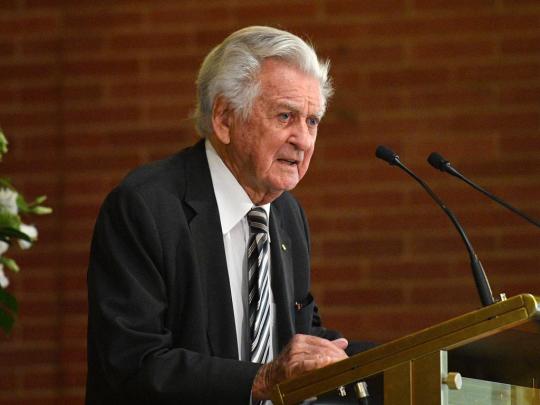
media_cameraFormer prime minister Bob Hawke speaks at the memorial service for former Labor minister Barry Cohen at Old Parliament House in February 2018.
GILLARD, TURNBULL, REMEMBER HAWKE
Former prime ministers Malcolm Turnbull and Julia Gillard also offered their condolences.
Farewell Bob Hawke a great Australian, Labor leader and reforming Prime Minister, Mr Turnbull tweeted.
Australia is a better place because of him. Lucy and I send our love and condolences to Blanche and all of his family.
Former PM Julia Gillard has remembered Bob Hawke as the greatest peacetime leader Australia has ever had.
As a teenager Bob inspired me, as a PM he guided me.
I will miss him. I wish so very much that Bob had been able to see one more election day. My condolences to Blanche, his children and grandchildren.
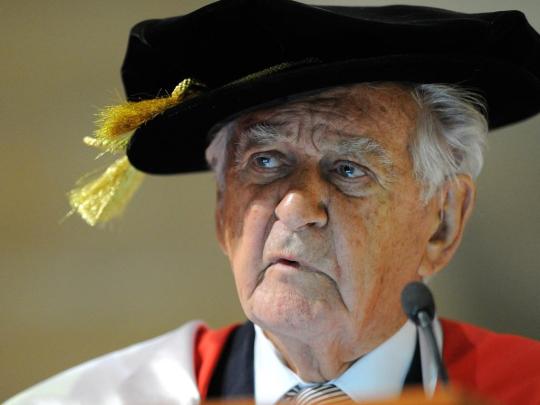
media_cameraBob Hawke speaks to graduates after receiving an honorary degree from the University of Sydney in December 2016.
KEATING ON GREAT PARTNERSHIP
Paul Keating, Mr Hawkes longtime adversary, paid tribute and reflected on their great partnership.
It was, the former PM said, a partnership we forged with the Australian people.
But what remains and what will endure from that partnership are the monumental foundations of modern Australia.
In what was our last collaboration, Bob and I were delighted to support Bill Shorten last week in recounting the rationale we employed in opening Australia to the world.
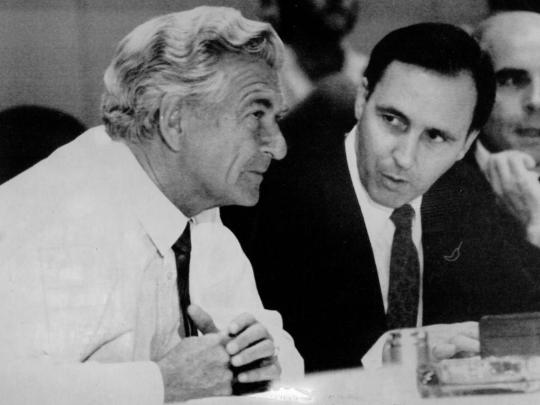
media_cameraBob Hawke with then Treasuer Paul Keating in 1989. Picture: Alan Porritt
Bob, of course, was hoping for a Labor victory this weekend. His friends too, were hoping he would see this.
Bob possessed a moral framework for his important public life, both representing the workers of Australia and more broadly, the country at large.
He understood that imagination was central to policy-making and never lacked the courage to do what had to be done to turn that imagination into reality.
And that reality was the reformation of Australias economy and society and its place in the world.
Mr Keating paid tribute to Mr Hawkes wife and his family.
The country is much the poorer for Bob Hawkes passing, he said.
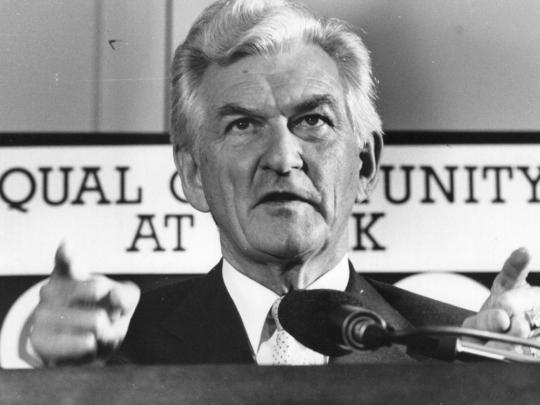
media_cameraBob possessed a moral framework for his important public life, says Paul Keating.
Mr Hawkes former press secretary and ABC Insiders host Barrie Cassidy told the ABC the best way to describe him was as an intellectual knockabout.
It covers all bases. He was the sort of person who was just as at ease with world leaders as the punters at the race track, he said.
It was the same to him. People had the sense they could approach him at any time and have a chat with him.
THE PM WHO CHANGED THE NATION
Mr Hawke was Australias 23rd prime minister, leading the nation from 1983-1991. In turn, he delivered the Labor Party four consecutive electoral victories.
His legacy includes the creation of Medicare, the formation of APEC, and the initiation of national superannuation.
Known for his larrikin streak, he infamously held the world record for skolling beer, and in later years even had a brand of lager named after him.
In the months before his death, Hawke was using a wheelchair after suffering a series of health scares.
In December 2018, he spoke to The Courier-Mail at Queenslands Woodford Folk Festival, which he attended every year.
Mr Hawke usually spoke at the festival but had opted out.
Ive sung my last song, or last verse of Waltzing Matilda, he said.
Thats been done.
Asked about his plans for 2019, Mr Hawke said hed had his time.
No, Im just to see ... Ive had my time, just stick around for a little while.
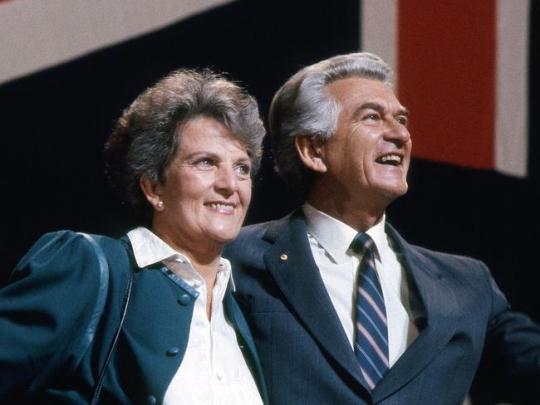
media_cameraBob Hawke, with then wife Hazel, on the night of his 1983 election victory.
He had taken to relying on a wheelchair, and has suffered several health troubles this year. In May 2018 he was rushed to Royal North Shore Hospital in Sydney with the wobbles after hitting his head in a fall.
During his hospital stay, it was reported that he was eager to get home to his cigars and crosswords.
He battled pneumonia in 2011, and beat another serious illness in 2015 that left him so close to death.
Mr Hawkes first wife Hazel died in 2013 after a long battle with Alzheimers disease, while the couples fourth child Robert junior died in infancy in 1963.
LEGEND IN THE MAKING
Bob Hawke was born in South Australia on December 9, 1929, but moved to Western Australia as a child.
Hawke always had big political ambitions. It's believed he said, at just 15, that he would one day lead the nation.
He joined the Labor Party in 1947 and led the University of Western Australias Student Representative Council, where he studies a double degree in law and arts. He graduated in 1953.
He went on to Oxford University as a Rhodes Scholar.
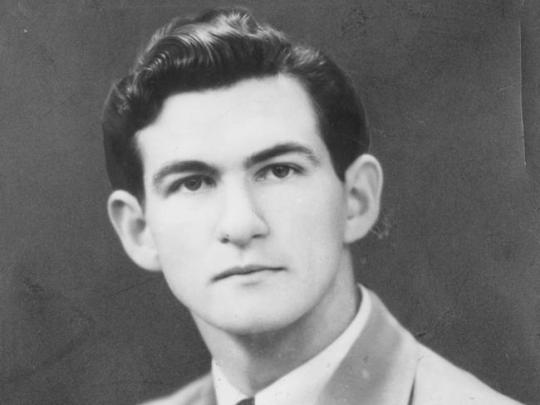
media_cameraA Rhodes Scholar, Bob Hawke always had big political ambitions.
During his time there, he befriended many overseas students, which led him to found the International Club.
He described himself as a pretty haphazard student during the first two terms of his course, and was lucky he had the smarts to do little work.
But during that same year he suffered a serious motorbike accident and almost lost his life. It was a turning point for Hawke, who said it prompted him to live life to its fullest.
He never liked the idea of being a lawyer, and did not complete the Bachelor of Arts in Philosophy, Politics and Economics he initially undertook under the Rhodes scholarship at Oxford. Instead, he penned a thesis on the history of wage-fixing in Australia, graduating with a Bachelor of Letters in 1955.
But they werent his only impressive accolades; the former PM was recognised by the Guinness Book of World Records for skolling 2.5 pints (1.12 litres) in 11 seconds.
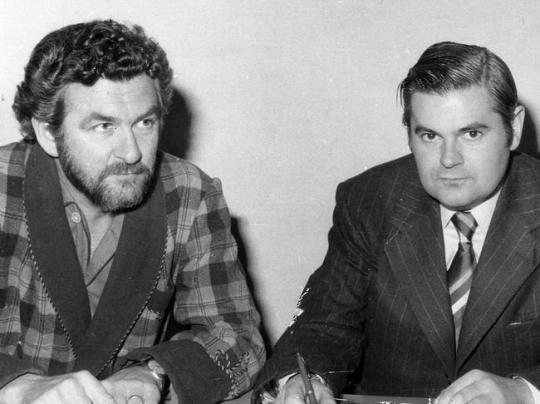
media_cameraThen ACTU President Bob Hawke and Ian Sykes of XL Petroleum trying to avert oil strike chaos in 1972.
RISE TO POWER
Hawke first attempted to enter federal Parliament by contesting the seat of Corio, Victoria, held by Liberal MP Hubert Oppermann, in 1963. Mr Oppermann had represented the division since 1949. Hawke was unsuccessful.
After his failed bid, he was elected president of the Australian Council of Trade Unions in 1969, and ALP president in 1973.
The ACTU recognises Hawke as leading the organisation through a period of significant social change, including amping up the organisations influence in areas including education, health and housing.
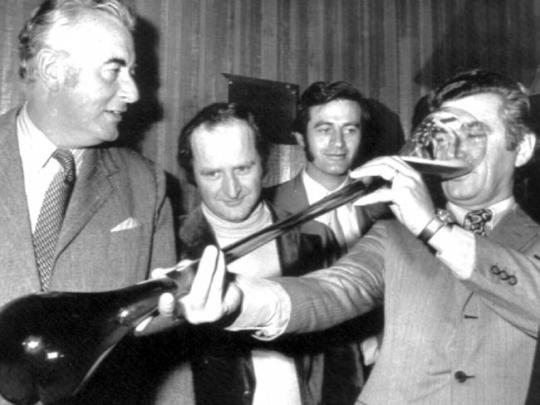
media_cameraBob Hawke in his ACTU days with then PM Gough Whitlam.
He ran for parliament again at the 1980 Federal Election, when Labor leader Bill Hayden took on incumbent Liberal leader Malcolm Fraser. While the ALP wasnt swept into power, Hawke snapped up the Victorian seat of Wills by a hefty margin, and was then appointed Shadow Minister for Industrial Relations.
Just two years later he was narrowly defeated in a leadership ballot called by ALP leader Bill Hayden. But he was given another shot at the leadership early in 1983 and was elected unopposed.
He led Labor to victory at the 1983 election in a landslide with the slogan Bringing Australia Together. Against a backdrop of high inflation and unemployment, his victory ended seven years of Liberal Party rule.
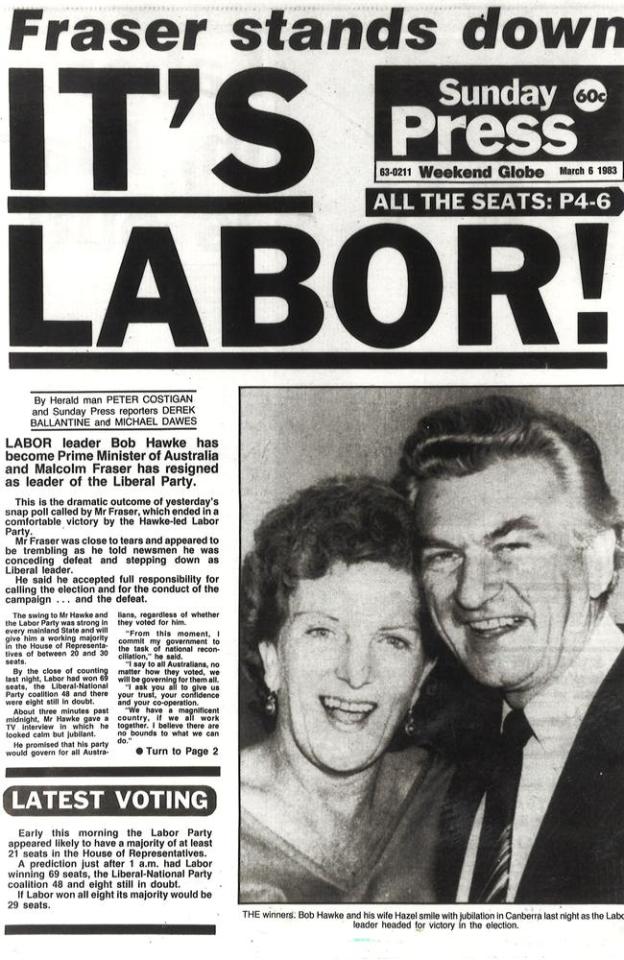
media_cameraHawkes victory in 1983.
TIME AS LEADER
Hawke led the ALP to four consecutive victories during his time as leader from 1983 to 1991.
He governed amid challenges posed by globalisation and industrial relations, and his government worked to improve economic and employment growth
Arguably, Hawkes signature policy was the introduction of Medicare in 1984, Australias universal healthcare system. He introduced it after the Medibank scheme introduced by Gough Whitlam was partially dismantled during the Fraser Government.
He was also known for modernising and integrating Australias economy into the global economy. Hawke deregulated the financial system and floated the dollar and reduced tariffs that Labor had traditionally relied on to protect industry and jobs. Low-income families were given greater financial assistance, and sex discrimination in the workplace was outlawed. Hawke also introduced the Higher Education Contribution Scheme (HECS).
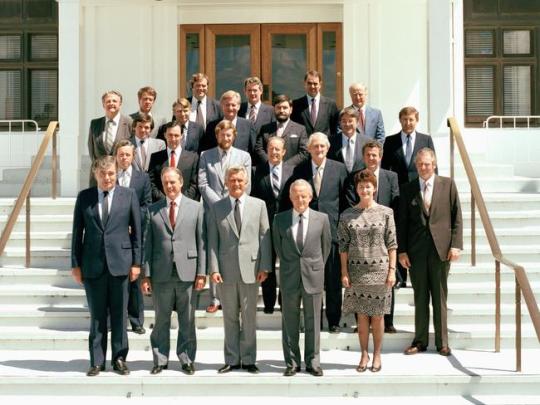
media_cameraMembers of the Hawke ministry in 1984 on the steps of Parliament House, Canberra. Picture: National Archives of Australia
Bob was an absolutely brilliant prime minister. He touched every leadership base you can think of. He had a very strong sense of policy direction, he was an excellent communicator to the public, the world at large, he was charismatic to go with it and he was a terrific manager of people, Former Hawke cabinet minister Gareth Evans said, according to the ABC.
But he was not without his critics.
Some believed hed hijacked the party and moved it to the right through his strengthening of private enterprise. His close relationships with leading businessmen also drew ire.
As a recession took hold in the late 1980s, there were doubts Hawke would win the 1990 election, which he ultimately pulled off on a tight margin. But eventually, he lost the support of the Labor Right, who threw their support behind treasurer Paul Keating in a 1991 leadership spill. Keating would go on to lead the party until 1996.
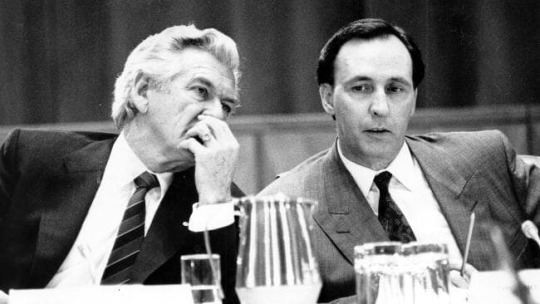
Bob Hawke says he feels genuinely sorry for Paul Keating after recently released cabinet papers shed new light on their troubled relationship.

I did my best to support Keating: Hawke
Bob Hawke elevated Paul Keating to treasurer upon winning government in 1983. Their partnership was credited as helping the ALP achieve continued electoral success by moving the party toward the centre, and winning the support of Liberal-National voters.
But things began to take a sour turn in 1998. A secret meeting dubbed the Kirribilli Agreement took place as opinion polls began to wane, and Hawke agreed to hand over power to Keating if he won the 1990 election.
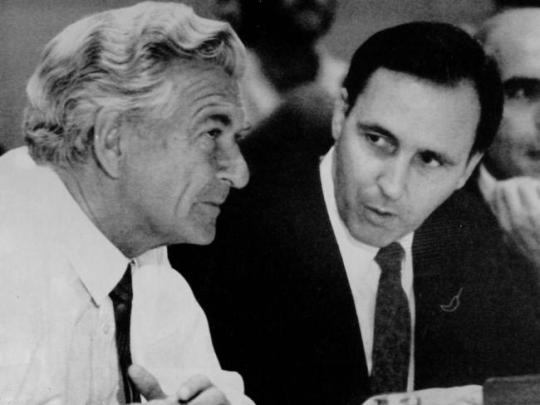
media_cameraIn later years, Bob Hawke spoke of his famous rivalry with Paul Keating, saying he wanted the public to look at the positives. Picture: Alan Porritt
But he didnt, prompting two Keating-initiated leadership spills in 1991, the second of which Hawke would lose. He would go on to sit on the backbench for a brief period, before retiring in 1992.
The two traded barbs as the years went on, but Hawke said in 2014 he wanted the Australian public to remember them for what they achieved.
I would like history to talk about Paul and myself in terms of the great things we were able to do together. His ambition to become leader was perfectly justified and in the end he had his opportunity and he did some good things. So I hope history will look at the positives and not the occasional tiffs, Hawke told the ABC.
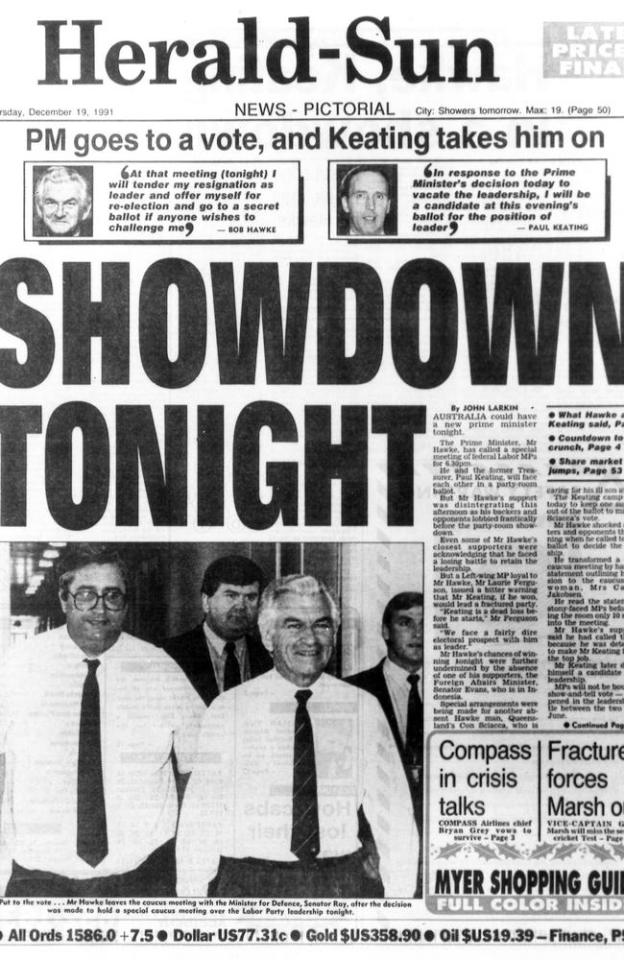
media_cameraDecember 19, 1991: Keating makes his move.
After quitting politics, Hawke took TV journalism in his stride, interviewing international political figures for Channel 9. He also penned The Hawke Memoirs, and became a successful businessman working as a consultant and dealing in the property market.
He continued to remain involved in the Labor Party, supporting Kevin Rudd during the 2007 election and campaigning against John Howards WorkChoices. Similarly, he made appearances during the ALPs 2010 and 2013 election campaigns, too.
During his time in office, Hawke was married to Hazel, and the breakup of their marriage in 1994 caused public dismay and family upheaval.
After his divorce in 1995 Mr Hawke married his biographer, Blanche dAlpuget.
Hawke began an affair with dAlpuget in 1976, but its believed he stayed with Hazel to preserve his prime ministerial aspirations.
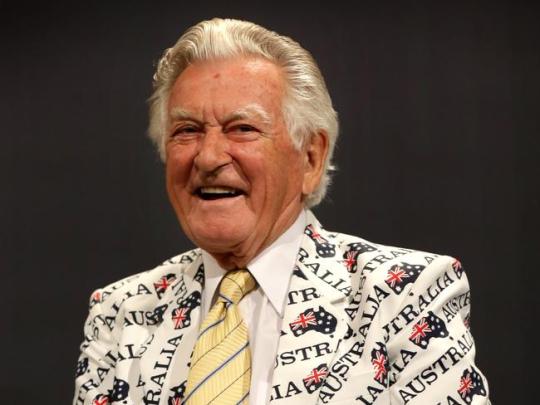
media_cameraBob Hawke during a luncheon to commemorate the 30th Anniversary of Australia II's America's Cup victory in 1983. Hawke wore the same jacket he wore on the day of the win. Picture: Gregg Porteous
Hawke reportedly said his post-political life had been extraordinarily interesting and fulfilling. He was a keen punter, remained sport-obsessed, and even at 88-years-old was caught skolling a beer at the SCG.
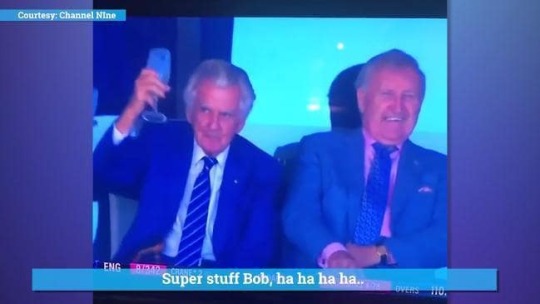
Bob Hawke hasn't disappointed again, skolling a beer at the SCG during the 5th Ashes Test. Courtesy: Channel Nine

Bob Hawke skolls beer at the SCG
TIMELINE
1929: Robert James Lee Hawke, the son of Arthur Hawke and Edith Lee, is born in Bordertown, South Australia
1947: Hawke joins the Australian Labor Party
1953: Graduates from the University of Western Australia with a Bachelor of Letters and Bachelor of Arts (Economics)
1954: Hawke is recognised by the Guinness Book of Records for skolling 2.5 pints (1.12 litres) of beer in 11 seconds
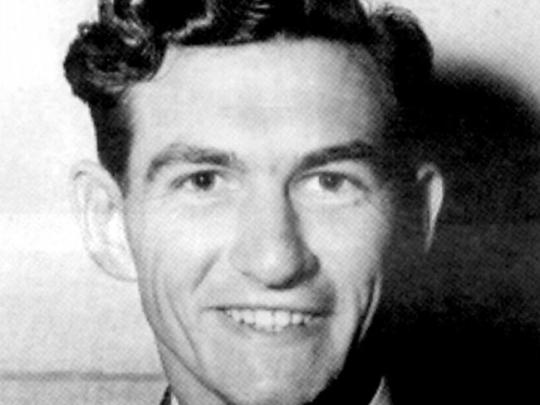
media_cameraBob Hawke in Perth, 1952.
1955: Graduates from Oxford University as a Rhodes Scholar with a Bachelor of Letters
1956: Returns to Australia to take up a research scholarship at the Australian National University
1956: Marries Hazel Masterson
1956: The couple welcome their first child, Susan
1958: Becomes a research officer and advocate with the Australian Council of Trade Unions
1963: Fails to win the seat of Corio (Victoria) in his first attempt to enter federal Parliament from Liberal MP Hubert Oppermann
1969: Becomes ACTU president
1971: Elected to the federal executive of the ALP
1973: Elected president of the ALP
1979: Honoured with the Companion of the Order of Australia
1980: Resigns from the ACTU and announces his intention to enter federal Parliament
1980: Wins the seat of Wills (Victoria) and is appointed Shadow Minister for Industrial Relations, Employment and Youth Affairs
1982: Challenges ALP leader Bill Hayden, but loses the caucus ballot
1983: Elected as leader of the ALP
1983: Leads the ALP to their greatest election win in 40 years after just one month as opposition leader
1983: The Australian dollar is floated after being pegged to the US dollar
1984: Hawke introduces universal health care, commonly known as Medicare
1984: He announces Advance Australia Fair as the national anthem
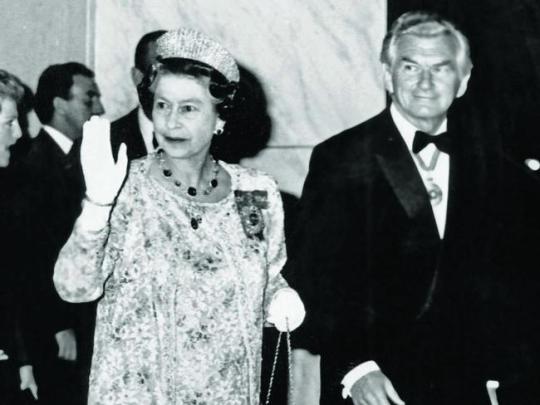
media_cameraQueen Elizabeth and Bob Hawke in 1988. Picture: Supplied
1984: Promotes Charles Perkins, the first indigenous person to head a Commonwealth Department, as Secretary of the Department of Aboriginal Affairs
1989: The Higher Education Contribution Scheme (HECS) is introduced, ending 15 years of free tertiary education
1989: Hawke forms the Asia-Pacific Economic Cooperation (APEC)
1990: The Aboriginal and Torres Strait Islander Commission is established
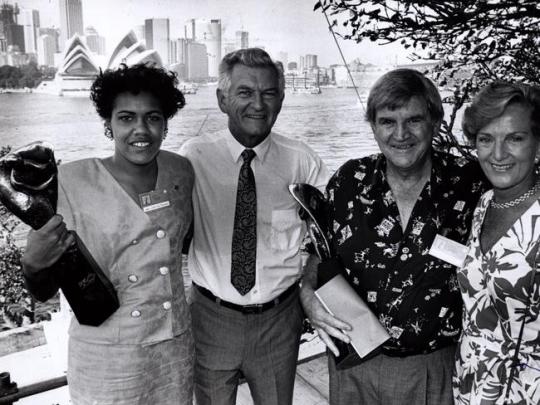
media_cameraPrime Minister Bob Hawke and then wife Hazel with 1990 Young Australian of the Year Cathy Freeman and Australian of the Year, eye surgeon pioneer Professor Fred Hollows after presentation ceremony at Kirribilli House in Sydney on Australia Day, 1990.
1991: Universal compulsory superannuation introduced in the Hawke Governments final budget
1991: Hawke loses leadership to Paul Keating
1992: Resigns from parliament
1995: Bob and Hazel divorce
1995: Marries Blanche dAlpuget
2008: Attends Kevin Rudds apology to the Stolen Generations
2009: Helps establish the Centre for Muslin and Non-Muslim Understanding
2016: Awarded honorary doctorate from The University of Sydney
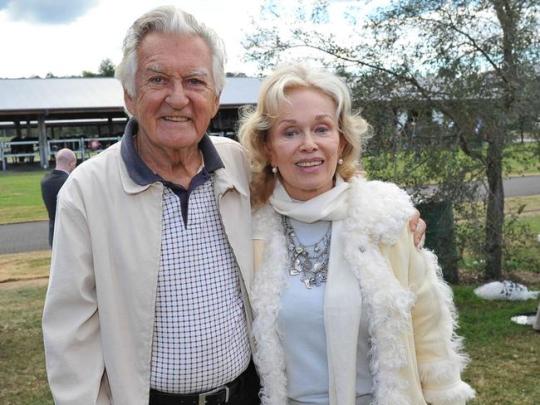
media_cameraBob Hawke with his wife Blanche dAlpuget.Originally published as Nation in mourning: Tributes flow for Bob Hawke
https://www.adelaidenow.com.au/news/national/tributes-flow-for-former-prime-minister-bob-hawke/news-story/ffe484e93e7fff00594a545abbb1b2d9?from=htc_rss
0 notes
Text
The Local Government Godzilla: Should The CCC Be Taking A Closer Look At The Money-Grubbing Activities Of The LGAQ?
But even if the CCC isnt bothered, you should be. The Magpie has a beak around to warn of actual or threatened raids on the ratepayers piggy banks with money-spinning schemes that really benefit no one but the LGAQ itself.
Also, a look back down memory lane at solicitor Barry Taylors efforts to bring to Townsville a business urger who is now awaiting sentence next month for corruption connected to the Ipswich Council. And not unrelated, in a moment of clarity, The Magpie realises that this sorry episode was the catalyst for Taylors pathological hatred of the old bird, which continues to this day with a spiteful legal vendetta. The Pie will explain how it all fits.
Some sobering statistics about the real Real Estate situation in Townsville, with some graphs the Bulletin is too coy to share with you.
And for those who enjoy our now regular Trump gallery, A BONUS a few select pictorial comments on Britains Brexit fiasco.
But first
Even Buffoons Can Occasionally Be Funny (as The Magpie Knows)
Theres been a lot of huffing, puffing and posturing about Clive Colonel Blimp Palmer during the week. First there was the hissy fit by some over Palmers text message saying if he gets back onto the parliamentary plush, he will move to ban such political texting as this.
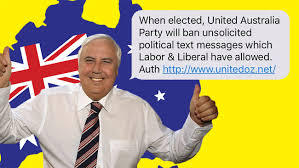
The Magpie got one, and the old birds instant reaction? Roaring laughter. Lets give Ol Lardarse a couple of brownie points the text is one of the funniest, and surely intentional, jokes of the current election campaign. Unsurprisingly, there was instant babble about hypocrisy which came thick and fast from the pompous chatterati navel gazers, but the Pie will take his laughs where he can get them, and salutes whoever thought up this one for Palmers doomed campaign (possibly someone called S. Sokolova, who authorised the text for the UAP).
In fact, doomed causes seem to be a recurring theme this week for Clive, who announced he was giving a dinner dance for a select few Towns-villains to celebrate Titanic ll the return of the legend. Sad when someone has to promise free food and booze to get them to just turn up. And the general feeling is whatever sort of guest selection process that was bubbling around behind the Palmer brow, if you didnt get an invite, then you were not considered of merit or value to Clive.
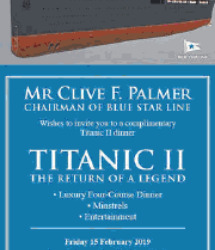
But when it became known amongst our movers and shakers who was in and who was out, it was a matter of do we laugh or cry was it a hot ticket, or a hot potato ticket, to be dropped immediately? Being favoured by Palmer is something many would like to be quiet about, but then, neither is being left out of a fabulous free food fight, ones ego can be buffeted by such neglect. Many would have loved an invite if for no other reason it have the unlikely option to RSVP sod off.
But Bentley for one believes it will a unique experience, with special attire for dancers.

The highlight of the night for Clive will be when the adoring and grateful throng gather around him to sing what he will think is a fitting tribute to him, a rousing rendition of the Titanic hymn, Nearer My God To Thee.
What Starts Out As A Good Idea Doesnt Always End Up That Way.

The Local Government Association of Queensland has been around since 1896, and for the most part, has been a valuable and necessary lobby group for all Queensland councils.
Councils pay an annual fee to belong to the LGAQ (Townsville pays around $250K annually), membership is voluntary but all 77 Queensland councils are members. In total, they pay $35million annually in membership fees. The smaller outfits get value from matters such as insurance deals and other areas where the Associations clout can be brought to bear.
But about 10 years ago, under the leadership of former Townsville council executive and now the Association CEO Greg Hallam, it was decided that there were more lucrative fields in which the Associations leverage with such a captive (albeit voluntary) membership could be used to build a significant commercial operation. Put simply, the organisation decided to become commercial entrepreneurs.
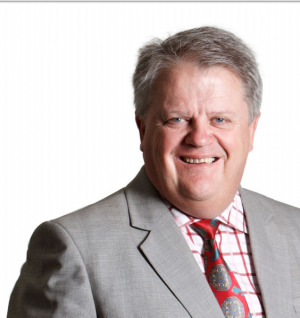
LGAQ CEO Greg Hallam
And boy, did they ever. Figures for 2016 show there was a massive bump in revenues, jumping from $46m to $73m, a goodly chunk of this coming from their commercial procurement arm Local Buy (that includes the $35m membership revenue). In simple terms, Local Buy has screened and listed (for a fee) various businesses from across the state, all of whom can then by-pass the tender process and submit direct quotes for contracts to any of the 77 council members. On the face of it, this saves councils money in avoiding the costly procurement work of tendering and so on. But it also sounds like an invitation to corruption on a grand scale. The Pie has no evidence of or suggesting there is, such activity, but looking at the process, there doesnt seem to be a foolproof safeguard against some expensive jiggery-pokery if someone wanted a new spinnaker for the yacht.
But does it save councils money?
Local Buy is anything but since it opens up work to the whole of Queensland, often bypassing truly local businesses in the highly selective process which requires a fee for ticking the right boxes (literally, apparently). Local Buy takes a cut of the contract amount of the winning quote usually 10% but The Pie is told sometimes more. Of course, since this is all above board and known, what do the quoters do? They of course factor the 10% in and add it on to their quote, in many cases wiping out any significant savings for the council involved, as well in some instances, as denying many a rate paying, money-spending locals a job . This has caused a great deal of angst here in Townsville, whose mayor is a $32K plus a year LGAQ director, and whose sidekick (now on what seems permanent leave), Stephen The Screaming Midget Beckett, is reported to have had loud abusive outbursts with local business people who have complained about the situation.
And to what end is all this? Theres a great deal of money flowing into the coffers of the Association, and they arent shy of shouting themselves lavish overseas jollies disguised as work studies. Why does a lobby group want to be so entreprenurial? Do they want to reduce council membership to zero on the user pays basis (yeah, right), or some witty cynic might suggest, as a lobby group, for a bribery pool? (Just a joke, Mr Hallam, put down the phone.)
But there is a more troubling aspect to this arrangement, apart from freezing out local contractors and permanent local workers rather than special workforce brought in for a set amount of time before disappearing back wherever they came from.

If you care about strong local voice in Townsvilles affairs, it would well to be wary of a crowd called Propel Partnerships, who appear to be getting into bed with the LGAQ. Propels buzz-word blurbs try to disguise their activities by describing themselves as a shared services company and pepper their media releases with such euphemisms as fully integrated customer services; Propel Partnerships is simply a profit-driven, out-sourcing business. Current (or possibly former by now) chairman Jim Soorley, that old Labor stager from way back in Brissy, had his mate Carl Wulff, the then CEO of Liverpool Council in Sydney (now awaiting sentence in chokey for bribery in the Ipswich scandal) enter into an agreement that has ended up with the NSW Crime and Corruption Commission.
This sort of thing can cost local jobs and introduce a totally remote, sometimes hostile letter-of-the-law approach to dealings with staff and with the local community in such areas as rates, payroll services (shades of Qld Health yikes!) and licensing. And not a chance of a face-to-face session of negotiation.
This is an extension of the popular Big Brother move in business, a model that even further removes the public from reasonable (and reasonably expected) interaction with their council.
To understand what happens in both these centralisation scenario, one need look further than the dear old Townsville Bulletin, which has been so savagely ravished by Ruperts money-hungry minions and sloppy reporting staff directed from Holt Street in Sydney, a paper which hilariously subbed in NZ, Mumbai, the Phillipines or Brisbane. Of course, one attraction for councils in this model is that it does away with the necessity of either engagement or accountability with the people who elected them or provided their jobs.
This is the rapidly emerging tip of a massive iceberg, with Greg Hallam and his board deciding rather than try and fight off a competitor in an money-sinkhole business battle, instead join forces and share a cut of a captive pie. This is obvious when Hallam gave this ringing endorsement :
The work of Propel Partnerships ensured that councils were ableto realise efficiencies in their operations while remaining in touch with the needs of their communities. Im confident that Propel has the right formula to bring success to any local government wanting to havethe best customer service, he said.
This type of service clearly does no such thing as remaining in touch with the needs of their communities quite the opposite . Mr Hallams self-serving ideas of best customer service and that of the general public may widely differ laughably so. Saving money, especially public funds, is in most instances an admirable goal, but in this case, it is just another legalised rort of dubious value: and it is actually doubtful that the average ratepayer gets a single cents benefit therell always be reasons found not to lower ratesand charges. So be wary of this sort of further alienation of individual communities by the robotic, rorting remote control of more aspects of our lives.
More Lessons To Be Learned From Post-Pisasale Ipswich
Before we leave this subject, check this out.

Those figures are mind-boggling and it could easily happen here unless we are on our toes after all, before his downfall, Pisasale was lionized by Jenny Hill, who said she wanted Townsville to be more like his Ipswich. It probably is, but the CCC just hasnt found out about it. And this sort of lark dovetails nicely with the cold, callous restructure advocated in the Jenny Hill-0commissioned Nous Report.
And boy, hasnt that Ipswich decision put Hallams panties in a bunch. The LGAQ chief seems somewhat spooked by the Ipswich scandal coming so close to home, and used Trumps favourite trope to discourage any close examination of local government in Queensland.
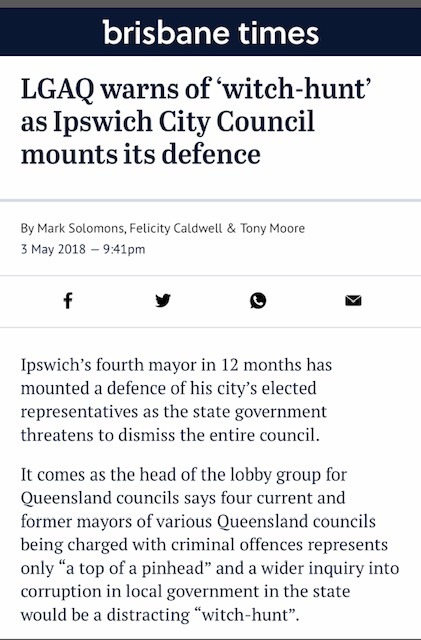
That mentioned head is of course Hallam, and it could be said, on the evidence of other corruption in councils, that the word pinhead could also apply to him. Maybe the CCC might start taking an interest in the LGAQ and all those tens of millions. Now that would be interesting.
Historical Snapshot: Barry Taylor And One Of His Mates Yesteryear

On the left, the bloke that looks like his got the loser of a cat fight on his head, thats the Carl Wulff that was Jim Soorlys pal at Liverpool Council before Wulff headed north to Ipswich. And of greater interest to us here in the ville is the bloke on the right. Thats Wayne Myers, a seriously well-connected go-between linking corporate life to a number of movers and shakers in the Queensland ALP. Mr Myers has pleaded guilty to corruption in connection with the Ipswich council he has admitted he facilitated bribes to go to his co-offenders who have also pleaded guilty. He will be sentenced next month when well see just how well connected he is.
But heres an interesting little bit of nostalgia Mr Myers is no stranger to Townsville, or to legal fee gouger Barry the Legal Foghorn Taylor.
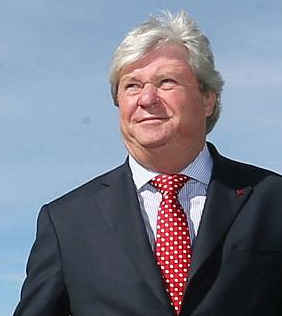
Back in the early noughties, maybe 2004, Meyers rode into Townsville with the hope of siphoning a good chunk of public money into his community telco business, which was being driven out of non-performing mining minnow Rennison.
It was a classic case of the Mates Economy. Myer recruited local Labor fundraiser and Mooney confrere Barry Taylor to corral a bunch of bizoids into his boardroom to hustle the dollars. Each chipped in $20k (including apparently Mrs Foghorn more on that in a minute) and then Myers went about trying to convince His Radiance Mayor Mooney that the ratepayers should (1) chip in an interest-free loan of $250k, (2) $20k of straight-up equity, and (3) commit to a long-term deal for all of the Councils telecommunications needs to the new company.

As things transpired, His Radiance, in his pre-meltdown years, had the good sense to have the matter properly researched by his then IT chief Anthony Wilson, who quickly nixed the deal offered by Myers and Taylor. Despite a lot of aww, cmon, mate, old buddy, pal entreaties, Mooney said no. In fact, The Pie was told that Mooney thought the whole thing a bad joke. The deal on the table was a dud. Myers model guaranteed fees to Rennison first and before anyone else; would have delivered sub-par service and cost outcomes to Council (Council could and did do much better); never budgeted for a repayment of the proposed loan; and didnt have a cent of interest for Council.
Poor old Richard Spiderman Ferry had become the chairman of a local business he knew nothing about. He was left carrying the can, when the business model proved a failure. There is no information about what happened to any monies that may have been handed over, but you can bet Bazza put in a bill for any legals.
What Myers (and Taylor, who mustve surely twigged to what Myers was up to if he hadfnt twigged, doesnt say much for his legal or business radar) tried to get away with was an arrangement where Rennison re-sold Optus Services to NQ Telco, and took a clip. Too many layers with too thin a set of margins doomed the activity from day one.
Myers went on his way, and Bazza carried on his hosting of other southern white shoe brigaders and their dubious schemes, notably the disgraced fraudster Craig Gore (currently fled to Sweden in the hope of avoiding jail on multiple charges of financial fraud), who risibly said he would put in a canal estate in the duck pond in front of the casino. Considering what happed later with Port Hinchinbrook, Townsville really dodged a bullet there when that all fell flat, but no thanks to Mr Taylor.
But All This Has Led To A Personal Revelation For The Pie
The Magpie has never fully understood the seething animosity that has driven Taylor on a vendetta against him that continues in the courts to this day. Barry on several occasions over the years, had threatened to sue me, but was never able to say for what (he was drunk on two occasions). Of course, he was all hot air at that stage because Bazza was never brave enough in his bluster to take on News Ltd, for whom I worked at the time. When Peter Gleeson came to town, he was in Barrys pocket even before he arrived, with his wife pre-promised a cushy job with Enema Legal.
I was puzzled that a boisterous boofhead like myself could attract such venom. At one stage, Taylor had Gleeson direct me to delete a quite harmless mention of him he had heard I was to include in the Magpie column (the comment simply said he had bought a multi-million dollar property in Noosa, and Barry said it could damage his reputation in Townsville his what, you laugh?) that was only time any editor interfered in any of my opinion columns for personal and not legal reasons. In that incidence, Taylor sent in a handwritten letter which Gleeson showed me (appalling writing and grammar) that strangely said that I was waging a campaign against his family. I didnt, and dont know his family, and quickly proved in the papers computer system that I had mentioned Taylor a total of 7 times in 8 years, none of them derogatory. I mentioned his wife in passing once when I wrote that she was the director of a company THAT HAD PUT $20k INTO A DUBIOUS TELCO BUSINESS WITH THE COUNCIL! Nothing illegal or even untoward was suggested, except that I didnt think it was a good idea.
So there we have it.
That must have been the start of it all, Baz not only being caught out in the subsequently failed telco venture, but that I had revealed he had inveigled his missus to whack up some cash as well (through a company of which she was a director, as I remember). Totally harmless, just a bit of local gossip, but somehow, Barry became as jumpy as a long-tailed cat in a room full of rocking chairs.
His bluster continued down the years, including threatening to arrange a boycott of Michels restaurant if they didnt drop their advertising on this blog. (They did drop the ads, he was a valuable albeit much disliked customer, but were happy to let me keep the couple of hundred they had paid.) And so it goes on still, he talked poor old Rabieh Krayem into suing me for alleged libel, knowing full well that I have no money or assets to pay 100th of the ludicrous $300,000 claimed.
Well, Baz, hatred comes at a cost, because you didnt reckon on two highly principled and incensed lawyer friends who offered to defend me because they cannot abide bullying, especially legal bullying like trying to spuriously involve my daughter on a technicality in matters that dont even remotely concern her. That alone was a clear measure of your craven behaviour and that of the ninny Venesa Gleeson (Typos wife) as a mother herself, youd think she might have some scruples, but alas, she will use the Hitler excuse I was just following orders least the Court of Appeal has chucked out that bit of vicious nonsense.
Rabieh, make sure you have it in writing that Barry is doing this for nothing for you, and that it really, as a mutual friend told me, purely Barrys show. Otherwise, those Nudgee fees for your two lads may well end in up in the Taylor bank account in Noosa.
The Townsville Property Market Will Be Hunky Dory In 2019, Says The Astonisher.
As the Hotels Combined teddy bear says on telly Really? Dont believe everything Mr Convincing tells you.
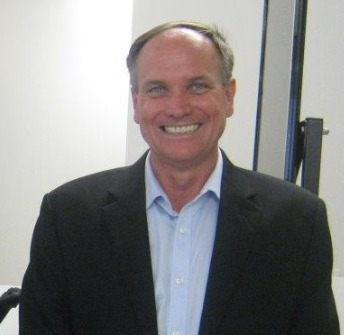
Since the City Economist, David Lynch, seems largely silent, heres a chart showing building approvals for 2018 (December numbers not available yet). The data is from the Councils own website.

One could do some extra work and show the comparisons for the previous year, or two for that matter, but why take work away from Lynchy.
To summarise: to the 11 months, in 2017 there were 641 dwelling approvals. In 2018 there were 432. For those numerically inclined thats 209 fewer or 30.2% less in number. And gee, I thought the stadium was going to be the one catalyst that would turn the whole show around. The one catalyst claim came from none other than the muppets at Enterprise House (where Mr Lynch used to work.)
And to cap things off, The Pie offers these self-explanatory charts.



However, the Astonisher persists with its cheery inanities, but raises an interesting pictorial question. One of the spangled cheer leaders of this self-serving guff is this bloke

Propertyology managing director Simon Presley
A propertyologist sorely in need of a psychologist and some serious sartorial advice. Seriously, are you going to believe a bloke who decides to sit in the middle of a busy Brisbane road, with an empty chair next to him to signify that no one else is that dopey. Keep it up, Mr Presley and youll soon be joining your namesake.
Captain Towns May Have Been A Blackbirder But
At least we have tucked his statue away in a discreet corner, but not those right-wing race-baiters up in Cairns. They have even got Captain Cook throwing a big Nazi salute.

Finally, Not One But Two Mini-Galleries On Overseas Matters
The first is the Brexit hullabaloo, which is far from over, but has been a cartoonists cornucopia. Heres four of the best.




And That Leads Us Into The Week In Trumpistan
What a difference a few hundred metres makes.
Because of his tantrum induced government shut-down, Trump was without catering services to entertain a visiting football team. So as a man addicted to whoppers, he called in Burger King to provide the food for the boys (he couldve just as easily gone with Maccas, asking his guests You want lies with that?)

And just down the road in DC at the very same time, there was a food line of Federal employees who havent been paid that stretched around the block of this massive federal building.

So its true what they say about America being a land of contrasts. That issue continued to dominate the visual commentary of the week, but the New Yorker knew who was needed to sort out demon Donny.
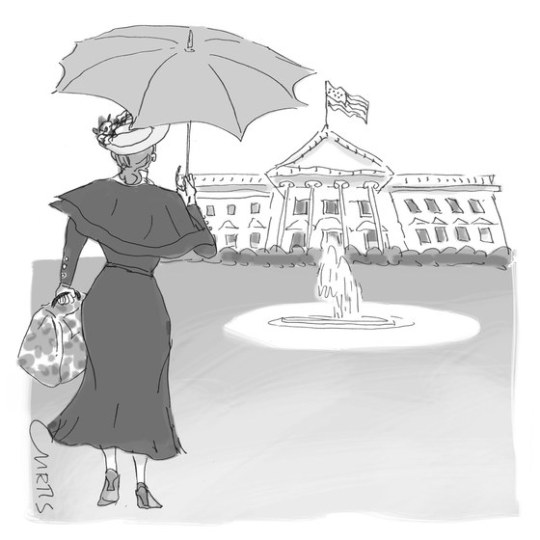
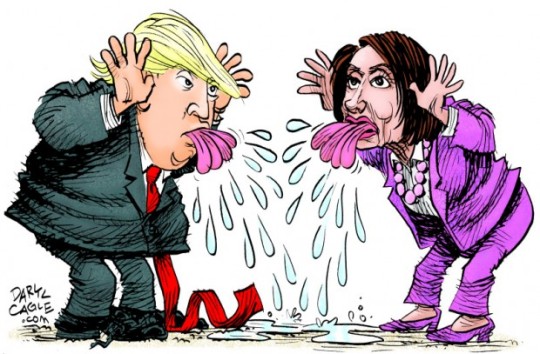
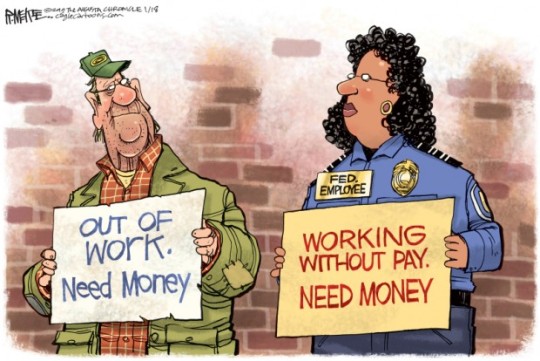




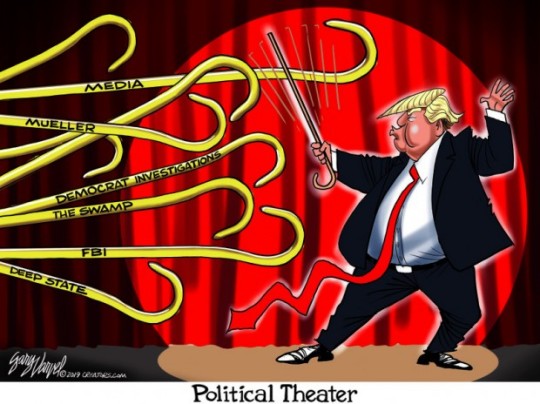



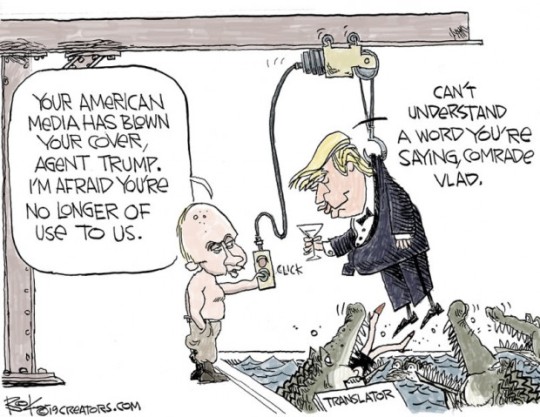


And so it goes
..
Thats it for this week, Nesters, and remember that comments run throughout the week, have your say, there was a very lively thread on the council getting involved in the citys mental health work (some hilarious) and theres plenty of fodder in this weeks Nest. And The Pie is loathe to say it, but times are a bit skinny in the Nest at the moment, with a few blog bills hitting the deck since Christmas, so any help with a donation would be greatly appreciated. The how to donate button is below.
http://www.townsvillemagpie.com.au/the-local-government-godzilla-should-the-ccc-be-taking-a-closer-look-at-the-money-grubbing-activities-of-the-lgaq/
0 notes
Text
‘Moonlight’ Takes Oscars
Arriving of age drama about a gay and lesbian black man defeats very hot favourite La La Property to win the Academy’s top award, after ordeal in which Damien Chazelle’s movie read out as champion by Faye Dunaway
Moonlight has won the best image Oscar in a chaotic honours ceremony climax which wrongly awarded the top honour in order to La La Land, the fiasco which stunned Showmanship and viewers around the world.
Faye Dunaway named La Los angeles Land as the year’s greatest picture at the end of Sunday night’s ABC broadcast only to become corrected a few minutes later since the musical’s makers celebrated upon stage, a tableau probably immortalised in Hollywood life. Check Nicholas Britell Little’s Theme sheet music notes page.
Anatomy of an Oscars disaster: how La La Property was mistakenly announced because best picture
Nicholas Britell

Audible gasps were heard in the Dolby theatre when La Los angeles Land producer Jordan Horowitz declared the real winner had been Moonlight, a coming-of-age episode revered by critics.
The close-up of the red package suggested Dunaway and Warren Beatty had an package containing a previous award with regard to best actress - Emma Stone of La La Property - prompting Beatty in order to hesitate before handing to Dunaway, who named Los angeles La Land as greatest picture winner.
Two moments later Horowitz, as festivities on stage turned into uproar, bewildered millions by stating a mistake had been made which it was not a joke. This individual held up a card displaying Moonlight was the winner.
The actual host Jimmy Kimmel tried to create light of the extraordinary stupidity: “I knew I would mess this show up. I really do. ”
Price Waterhouse Coopers, the accounting firm which tallies Oscar votes, required responsibility and issued a good apology. It said: “We sincerely apologize to Moonlight, La La Land, Warren Beatty, Faye Dunaway, and also the Oscar viewers for the mistake that was made during the honor announcement for best image. The presenters had wrongly been given the wrong category package and when discovered, was instantly corrected. We are currently examining how this could have occurred, and deeply regret this occurred. We appreciate the elegance with which the nominees, the actual Academy, and Jimmy Kimmel dealt with the situation. ”
Speaking backstage minutes later, Moonlight’s movie director Barry Jenkins said the actual error had left your pet speechless. “I’d never observed that happen before. This made a special feeling much more special but not in the way We expected. The last 20 moments of my life have been crazy … beyond life changing. ”
He said he failed to know how the error happened. “Things just happen. The individuals from La La Property were so gracious. We can’t imagine being in their own position. ”
Jenkins stated he hoped the movie, which tells the story of the gay African American boy we were young in poverty in Arkansas, would open doors for people of the LGBT community.
This individual shrugged off the award stupidity. “It’s unfortunate the way points happened … but very hot damn, we won greatest picture. ”
The ordeal capped an eventful evening which doubled up as the politically charged Hollywood move against Donald Trump, using the host, Jimmy Kimmel, and several presenters and winners creating coded and not-so coded denunciations of the White Home.
La La Land made an appearance on track for coronation, successful six Oscars, including greatest actress for Emma Rock and best director with regard to Damien Chazelle, 32, the actual youngest person to receive the actual honour.
Arrival, Moonlight, Fencing and Hacksaw Ridge scooped acting and technical honours, denying La La Property, which had 14 remise, a record-setting haul.
Casey Affleck won best acting professional for his portrayal of the grieving handyman in Stansted by the Sea, seeing away Denzel Washington, who had been tipped for a third Oscar with regard to Fences. Emma Stone received best actress for Los angeles La Land.
Mahershala Ali became the first Muslim acting professional to win an Oscar, taking best supporting acting professional for Moonlight. Viola Davis won best supporting celebrity for Fences - it had been the first time African Americans at the same time won in both categories.
Mel Gibson, not so long ago an industry pariah for drunken outbursts, created a comeback with Hacksaw Ridge, a bloodsoaked ww2 drama that earned 2 Oscars, including one for your sound mixer, Kevin O’Connell, his first win right after 21 nominations.
The schools also gave some like to Arrival, a critically recognized drama about communicating with extraterrestrials, in the form of the best sound modifying Oscar.
However , Hidden Numbers, about black women operating at Nasa’s space program, Hell or High Drinking water, about bank robbers within Texas, and Lion, the true-life story about a good Indian boy separated through his family, came aside empty-handed.
In contrast to La Los angeles Land’s romantic score, that suffused the ceremony, loudspeaker after speaker took swipes at Trump’s crackdown upon refugees and immigrants, which makes it one of the most politically tinged Oscars in memory.
The leader has paid close focus on previous Oscars but pointed out he would be too occupied hosting governors in Buenos aires to tune into this.
Kimmel opened proceedings having a plea for unity, advocating Americans to reach out across the community divide, before making multiple humor at the president’s expense. “I want to say thank you to Leader Trump. I mean, remember now last year when it seemed that this Oscars were racist? ” said Kimmel, referring to the actual #OscarsSoWhite controversy.
He stated the broadcast was being demonstrated in more than 225 nations “that now hate us”, and gave the target audience a chance to vent anti-Trump belief with a tribute to Meryl Streep, a totem associated with Hollywood hostility to the White-colored House.
Thinly veiled critique of Trump’s policies sdpeckled the night.
“I come from Malta. This is for all the immigrants, ” said Alessandro Bertolazzi, who else won for makeup with regard to Suicide Squad. “Art does not have any borders, ” said schools president Cheryl Boone-Isaacs.
“As a Mexican, as a Latina American, as a migrant employee - as a human being -- I’m against any type of wall that wants to individual us, ” said Gael Garcia-Bernal.
Rich Howard, co-director of Disney’s Zootopia, stated the animated film espoused “tolerance being more powerful compared to fear of the other”. Disney’s chief, Bob Iger, rests on Trump’s policy discussion board.
Several nominees, including Ruth Negga and Lin Manuel-Miranda, sported blue ribbons symbolising the American Civil Protections Union, which has challenged a number of presidential executive orders.
Moonlight Main Theme by Nicholas Britell
youtube
#moonlight#nicholas britell#oscars#2017#la la land#movie#sheet music#entertainment news#billboard hot 100
0 notes
Text
8 Things to Do With Your Kids in N.Y.C. This Weekend
Our guide to cultural events in New York City for children and teenagers happening this weekend and in the week ahead.
ORAN ETKIN at the Jewish Museum (Jan. 19, 11:30 a.m.). A jazz artist, Etkin hardly goes anywhere without his good friend Clara. She happens to be very talkative, even though she’s not, strictly speaking, a person: She’s his clarinet or, as he calls her, Clara Net. Etkin, who developed the children’s educational program Timbalooloo, which presents melody as a conversation among instruments, will appear with his band at the Jewish Museum, where he will show just how fluent Clara is in world languages. The program will include excerpts from his latest album, “Finding Friends Far From Home: A Journey With Clara Net,” in which she makes acquaintances like the mbira in Zimbabwe and the samisen in Japan. Etkin will also perform at National Sawdust on Feb. 1 as part of the monthly Timbalooloo Jazz for Kids Duo Series. In those programs, Clara usually chats with just one of her peers. This session will feature a kora from Mali, to be played by Yacouba Sissoko.
866-205-1322, thejewishmuseum.org
FAMILIES CELEBRATE AFRICA at the Brooklyn Society for Ethical Culture (Jan. 20, 3-5:30 p.m.). At this program for Martin Luther King’s Birthday, children can pay tribute to both the life of King and the land of his ancestors with an afternoon of music, dance, stories, crafts and face painting. The vocalist DuPree, accompanied by Barry Kornhauser and other musicians, will perform original songs about King, and the Nigerian artist Moses Ogunleye will show his own vibrant work and teach drawing techniques. Simba Yangala and the troupe from the cultural organization she founded, JungleDom Network, plan to get everyone moving with a relaxed lesson in Congolese dance. The instruction will be followed by a performance that all generations can join.
718-768-2972, bsec.org
‘FUNIKIJAM’S CITY OF HOPE’ at the Actors Temple Theater (Jan. 19-20, 11 a.m.). This new interactive show, also playing on Feb. 16 and 23, is a journey as much through time as to fascinating places. Presented by FunikiJam World Music, which offers both classes and entertainment to children, “City of Hope” honors Black History Month (February) by illustrating how African sounds and rhythms have influenced a variety of musical styles. Led by the songwriter Brian Barrentine and his cast, who here portray a construction crew on a mission, young audience members — the recommended ages are 2 to 10 — will explore zydeco in New Orleans, jazz in Paris and Motown tunes in Detroit.
347-913-5267, funikijam.com
HONORING DR. MARTIN LUTHER KING JR. at the Museum of the City of New York (Jan. 20, 11 a.m.-2 p.m.). Although many of the historic events of the civil rights movement took place in the South, the struggle was also waged in Northern cities like New York. This family program will include a scavenger hunt through the exhibition “Activist New York,” where children will learn about the school boycott of Feb. 3, 1964, which was a huge local protest of de facto segregation. Young participants will also hear readings from books about the era, such as Doreen Rappaport’s “Martin’s Big Words,” and use tissue paper and watercolors in an art project inspired by one of the drape paintings Sam Gilliam made in response to King’s assassination.
212-534-1672, mcny.org
[Read about the events that our other critics have chosen for the week ahead.]
KIDS ’N COMEDY: ‘NEW BEGINNINGS’ at Gotham Comedy Club (Jan. 19, 1 p.m.). Adults tend to think of the new year as a fresh start, but for adolescents, it often means a return to certain struggles, whether it’s dealing with trigonometry or figuring out how to talk to a crush. The tween and teenage comics at these shows — held monthly during the school year — deal with these topics and more, including the desire to reinvent themselves, and not just in January. Offering humor that is sophisticated but never vulgar (curse words are banned), these stand-ups are the best students in the Kids ’n Comedy program, which offers lessons in writing and technique from adult comedians.
212-877-6115, kidsncomedy.com
OPERA STARTS WITH OH! at Carousel of Languages (Jan. 19, 3-5 p.m.). If you want to get children excited about an art form, what better way than with a story of action and intrigue? That’s what you’ll find in “Leonore,” the 1805 Beethoven opera that the composer later revised and renamed “Fidelio.” Opera Lafayette, which specializes in reviving neglected works, will perform the original version this season, and this free educational event in Manhattan will begin with a summary of the plot, in which the titular heroine disguises herself as a man to help her husband, a political prisoner, escape from captivity. This program, which will be delivered in English — with some singing in German — will also emphasize how staging contributes to a successful production. Young participants will investigate period instruments, design their own sets and explore theatrical lighting by attaching gels to complimentary flashlights. They will finish by performing a light show for their families.
212-634-9388, operalafayette.org
‘SOUNDER’ at Film Forum (Jan. 18-19, 11 a.m.; Jan. 20, 3 p.m.). Some of the best movies for young people have no special effects, cutting-edge animation or intergalactic battles. Film Forum Jr., a series introducing children to cinematic classics, is screening a noteworthy example this weekend. Martin Ritt’s “Sounder” (1972), which was nominated for four Oscars, including best picture, focuses on a struggling family of black sharecroppers in the Depression-era South. Adapted from William H. Armstrong’s Newbery Medal-winning novel, the drama captures the odyssey of the elder son to find the children’s father, who has been sentenced to hard labor for the desperate act of stealing food. The movie, which made Cicely Tyson a star, takes its title from the name of the family’s hunting dog, who plays his own role in this chronicle of steadfastness and survival.
212-727-8110, filmforum.org
WINTER ZOO WONDERLAND at the Prospect Park Zoo (Jan. 18-20 and 25-26, 11 a.m.-4 p.m.). When the weather gets cold, we just put on our sweaters and heavy jackets. Animals don’t have the luxury of separate wardrobes, but certain species have their own solutions, like growing thicker fur. This program invites families to follow a trail through the zoo that highlights creatures that are suited to chilly temperatures, like Pallas’s cats, known for their long, dense fur, and sea lions, which have oily coats and a thick layer of blubber. (Don’t miss the antics at the daily sea lion training sessions.) The event also features a conservation station with a game that teaches children about the different wildlife responses to winter: migrating, hibernating or adapting.
718-399-7339, prospectparkzoo.com
Sahred From Source link Arts
from WordPress http://bit.ly/2TGB0BB
via IFTTT
0 notes
Text
Best TV of 2019 so far
Back to Life
Daisy Haggard’s downbeat gem took on a tough topic – a woman’s return to her home town after a stretch behind bars – and turned it into a meditation on grief, regret and the passing of time, though with enough gags to keep things zipping along.
What we said: A few episodes into Back to Life, I felt like pushing it away in protest. “No, no!” I cried inwardly. “It’s too much! It’s too good!” Read the full review
Barry
In its second season, this black comedy about a hitman who catches the acting bug took its story into darker territory, with Barry’s attempts to extricate himself from his past life only dragging him further into oblivion. Things aren’t going to end well.
What we said: Though it’s a comedy rather than a thriller, Barry replicates much of what made Breaking Bad irresistible. Read more
Broad City
After five virtually flawless sitcom seasons, Ilana Glazer and Abbi Jacobson’s millennial kweens went out in the same way they came in: with gross-out gags, madcap surrealism and one of the greatest on-screen friendships in TV history.
What we said: This season has given Abbi and Ilana the best possible send-off. It has been joyful, silly and wild, and while it feels like the perfect and necessary time to wrap up their adventures, it is poignant that they’ve done so by reminding you just how good those can be. Read more
A fitting, shocking end ... Catastrophe. Photograph: Channel 4
Catastrophe
Another comedy that went out on a high, Sharon Horgan and Rob Delaney’s tale of floundering parents managed to deliver more home truths about the family unit, pay fond tribute to late guest star Carrie Fisher – and offer up one of the most shocking endings in recent TV history.
What we said: From first to last, Catastrophe has been an unremitting triumph. Read the full review
Chernobyl
Already sitting atop IMDb’s top 250 TV shows list before the final episode has even aired, Sky and HBO’s restaging of the Soviet nuclear disaster captures the ineptitude, corruption and horror at its core.
What we said: Chernobyl is a disaster movie, a spy movie, a horror movie, a political thriller, and a human drama, and it spins each plate expertly. The terror is unflinching and explicit, and its images of burned bodies collapsing into putrid decay are impossible to forget. Yet it never feels shocking for the sake of it, only as haunting and horrible as its subject matter demands. Read more
Finally ... David Attenborough lays bare our greatest threat in Climate Change: The Facts. Photograph: BBC/Polly Alderton
Climate Change: The Facts
After years spent hinting at the damage done to our planet by the climate crisis , David Attenborough finally laid out the threat in all its magnitude, in a documentary that may just have turned sceptics into believers.
What we said: This is a rousing call to arms. It is an alarm clock set at a horrifying volume. Read the full review
Dead Pixels
E4’s comedy accurately captured the loneliness and mundanity, but also the sense of community, that comes with picking up a controller. All that, and it was as addictive as an all-night Fifa session to boot.
What we said: This wickedly entertaining new sitcom may have been inspired by the massive success of online games like World of Warcraft but, thankfully, you are not required to know your Azeroth from your elbow to enjoy it. Read more
Derry Girls
One of last year’s surprise hits, Lisa McGee’s Northern Irish comedy didn’t let things slip in its second season, with its quartet still finding teenage kicks in the midst of the Troubles. The scene in which teens from both sides of the sectarian divide unleashed a barrage of stereotypes about each other (“Protestants hate ABBA!”) is among the year’s funniest.
What we said: Derry Girls’ magic remains intact. The evocation of the 90s is as lightly done as ever (Elizabeth Hurley is fleetingly referenced – “She’s a total ride, but she paperclips her frocks together”) and the Troubled setting never overwhelms but simply throws into relief the ordinariness of the girls’ lives in the middle of extraordinary depths of conflict. Read the full review
Don’t Forget the Driver
Bleak comedy … Toby Jones in Don’t Forget the Driver Photograph: BBC/Sister Pictures
Pulling off a state-of-the-Brexit-nation series looked a tall order, but Toby Jones’s understated comedy-drama was taller, finding humour and pathos in its tale of a coach driver who discovers a refugee hiding in his wheel arch and a body washed up on the beach.
What we said: If it is a comedy, it is one with the bleakest tragedy at its heart. But whatever label you put on it, it is a fine, fine piece of work. Read the full review
Fleabag
Back for its second (and, as it turned out, final) outing, Fleabag added a hot priest into the already heady mix of biting wit and family dysfunction – and it built to a heart-rending ending with a wedding, a mad dash to the airport … and a fox. Unforgettable.
What we said: Series two raised the bar. Phoebe Waller-Bridge’s risks were so impressive all one could do was shake one’s head in appreciation. Read the full review
Game of Thrones
Unquestionably the TV event of the year ... Game of Thrones. Photograph: HBO
Did the gargantuan fantasy drama stick the landing in its final season? That’s an argument for the comments section, but both in the scale of its six episodes, and the fevered discussion they prompted, it was unquestionably the TV event of the year.
What we said: The ending was true to the series’ overall subject – war, and the pity of war – and, after doing a lot of wrong to several protagonists, it did right by those left standing. When you play the Game of Thrones, you win or you die. Overall, I think, it won. Read the full review
Gentleman Jack
Sally Wainwright travelled back in time for her latest piece of thrillingly human Yorkshire drama, with this real life tale of Anne Lister. Suranne Jones has received rave reviews for her portrayal of the 19th-century industrialist and diarist, who developed a code to hide her lesbianism.
What we said: It’s Regency Fleabag! Because the heroine occasionally breaks the fourth wall and exteriorises her inner monologue. But it’s set in Halifax in 1832, so it could be Northern Jane Austen. Then again, it’s about Anne Lister, who has been dubbed the first modern lesbian, so maybe it’s Queer Brontë ... You can afford to have a little fun with Gentleman Jack; Sally Wainwright clearly has. Read the full review
Ghosts
The Horrible Histories team offered up more unashamedly silly comedy with this spirited sitcom about a group of ghouls going to war with the new owners of a crumbling mansion.
What we said: In making us giggle at the supernatural, Ghosts is very British. But it is American in the sense of having a gag-to-airtime ratio much higher than British sitcoms normally manage these days. Read the full review
I Think You Should Leave With Tim Robinson
This deliriously absurd sketch show from a former Saturday Night Live player was hailed immediately as one of the greatest Netflix shows to date.
What we said: I wolfed down the entire series in one sitting, genuinely incapacitated with laughter. And then I watched it all again. I’m at the stage where I’m cherrypicking sketches now, but I’ve seen my favourites six or seven times. I’m fully obsessed at this point. At its peak, I think I Think You Should Leave might be one of the funniest things I have ever seen. Read more
Leaving Neverland
A devastating four-hour exposé of alleged child sexual abuse by Michael Jackson. Wade Robson and James Safechuck chillingly and plausibly outlined their accounts of childhood grooming by the man that they, and the whole world, worshipped.
What we said: An astonishing piece of work. Relentlessly spare and unsensationalist, it manages better than any other in its genre not to let its attention wander from the survivors’ testimony. Footage of Jackson is confined almost wholly to that of him with the boys themselves on stage, private calls between them and family snaps. He is never allowed to overwhelm the story. Read the full review
Line of Duty
Complex … Martin Compston and Stephen Graham in Line of Duty. Photograph: BBC/World Productions
Jed Mercurio’s police corruption masterpiece returned for a fifth outing after a two-year wait, bringing with it a stunningly complex performance from Stephen Graham, more urgent exits required … and heartstopping, jaw-dropping action to the last.
What we said: As ever, nothing is wasted; not a scene, not a line, not a beat. It fits together flawlessly – you can imagine Mercurio sitting like a watchmaker at his table with the parts spread before him and fitting the loupe to his eye before assembling the whole thing and listening for its perfectly regulated tick. Read the full review
Mum
Stefan Golaszewski’s sitcom tour de force ended on a heartwarming high. Over three lovely series, Lesley Manville and Peter Mullan as Cathy and Michael gave us the gift of a quietly epic romance that will echo down the ages – and kept the tears in our eyes.
What we said: Mum might have looked like it was just a sitcom, but it had something beautiful to say about love and loss. It’s said it. Read the full review
Pose
Assembling the largest collection of trans actors in televisual history, Ryan Murphy’s big-hearted drama about the voguing scene in 1980s New York had style, grace, swagger and sass for days. What’s not to love?
What we said: Razzle-dazzle showmanship isn’t Pose’s only source of infectious joy. Watching the slow, still-unfolding process of these characters becoming more and more their true selves is as exhilarating as the opening bars of Cheryl Lynn’s Got to be Real. Self-actualisation isn’t easy, but it sure is beautiful. Read the full review
Pure
Frank and fearless ... Pure. Photograph: Sophia Spring/Channel 4
Following a young woman with a form of OCD called Pure O, which manifests as constant invasive thoughts about sex, this comedy-drama was among the year’s frankest and most fearless TV.
What we said: The drama and the gags are never sacrificed to worthy exposition, virtue-signalling or finger-wagging, but, at the same time, the series has so evidently been made in good faith that you can surrender to it entirely, never fearing that it will put a foot wrong. Read the full review
Russian Doll
A hipster Groundhog Day, but also so much more, Natasha Lyonne’s comedy about a thirtysomething trapped in a time loop of death and rebirth proved a truly mind-bending proposition.
What we said: Russian Doll is an acquired taste. But do persist: there is such a fine, idiosyncratic, impressive show nested within. Read the full review
Sex Education
Gillian Anderson starred as Jean, a sex therapist whose son Otis (Asa Butterfield) – though too anxious to masturbate himself – sets up a sex advice service at school. A punchy, horny comedy, with the added bonus of the fantastic Ncuti Gatwa as Otis’s best friend Eric. Worth watching for his heroic prom outfit alone.
What we said: Endlessly and seemingly effortlessly funny, in a naturalistic way that doesn’t have you listening for the hooves of the next gag thundering down a well-worn track but, like Catastrophe, catches you almost unawares and makes you bark with laughter. Read the full review
The Last Survivors
Sam Dresner, Anita Lasker-Wallfisch, Frank Bright and Susan Pollack ... The Last Survivors. Composite: BBC/Minnow Films Ltd
Arthur Cary’s thoughtful, wonderful and always dignified 90-minute documentary heard the stories of some of the last living people who survived concentration camps as children. A very important work indeed.
What we said: For an hour and a half, I was crying, especially when Cary followed three generations of Holocaust survivors to Auschwitz, knowing all the time that tears are not enough. Nor guilt. Read the full review
The Other Two
How would you react if you could barely get cast as Man Who Smells Fart in an advert while your kid brother became a Bieber-esque teen hearthrob overnight? That’s the premise of this brilliant satire, which skewers our pop-culture-obsessed society spectacularly.
What we said: It has heart, charm, steel, belly laughs and a gimlet eye. Get on it. Read the full review
The Victim
John Hannah and Kelly Macdonald starred in an intelligent drama about a vigilante attack on a potential child killer that managed to ask ever more challenging questions as its episodes rolled on.
What we said: It is a drama that resonates with its time by asking what constitutes a victim and how much leeway we allow in bestowing that status. Do they have to be perfect? How sure do we have to be? And what happens when the perpetrator becomes a victim too, of a different kind? Read the full review
The Virtues
Shane Meadows reunited with This is England star Stephen Graham for an unflinching drama about a troubled dad attempting to reunite with his long-lost sister and process childhood sexual abuse.
What we said: Unspoken pain infuses every scene, every gesture and expression from Stephen Graham and in doing so lays the foundations to do justice to the suffering of victims everywhere. Read the full review
The Yorkshire Ripper Files
Liza Williams’s three-part documentary revisited one of the biggest – and longest – murder manhunts in British history, taking us back to a time so different it seemed almost foreign.
What we said: At its best, Williams’ series – with its mixture of archive footage and new interviews – is a social document. The hindsight it offers is not primarily about the mishandling of the investigation, but of the grim tone of the times. Read the full review
This Time With Alan Partridge
Appalling company ... This Time With Alan Partridge. Photograph: Colin Hutton/BBC/Baby Cow
The excruciating monkey tennis-pitcher went back to the BBC for a One Show-style magazine programme. Inevitably – and hilariously for viewers – it wasn’t the smoothest of returns.
What we said: We get the heroes we deserve, and as you finish writhing in agony and lie limp from laughter, hatred, panic, despair or in awe at the end of another half-hour in his appalling company, you can only reflect that if Brexit means Alan then the whole business just got more complicated still. Read the full review
Veep
A last hurrah for Julia Louis-Dreyfus’s mendacious yet incompetent vice-president, in a political satire that was perfectly attuned for these most buffoonish of times.
What we said: Louis-Dreyfus has won a record six Emmy awards for her role as Selina Meyer, and, frankly, it’s no wonder. She is magnificent, brittle and furiously amoral. In this seventh and final season of Veep, it appears to be getting out while it still has a hope in hell of making its fictional world look more comedic than the real one. Read the full review
When They See Us
Almost unbearably harrowing ... When They See Us. Photograph: Atsushi Nishijima/Netflix
Ava DuVernay’s staggering miniseries about the Central Park Five showed how a group of young boys came to be falsely convicted for raping a young white woman in 1989. It is unbearably harrowing to watch the boys, as young as 13, get violently coerced by police into giving confessions.
What we said: The performances are uniformly astonishing – especially from the central five, Asante Blackk, Caleel Harris, Ethan Herisse, Marquis Rodriguez and Jharrel Jerome, most of whom are just a few years older than the teens they are playing. They capture the innocence, in all senses, of children, and the permanence of its loss. It feels like a great privilege to see them. Read the full review
Years and Years
Russell T Davies’s hugely ambitious drama followed a family through the next 15 years of British life, taking in the migrant crisis, terrifying technological innovations and Trump’s increasingly fraught face-off with China.
What we said: For a series that compresses 15 years into six hours, it seems to pass in the blink of an eye thanks to Russell T Davies’s trademark humour, compassion and the kinetic energy with which he infuses every project. We do not deserve Davies, but thank God he’s here. Read the full review
100 Vaginas
Following her projects about breasts and penises, artist Laura Dodsworth photographed a range of women’s vulvas, then showed the sitters their vaginal portraits and interviewed them for their responses. The result? Intimate, empowering television, unlike anything that has ever aired before.
What we said: A gently but relentlessly radical documentary. It’s not until you see a full set of female genitals filling your screen that you realise how little you see anything of or about them in wider culture. Read the full review
Source: https://www.theguardian.com/tv-and-radio/2019/jun/03/best-tv-of-2019-so-far
0 notes
Text
Out from the margins: meet the New Daughters of Africa writers
New Post has been published on https://writingguideto.com/must-see/out-from-the-margins-meet-the-new-daughters-of-africa-writers/
Out from the margins: meet the New Daughters of Africa writers
More than 25 years after her groundbreaking Daughters of Africa anthology, Margaret Busby reflects on the next generation of black women writers around the world
Time was when the perception of published writers was that all the women were white and all the blacks were men (to borrow the title of a key 1980s black feminist book). At best, there was a handful of black female writers Toni Morrison, Alice Walker, Maya Angelou who were acknowledged by the literary establishment. This was the climate in which, more than 25 years ago, I compiled and published Daughters of Africa. It was critically acclaimed, but more significant has been the inspiration that 1992 anthology gave to a fresh generation of writers who form the core of its sequel, New Daughters of Africa.
The critic Juanita Cox told me: I received Daughters of Africa as a birthday gift from my father. Two things immediately struck me about the book. It was huge and it contained women like me. Even though Id been brought up in Nigeria, I had had very little exposure to black literature. At school the only black characters Id ever read about occupied the margins: figures like the Sedleys servant Sambo and the mixed-race heiress Miss Swartz in Thackerays Vanity Fair. Daughters of Africa introduced me to a huge number of writers Id never previously been aware of. And on a more personal level it made me realise that I was somehow valid. The anthology was peopled not just by women of pure African descent, but also women of mixed ancestry, and just like the women the book contained, I too could have a voice.
Ivorian Edwige-Rene Dro said: It was as if the daughters of Africa featured in that anthology were telling me, their daughter and grand-daughter, to bravely go forth and bridge the literary gap between francophone and anglophone Africa. Bermudian writer Angela Barry, meanwhile, spoke of her thrill at coming across a contributor whose father was from her island, allowing her to feel that I also was a daughter of Africa and that I too had something to say. Writer Phillippa Yaa de Villiers recalls: We were behind the bars of apartheid we South Africans had been cut off from the beauty and majesty of African thought traditions, and Daughters of Africa was among those works that replenished our starved minds.
Windrush is an ever-present theme Jamaican immigrants arrive at Tilbury in 1948. Photograph: PA
New Daughters of Africa has been a truly collaborative venture: writers steered me in the direction of others whose work they admire. Altogether, more than 200 writers from more than 50 countries contributed work to the new anthology, from Margo Jefferson to Aybmi Adby, Malorie Blackman to Yrsa Daley-Ward. New Daughters of Africa begins with some important entries from the 18th and 19th centuries a reminder that later generations stand tall because of those who have gone before. Nana Asmau (17931863), a revered figure in northern Nigeria, spoke four languages and was an educated and independent Islamic woman whose life and work can be considered a precursor to modern feminism in Africa. Sarah Parker Remond (18151894), abolitionist, lecturer, suffragist, demonstrates many of the themes and serendipitous connections that characterise this anthology. Her letter of September 1866 to the London Daily News, in which she waxes eloquent on the reactionary movement against the coloured race in the United States, and castigates the social commentator Thomas Carlyle for having claims to the gratitude of all negro haters on both sides of the Atlantic, makes one wonder how she might have reacted to a tweet by Donald Trump. Elizabeth Keckley (18181907), her life bridging the 19th and the 20th centuries, describes first hand the trauma of enslavement in her autobiography Behind the Scenes: Or, Thirty Years a Slave and Four Years in the White House, published in 1868 exactly 100 years before the mould-breaking year that Delia Jarrett-Macauley refers to, when on university campuses from Paris to New York, students were protesting against the old order, against bureaucratic elites, against capitalism, sexism and racism and all forms of authoritarianism.
The year 1968 was blighted by the assassination of Martin Luther King in April. Later that month Enoch Powell gave his infamous Rivers of Blood speech, scaremongering about mass immigration to the UK. And it was in that year that Angela Cobbinah, the only black girl in her Cornish village, watched African American athletes Tommie Smith and John Carlos raise their fists in a Black Power salute on the podium at the Mexico City Olympics. I felt an unfamiliar emotion, she writes. Call it connection or kinship, or the bubbling of a youthful rebelliousness.
Such connections, and bonds of kinship, actual as well as intuited, strengthen the links between contributors. There are the literal mother-daughter relationships, as with Josephine St Pierre Ruffin (18421924) and Florida Ruffin Ridley (18611943). It is pleasing to note the emergence as a writer of Yvonne Bailey-Smith, having raised and empowered three successful children (Zadie Smith and her brothers), to witness Attillah Springer following the path of her mother Eintou Pearl Springer, a contributor to Daughters of Africa, and to see Rebecca Walker, daughter of Alice Walker, achieve prominence in her own right.
In many ways 1992 seems much longer ago than a quarter century; yet, while much has changed, many challenges remain to the publication of work by women of African descent. Who imagined in 1992 that we would celebrate the first African American US president in 2008, and who could have predicted who would follow Barack Obama in the White House? Much more empowering to think of Michelle Obama, who in 2018 broke records with her memoir Becoming, selling 1.4m copies in its first week.
In 1992, Morrison had not yet been awarded the Nobel prize. Only the following year did she become the first black woman to win it. Many accomplishments were years away: Jackie Kay, the current Scottish makar and a contributor to the first anthology, had only just begun to receive recognition after the 1991 publication of her first book. So the authors within New Daughters of Africa that may still be unknown are as deserving of attention as the household names.
Custom, tradition, friendships, romance, sexuality, intersectional feminism, the politics of gender, race and identity all are explored, in ways that are surprising, angry, considered, joyful, heartrending. Taboo subjects are addressed head on, familiar dilemmas elicit fresh takes. How candid and engaging is Ted Hughes poetry prize-winner Jay Bernards I resist the urge to destroy my own records by reflecting on archives, how I use them, and what they have meant to me. How touching is Andaiyes recollection of her amity with Audre Lorde:
I do not remember when I wrote Audre but I did, and I remember that she answered immediately and sent me a copy of A Burst of Light with the inscription, Sister Survivor May these words be a bridge over that place where there are no words or where they are so difficult as to sound like a scream!
Unflinching stories Audre Lorde. Photograph: Robert Alexander/Getty Images
Lordes name recurs in other contributors work, including that of Edwidge Danticat, Sisonke Msimang and Panashe Chigumadzi, who writes:
It wasnt until I met the force of the unflinching stories of our mothers and grandmothers and aunts and sisters written by black women that I was compelled to find an answer to the question: what did it mean to be a black woman in my grandmothers time?
The different ways of connecting to an African heritage are an ever-present theme, as are stories of migration, and specifically Windrush stories, typified by the poignant writing of the late Andrea Levy, whose father was among those immigrants who sailed to Britain from the Caribbean on the Empire Windrush in 1948. Stories of mothers separated from offspring through transatlantic crossings, and the resultant psychological effects, inform many of the contributions.
How you find your identity in the course of growing up in Britain is a major thread, whether it is Simi Bedford describing the particular experience of being an African at boarding school in England shared by many (myself included) or Nah Dove making the journey from a childhood in West Africa.
So often London encapsulates the black British experience, with all its possibilities for racism, and much else besides. For Donu Kogbara, whose harrowing tale is of being kidnapped in her Nigerian homeland, London has become a sanctuary.
The book reveals works in progress, identities in transition, shapeshifting sensibilities, a delicious mash-up of expectations. Who knew that Nadifa Mohamed, one of Grantas best young British novelists in 2013, was also a fine poet? The chef Zoe Adjonyoh, from whom cookery writing might have been expected, delivers a memoir of her father that is indeed A Beautiful Story. Contributors are drawn to write about countries not theirs by birth: a Zimbabwean shines light on Antigua, Ghana has an impact on a writer from Trinidad.
Another link with Daughters of Africa is the image on the UK cover, by black British photographer Suzanne Roden, featuring her friend Sibusiso Nozipho Mavolwane (19582015). Busby herself exemplifies the international scope, historical trajectory and enduring female bonds represented by the 200-plus women in New Daughters of Africa. The third of five sisters, she was born in what was then Southern Rhodesia, lived in the former Gold Coast, attended boarding-school in Sussex, and from the 1980s worked in London. New Daughters of Africa pays tribute to her as well as to the many writers we have lost, most recently the talented Andrea Levy.
The aspirational mantra of inclusivity and diversity is increasingly routine, fashionable even, in todays publishing industry, but lasting change has yet to be achieved. Verna Wilkins, founder of the childrens imprint Tamarind Books, explains in her essay that she began hands-on work creating books in diverse classrooms in the belief that the process must start with children: They should see themselves as the authors, editors, designers, illustrators and publishers of the future.
New Daughters of Africa: An International Anthology of Writing by Women of African descent, edited by Margaret Busby, is published by Myriad. New Daughters of Africa is launched at Women of the World at Southbank Centre, London SE1, 8-9 March. southbankcentre.co.uk.
Read more: http://www.theguardian.com/us
0 notes
Text
The Best Current Source for Streaming Classic Movies is ... Amazon Prime?
What is the classic movie fan to do in the era of Netflix? For a few glorious years FilmStruck was our salvation, offering a rich, well-curated collection of films from the silent era through the 1970s, something Netflix gave up on years ago.
So with FilmStruck dead, where can the fan of classic movies—let's say, just for the sake of argument, anything older than 40 years—get their fix without resorting to renting each and every title on iTunes or Fandango?
The answer might surprise you. The meatiest streaming source for world cinema classics is Kanopy, a free service offered through most (though not all) public and college library systems. But there's a limit of five streams per month and while they carry hundreds of titles from the Criterion Collection from such directors as Akira Kurosawa and Ingmar Bergman, the collection of classic American cinema is relatively small.
That's where Amazon Prime Video enters the picture. Netflix has maybe a dozen Hollywood feature films from the years between 1940 and 1980, along with a collection of war documentaries and rarities from pioneering women filmmakers and African-American directors. Interesting, yes, even admirable, but awfully limited in scope and selection.
Prime Video offers a rich, rapidly-churning catalog of sixties and seventies cinema: "Chinatown" and "All the President's Men," "A Clockwork Orange" and "Raging Bull," "The Great Escape" and "Mickey One." And back it goes through Billy Wilder's "Some Like it Hot" and "The Apartment," John Huston's "Moby Dick," Howard Hawks' "Red River," "Born Yesterday" with Judy Holliday and William Holden, "Platinum Blonde" with Jean Harlow, and holiday perennial "It's a Wonderful Life" just to name just a few.
Dig a little deeper and you can find the deliriously baroque western "Johnny Guitar" with Joan Crawford, end-of-the-world drama "Five" from radio drama pioneer Arch Oboler, "Dead Reckoning" with Humphrey Bogart, "The 7th Voyage of Sinbad" with Ray Harryhausen effects, and Ben Gazzara in "The Strange One," the first film from "Private Property" director and Actor's Studio legend Jack Garfein. There are silent films, crime pictures, westerns, and musicals, plus gialli, spaghetti westerns and Italian crime thrillers, Japanese gangster pictures, cult oddities like Slava Tsukerman's "Liquid Sky" and Teruo Ishii's "Horrors of Malformed Men," and even a few international classics.
So why isn't Prime Video getting more attention?
Amazon's catalog of Hollywood and international classics is admittedly on the shallow side compared to the height of FilmStruck, which married two amazing catalogues with a deep collection of film history. But it's an eclectic collection and it's always churning out new titles. In 2018, Amazon Prime members could stream "Mean Streets," "One Flew Over the Cuckoo's Nest," "The Man Who Would Be King," "Barry Lyndon," "Bullitt," "Performance," "Point Blank," "Bonnie and Clyde," "Gone With the Wind," and "The Wizard of Oz."
Still, there's a major problem: finding the films in Amazon's catalog. FilmStruck was curated, and told subscribers what was new and it provided spotlights on directors, actors, and various themes to encourage exploration. The classics of Prime Video are buried amongst scores of B-movies, old and new.
There are others problems: Amazon offers both a Prime Video service of streaming movies with a subscription along with its huge selection of Amazon rentals. Recommendation galleries and search results often bring up a mix of both. Even some individual films—"Red River," for example—are offered from multiple sources, only one of which is included in the Prime subscription. The search results don't always favor the free version, which is usually indistinguishable in quality. The only difference is that one will cost you a few dollars to rent. It may simply be a flaw in the system but a more cynical take might see this as a sneaky way to grab a few extra bucks. Whatever the reason, it's doesn’t help the Amazon Prime subscriber make the most of their service.
While the majority of films are presented in fine editions, indifferent quality control means that there are scores of poor copies of public domain titles (as well as some more recent films) that don't look or sound much better than the bargain bin videotapes you could find 20 years ago. That's an instant turn-off in an age where studios routinely remaster their catalog for the HD era.
Browsing by genre on Amazon Prime is like wading through the donations bin of a library sale and counting on Amazon's own recommendations isn't much better. For a company that built its success on targeting consumers based on their buying patterns, the metrics of Amazon's search function fail to sort the wheat from the chaff of its streaming library.
And there's a lot of chaff in their vast collection. For example, when I log in to my account and click my way to "Movies" and "included with Prime," I get plenty of recent releases front-loaded on the page. There are even a few genuine classics in my "Top Rated Movies" feed: "A Clockwork Orange," "The Big Country," "The Great Escape." But when I scroll down to "Classic Movies" the pickings are, shall we say, a little less promising. 1983 "Animal House" knock-off "Screwballs," "Lone Wolf McQuade" with Chuck Norris, and the vile "The Evil That Men Do" with Charles Bronson are all offered up before "All the President's Men" and "The Apartment" appear. Definitions of the term "classic" aside, what in my search history churns up these suggestions?
With FilmStruck gone and no real alternative filling the void at present, Amazon is in a prime position to grab up fans of classic movies. But why isn't there some kind of mailing promoting those older classics cycling through the catalog every month? And why aren't Amazon's Facebook and Twitter feeds alerting movie buffs of what's new beyond "Mrs. Maisel" and "You Were Never Really Here" and other Prime Originals? For a marketing powerhouse like Amazon, they can't seem to find my sweet spot, and I'm a guy who is constantly clicking on classic titles to spotlight in my newspaper columns and website.
There's a great selection of films for film buffs, classics fans, and adventurous viewers. All they need is a little help finding them. So here's a sampling of just a few titles from across the spectrum that you can stream now with a Prime subscription, a little something for all tastes:
Bonafide Classics:
Alan J. Pakula's "All the President’s Men" (1976) with Robert Redford and Dustin Hoffman.
Roman Polanski's "Chinatown" (1974) with Jack Nicholson and Faye Dunaway.
World War II adventure "The Great Escape" (1963) with Steve McQueen leading a grand cast of escapees.
Stanley Kubrick's anti-war classic "Paths of Glory" (1958) with Kirk Douglas.
George Cukor's "Born Yesterday" (1950), which earned an Oscar for Judy Holliday.
Howard Hawks' epic western "Red River" (1948) with John Wayne and Montgomery Clift.
George Stevens' "The Talk of the Town" (1942) with Jean Arthur, Cary Grant, and Ronald Colman.
Leo McCarey's "The Awful Truth" (1937) with Cary Grant and Irene Dunne.
Gregory La Cava's screwball masterpiece "My Man Godfrey" (1936) with William Powell and Carole Lombard. There are plenty of bad editions out there; this is from an excellent source.
"Gumshoe"
A Deeper Dive:
"Images" (1972, R) – Susannah York won the Best Actress award at Cannes for her performance as a deeply schizophrenic author in Robert Altman’s richly textured psychological thriller.
"Gumshoe" (1972) – The feature debut of director Stephen Frears is a playful tribute to American crime movies starring the late Albert Finney as a small time Liverpool entertainer playing private detective.
"Age of Consent" (1969) – James Mason is an artist who flees England for Australia to go Gauguin on a tropical island and a young Helen Mirren is his muse in Michael Powell's final feature film.
"Mickey One" (1965) – Warren Beatty is a nightclub comic who goes on the run when the mob tries to kill him in the offbeat psychodrama from director Arthur Penn.
"Zulu" (1964) – Stanley Baker, Jack Hawkins, and Michael Caine are hopelessly outnumbered in Cy Enfield's end-of-the-empire military epic set in a colonial 19th century African outpost.
"Underworld U.S.A." (1961) – Organized crime is merely another form of big business in Sam Fuller's punchy, pulpy revenge drama with Cliff Robertson, one of the director's best.
"The Big Country" (1958) – William Wellman's sweeping cattle country epic stars Gregory Peck, Charlton Heston, Burl Ives, and a gloriously epic score.
"The Barefoot Contessa" (1954) – Ava Gardner is the title character in the Joseph L. Mankiewicz drama, but Humphrey Bogart took top billing and supporting actor Edmund O'Brien took home the Oscar.
"Johnny Guitar" (1954) – Scarlett businesswoman Joan Crawford takes on repressed Mercedes McCambridge in a psychological western with political reverberations from Nicholas Ray.
"Merrily We Go To Hell" (1932) – Dorothy Arzner, a rare career woman director in the Hollywood’s early sound era, directs this sassy pre-code drama of society decadence and excess with Fredric March and Sylvia Sidney.
"Cockfighter"
Cult Movies:
"Cockfighter" (1974) – Warren Oates is an obsessive cockfighting trainer who takes a vow of silence after his hubris costs him the championship in the offbeat adaptation of Charles Willeford's novel directed by Monte Hellman.
"Wake in Fright" (1971) – The brutal, blackly funny thriller of an urban schoolteacher (Gary Bond) stranded in a grimy mining town in the sun-blasted Australian Outback anticipates the New Australian Cinema. Donald Pleasance co-stars.
"Death Laid an Egg" (Italy, 1968) – Italian murder mystery intertwines with surreal satire in Giulio Questi's "film blanc" starring Jean-Louis Trintignant as a gentleman poultry farmer who unwinds from a hard day by murdering prostitutes. Gina Lollobrigida and Ewa Aulin co-star.
"Homicidal" (1961) – If William Castle is the B-movie Hitchcock, then this devious little gem is his "Psycho," an inspired twist with a shocker of a first-act murder, a third-act psychologist’s explanation, and Castle's own invention: the "Fright Break."
"The Golden Coach"
Foreign Affairs:
"Perceval" (France, 1978) – Eric Rohmer’s most unique feature, a strange, sophisticated mix of theater, medieval literature, story-song, and cinema, is a glorious odyssey into the very nature of stories and storytelling.
"The Firemen's Ball" (Czechoslovakia, 1967) – A satirical edges of Milos Forman's dark comedy of a small town fire brigade's annual fund raising party unraveling in chaos was not lost on the Soviet government, which tried to ban the film.
"The Golden Coach" (France, 1952) – Anna Magnani is the earthy, vivacious diva of a traveling troupe of Italian commedia dell'arte players in a Peruvian backwater in Jean Renoir's loving tribute to the theater of love and the power of art. Amazon offers the English language version, which Renoir acknowledged as the definitive version.
"Zero for Conduct" (France, 1933) – Jean Vigo's anarchic gem celebrates the rebellious spirit of adolescent boys in the first masterpiece of pre-pubescent self-actualization, a strange and wonderful film full of unbridled imagination, flights of fantasy, and delirious images.
from All Content http://bit.ly/2GCnDMa
0 notes
Text
I’ve wanted to write this tribute for many months. Unashamedly there follows a rather extensive post, one of the longest I’ve ever published. I suspect few people will reach the end of it. However, it’s important for me to share these stories, for our library of memories. Who knows, there may just be a snippet of something you’ll find useful too …
Celebrating the gifts
Five years and two months after Barry and I returned to England, I was heartbroken to become motherless.
Today, Friday 28th September 2018, I begin my 60th year on this planet, and shall be celebrating the gifts of three incredible women who nurtured me as loving mothers do. Each in their own special way. I’ll also acknowledge how incredibly fortunate I’ve been to love, and be loved, by these magnificent matriarchs.
Remembering and celebrating June
Barry’s mum June died in July 2014, aged 90.
I’d known June since February 2005, and we soon formed a strong bond. Like me she didn’t suffer fools gladly, was outspoken and rather intolerant (oh my, that’s not sounding great is it?). She was also intelligent, funny, confident and strong (I’m liking the sound of those shared attributes much more!).
Patricia June Teutenberg, like my birth mum Irene, was a teacher. She specialised in English. She was also for many years a ‘Surf Lifesaver’ in Ohope. It was at a ‘Surf Lifesaving’ competition in Gisborne, that she met Frank, her future husband and Barry’s dad. Similar to Irene, Frank and June had a short courtship, married and settled in Gisborne where they went on to have four children. Three boys and a girl. She often said that when her daughter Jenny was born, it was “The best day of my life.” Though I recall her saying one day, after she’d become poorly (more to come) and I entered the hospital room to visit, “Here’s my favourite girl.” Jenny was in the room! We both laughed, and still find the incident highly amusing.
Her will to live, despite debilitating illnesses since 2010, was astounding. I never once heard her complain or ask “Why me?” It’s rather a long story, but worth mentioning that eating raw fish if you’re a child or senior person, brings with it a risk of the anaerobic organism aeromonas. The marinated fish had been part of a special dinner Barry and I had held a few nights after returning to Gisborne in November 2010.
Unfortunately, by the time the cause of her severe and unrelenting diarrhoea had finally been investigated properly by the hospital and her GP, around four months later, she’d suffered devastating indignities at home and in hospital. It often felt she’d been dismissed by health professionals due to her age. Which angered me intensely. A few people felt my wrath, which in turn led to a more thorough investigation rather than dismissing her needs as a human being.
The consequences are likely to have considerably shortened her life. Her mother had lived until she was almost 104 years young. June was understandably disappointed not to follow in her footsteps. Her family were too. I was devastated that the marinated fish we’d served her was most likely the reason for her ill-health. It didn’t affect our relationship thank goodness, and I fought alongside her children to get her the best care possible whilst we were in New Zealand.
The Teutenberg’s at our Wainui Beach wedding
Dancing with June
January 2010 with her daughter Jenny and my friend Arlene
We used to do all sorts of things together. Like weekly Line Dancing (she hated the routine ‘Oklahoma’ I recall!), steam train rides, local outings, and road trips.
Queenstown, July 2011
She recovered from the 2010 challenges, and in 2011 travelled to Queenstown for her granddaughters’ wedding along with her family. That Christmas she bought a one-way ticket to Sydney, so stay with her youngest son Peter, and then up to Gladstone to stay with Jenny. Sadly, a few months later, her bowel problems returned and she went downhill to the point that she wasn’t able to care for herself at home. Just after she’d bought herself a brand new car bless her!
June and Suki
The last time I saw June at Te Wiremu
I hated leaving her in the Nursing Home Te Wiremu when we left Gisborne in March 2013, though was reassured it was a caring place she’d settled into. She had a nightly Baileys (home made by Barry of course!), inviting her neighbours in for a before-dinner-tot. We’d chat on the phone from UK though, and the Nursing Home even managed to organise a Skype session so we could see each other. The wonders of the 21st century!
The Teutenberg four at June’s plot unveiling, March 2013
I cried uncontrollably when I heard from Ray that she’d died in her sleep. A theme that would be continued four years later …
My dear friend Therése
My other kiwi mum, Therése, died in April this year, aged 81.
We’d met when I first lived and worked in Gisborne, from the end of October 2001 to July 2002. Therése was an Registered Nurse at the Maternity Unit there; she’d also managed a Nursing Home, Leighton House, in Gisborne for a number of years.
I lodged in the downstairs flat of her wonderful Wainui Beach home, from February to July 2002; my parents stayed there with me when they came for their five-week jaunt around the North Island with me. The views from the balcony and proximity to my favourite beach in the world were a treasure I’ll never forget. We frequently walked on the beach, and in the summer she’d swim daily in the ocean. She couldn’t understand why I wouldn’t. It amused her greatly my fear of drowning (the sea there is known for its rip tides, and I’m not a strong swimmer).
Therése soon became one of my dearest friends.
Cornwall in 2004
In August 2004, at the grand age of 67, she took the opportunity to come to England and travel with me before I emigrated to New Zealand. We spent three fantastic weeks touring England and Ireland together, staying with friends and at backpackers. I can’t begin to tell you what fun we had along the way. St Christopher was spoken to frequently, when I got lost. Therése was a devout Catholic, and her prayers to find our way were always answered. She’d seek a church to visit at almost every town we visited. I went in with her once. For me, that was more than enough. The Catholic GP in 1976 who felt it necessary to ‘punish’ me in cruel ways as a pregnant teenager, is indelibly imprinted in my brain. Listening to sermons of ‘sinful girls’ will never be acceptable. For Therése though, the church was a refuge. A support. Her place of comfort. We respected each other’s views, it was of no consequence they differed so vastly.
Like me, she’d brought up her children for many years as a single parent, working tirelessly to do her best to provide what they needed to thrive. All five are amazing, successful people.
Therése had been wanting to find her Irish ancestors. I’ve recently discovered she was actually baptised Sheila Therese McCaughan, but always went by Therése. We only found her maiden name in one area, right up in the north, whereas my name ‘Walsh’ was common all over. She was ecstatic to meet some distant relatives, and we visited and took photos of them. Sadly I don’t have copies here. My Irish photo album is in New Zealand. I have found one photo I must have photographed in New Zealand last year, of us in Cornwall.
In December 2009, Therése was the mother and father of the bride at our wedding. I stayed at her Wainui home with my daughter Kimberley the evening before, and we walked across the road once we got the signal from Barry that all was ready. The ‘aisle’ was the sand-dunes of this spectacular beach, and we headed arm-in-arm to the driftwood and sunflower adorned ‘altar’.
The mother of the bride
Walking me down the aisle/sand dunes
Beautiful woman
Therése sold her Wainui home some years ago, knowing it was too far from the city, and too much to maintain as she aged. She bought a unit at a fabulous ‘Lifestyle Village’ in a place called Beetham, in Gisborne.
Saying haere ra in March 2013
When we left Gisborne in March 2013, Therése was among the crowd of family and friends who farewelled us. It was heartbreaking to leave her, but my priorities had to be with my birth parents. She understood this, but hated me going. She’d call me frequently – generally around 7am due to the time differences!
Around the same time as dad had a stroke, May 2014, I heard that Therése had suffered a similar problem. I was distraught, knowing I couldn’t leave dad to go and see her, and that I may never see her again. I managed to call her while we were at St Richard’s Festival in Droitwich, and speak to her, which was comforting. Like June though, she was packed-full of fortitude, and she rallied and recovered. She never did drive again which upset her immensely, but she did return home.
In early 2016 she moved from there to Beetham Healthcare, the Nursing Home, where thankfully mum and I were able to visit and take her out a few times. She seemed so happy there, surrounded by amazing nurses, carers and friends. I was also able to spend precious time with her in March 2017.
Out to the Verve Cafe February 2016, with mum
A beach outing March 2017
With Therése in March 2017
Rest in peace my darling friend.
Good Night Irene
A mere five weeks later, on 14th May 2018, my birth mum Irene unexpectedly died. It was a dreadful shock for us all, though I’m increasingly realising as time moves on it was quite a perfect passing for her. Far preferable to one I’d imagined.
When Barry and I arrived in UK in May 2009, for our first six months of narrow boating adventures, we’d remarked gratefully how amazing it was that both sets of our parents were still alive and together. Barry’s dad Frank sadly succumbed to a brain tumour and died in November 2009, aged 89. My dear dad experienced a slow decline from his previous full and active life, from our arrival in March 2013 until his death in February 2015 aged 94.
Consequently nine years on from those fateful words, we’re both now orphans.
It feels weird. Much of those intervening years I’ve been instrumental in accessing health and social care for them all, in NZ and then UK. I do increasingly feel a sense of relief that fighting to do all I could to keep them as cared for and safe as possible is over. I wish it was easier to navigate the health and social care system. It’s an absolute minefield in my experience. Thank goodness I do have those qualities previously mentioned, because it’s the only way I got as far as I did!
Aged seven years
Irene Kirton was born in Sunderland on 24th March 1833 (though if you read her order of service it’ll tell you the 23rd – whoops!). She was the only child of Jack and Alfena Kirton. As a child I remember Alfena seemed to revel in tales of a terrible traumatic birth. Having witnessed a few of those personally (and my first experience was sadly quite awful, as the aforementioned GP decided he’d come and ‘do the birth’, nothing like a bit more ‘punishment’ for the sinful teenager), I can imagine in 1933 there would’ve been some indelible life-changing horrors in the birthing world.
Severn Valley Train trip in 2015 with mum – we chatted about her experiences as a wartime evacuee
Not long after the outset of the First World War, mum was sent south to the country in 1939 as an evacuee. Aged just six years old. Her mum and dad would travel down frequently on Jack’s motorbike. Mum told me the other children there used to hit her and call her names. It didn’t take long for Alfena and Jack to decide they missed her too much, and didn’t feel she was any safer in Oxfordshire than Sunderland, and they went and picked her up a few months later. What an unimaginable experience that must have been for her.
Irene flourished in her teenage years, and had a group of friends she went walking in the Yorkshire Dales and Lake District. She had a long-term boyfriend, Ray, for many years and was a very beautiful woman. Her school friend who now lives in Florida, told me recently mum and another girl constantly vied to be top of the class. Being extremely intelligent, she gained a place at University and was one of only four women in a class of over 50, at Birmingham University from the age of 18.
It was obvious from talking to her she adored life in Birmingham, and the freedom of living as a student. However she also studied well, gaining a First Class Honours Degree in Chemistry, and winning the Frankland Prize in July 1954. It’s intriguing that said prize was a book, ‘The New Naturalist:Britain’s Structure and Scenery’. Decades later, with dad, she had little choice but to join him on naturist holidays! What a difference two letters makes …
After leaving University Irene got a job as a Research Chemist with Cortaulds in Coventry. Irene and Don became a couple in November 1954, and married in July 1955. A whirlwind romance! Dad was 13 years older than mum, and he’d travelled widely before marrying. Mum had been offered a prestigious post in Scotland but turned it down to become a wife. I guess that’s what was expected in the 1950’s? I suspect she had moments of regret around this, as not long afterwards my older sister Katherine was born in May 1958. Followed by me 15 months later. A planned home birth the midwife only just managed to be in attendance at. My father, knowing my ‘due date’ was two weeks later, was away on business. Poor mum was at home, alone, with my toddler sister sleeping when she laboured. She had to waddle next door twice to get Peter, the neighbour, to walk to the telephone box to call the midwife, who was initially dismissive – probably wanting to stay in her warm bed! It’s unbelievable nowadays with the connectivity we enjoy, to imagine how challenging it would have been for mum. What an amazing woman.
She went on to have my other two sisters, Linda and Vivien over the next few years. Dad was desperate for a son, but after daughter number four was born he decided he couldn’t afford to take another chance, bought himself a train set, and had ‘the snip’.
For many years mum worked as a Science teacher. She even taught at the John Willmott, the Grammar School I attended from 1971 to 1976. She incredibly balanced an almost full time job with caring for four children, and a husband, and for a few years my elderly and often cantankerous grandma Alice Maud too. Unsurprisingly the overwork and stress caused her to experience symptoms of a stomach ulcer, and her doctor advised she needed to slow down. Dad must’ve been beside himself, as his own father had died suddenly when dad was only 14 – of a burst stomach ulcer!
In 1977, mum became the second mum to my own daughter, Lisa Marie, while I did my Registered General Nurse training at Kidderminster General Hospital. I shall always be grateful to her and dad for supporting me so much during that time, enabling me to have a subsequent 35 year career as a nurse and then a midwife.
I recall mum saying to me, “Thank you for making my life more adventurous.” She and dad had regularly driven to Germany when I lived there from 1981 to 1985, and they’d toured Holland, and Berlin amongst other places on those holidays.
Then in March 2002, mum and dad travelled to New Zealand to spend time with me, and for five weeks we toured the North Island together. Dad celebrated his 82nd birthday there. Amazing. I got to know them both quite intimately, sharing backpacker bedrooms along the way, and we had many giggles and extraordinary experiences. Mum got dad to buy her a carved bone ‘Manaia’, from Wai-o-Tapu for her 69th birthday, and wore it almost every day from then on.
A young and very beautiful Irene
At Durham with mum’s parents Alfena and Jack Kirton
Holiday in the Isle of Wight around 1975
Mum being mum to Lisa, Cromer, 1977
Grandad Kirton’s funeral
Dad and mum in New Zealand, March 2002
This treasured spiritual guardian carving stayed with her until the very end.
After I immigrated to New Zealand in January 2004, mum was a significant support to my younger daughter Kimberley, when she was in need of a mother figure.
Reading the book of family love on her 80th birthday
Before we arrived in March 2013, I collated photos and stories from all her family about what they loved about her. We presented it to her on her 80th birthday in the Lake District. On the day before she died, two of my sisters visited her and took her for lunch with their families. I’m told she’d been reading the book from us all that day. That was such a comfort to me.
I was extremely grateful to be able to take her back to Aotearoa, in January 2016, to commemorate the anniversary of dad’s passing and remember the special times we all shared there.
Mum and dad and their four girls, April 2007, taken by Barry
Summer 2008
Summer 2008
Aboard Northern Pride, 2009
Accompanying me to Northern Pride for our narrowboat wedding, 26th September 2009
Accompanying me to Northern Pride for our narrowboat wedding, 26th September 2009
A smile to light up the world
Mum’s 80th March 2013
Wainui Beach, January 2016
Cruising round Poverty Bay, Gisborne
Rangimarie, Anaura Bay, where Barry and I spent our honeymoon in 2009
I love this image of mum at Mahia, January 2016
Out for her birthday, March 2015
On the beach in Brighton, 2016
At the Chinese restaurant near her home, shortly after my birthday last year
Devastating dementia
In the spring of last year, I noticed mum displaying similar characteristics to those I’d seen in dad when we first returned to UK in 2013. This time, with the benefit of hindsight, I recognised symptoms of early Alzheimers Disease. It took six months of patience and persistence to obtain a definitive diagnosis, and commence Donezpezil Hydrochloride, to try and slow the progress of this debilitating condition. Fortunately it worked. She suffered short-term memory loss, but never deteriorated to the extent dad had.
Visiting us at our Lichfield Calendar Club store, December 2017
Christmas Day 2017
On the steps of the home she loved, the longest ever, 20 years
Her daily walk around the Park Home site where she lived, with Frankie
I knew though it was only a matter of time. She had as much support as possible to remain at home, where she felt safe, and where she talked to dad. She never recovered from his death, and spoke of how much she missed him every day. She’d talk to him frequently, especially as she went to sleep. I’d love to think they’re together somehow.
At my younger sister’s wedding, February 2015, only a week after her soulmate had died
I wasn’t prepared for her sudden death from a massive heart attack whilst in the bath – one of her comforts each day. None of us were. For mum though, it seems it was a blessing.
Alzheimer’s Fundraiser 59 years after she birthed me
In memory of mum, and for all the amazing people who supported her on her final journey, we chose to request donations to Alzheimer’s Society for her funeral in lieu of flowers.
We raised just under £200 for this valuable organisation.
A couple of weeks ago I was impressed to read a post from Facebook, asking if I wanted £5 for the charity of my choice for my upcoming birthday. No strings attached. 100% donation. It also suggested I ask family and friends too, and set up a fundraising page. ALL the money raised I was assured goes directly to the chosen charity.
How could I refuse? With little hesitation I took up their generosity. Which charity do you think I chose?
Of course. It was a no brainer. British Heart Foundation could have been the one, but to be honest we had no idea she had a heart problem until it stopped suddenly! I chose Alzheimer’s Society. My target was £150. So far I’ve raised £159 thanks to generous people.
My birthday is today, 28th September. The page will run until Monday 1st October. If you’d like to donate, please go to this link – https://www.facebook.com/donate/278801879622658/
If you’re reading this after said date, please give anyway, directly, and mention Irene Walsh if you feel it’s appropriate – https://www.alzheimers.org.uk
Thank you for reading my cathartic words 🙂
My first birthday without a mum in the world I've wanted to write this tribute for many months. Unashamedly there follows a rather extensive post, one of the longest I've ever published.
#Aeromonas#Alzheimer&039;s Disease#Alzheimer&039;s Society#Dog and Doublet#family#Gisborne#Manaia#Matriarchs#Mothers#New Zealand#Queenstown#Wainui Beach
0 notes
Text
The Local Government Godzilla: Should The CCC Be Taking A Closer Look At The Money-Grubbing Activities Of The LGAQ?
But even if the CCC isnt bothered, you should be. The Magpie has a beak around to warn of actual or threatened raids on the ratepayers piggy banks with money-spinning schemes that really benefit no one but the LGAQ itself.
Also, a look back down memory lane at solicitor Barry Taylors efforts to bring to Townsville a business urger who is now awaiting sentence next month for corruption connected to the Ipswich Council. And not unrelated, in a moment of clarity, The Magpie realises that this sorry episode was the catalyst for Taylors pathological hatred of the old bird, which continues to this day with a spiteful legal vendetta. The Pie will explain how it all fits.
Some sobering statistics about the real Real Estate situation in Townsville, with some graphs the Bulletin is too coy to share with you.
And for those who enjoy our now regular Trump gallery, A BONUS a few select pictorial comments on Britains Brexit fiasco.
But first
Even Buffoons Can Occasionally Be Funny (as The Magpie Knows)
Theres been a lot of huffing, puffing and posturing about Clive Colonel Blimp Palmer during the week. First there was the hissy fit by some over Palmers text message saying if he gets back onto the parliamentary plush, he will move to ban such political texting as this.
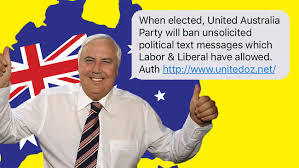
The Magpie got one, and the old birds instant reaction? Roaring laughter. Lets give Ol Lardarse a couple of brownie points the text is one of the funniest, and surely intentional, jokes of the current election campaign. Unsurprisingly, there was instant babble about hypocrisy which came thick and fast from the pompous chatterati navel gazers, but the Pie will take his laughs where he can get them, and salutes whoever thought up this one for Palmers doomed campaign (possibly someone called S. Sokolova, who authorised the text for the UAP).
In fact, doomed causes seem to be a recurring theme this week for Clive, who announced he was giving a dinner dance for a select few Towns-villains to celebrate Titanic ll the return of the legend. Sad when someone has to promise free food and booze to get them to just turn up. And the general feeling is whatever sort of guest selection process that was bubbling around behind the Palmer brow, if you didnt get an invite, then you were not considered of merit or value to Clive.
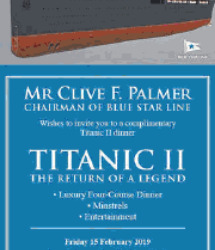
But when it became known amongst our movers and shakers who was in and who was out, it was a matter of do we laugh or cry was it a hot ticket, or a hot potato ticket, to be dropped immediately? Being favoured by Palmer is something many would like to be quiet about, but then, neither is being left out of a fabulous free food fight, ones ego can be buffeted by such neglect. Many would have loved an invite if for no other reason it have the unlikely option to RSVP sod off.
But Bentley for one believes it will a unique experience, with special attire for dancers.

The highlight of the night for Clive will be when the adoring and grateful throng gather around him to sing what he will think is a fitting tribute to him, a rousing rendition of the Titanic hymn, Nearer My God To Thee.
What Starts Out As A Good Idea Doesnt Always End Up That Way.

The Local Government Association of Queensland has been around since 1896, and for the most part, has been a valuable and necessary lobby group for all Queensland councils.
Councils pay an annual fee to belong to the LGAQ (Townsville pays around $250K annually), membership is voluntary but all 77 Queensland councils are members. In total, they pay $35million annually in membership fees. The smaller outfits get value from matters such as insurance deals and other areas where the Associations clout can be brought to bear.
But about 10 years ago, under the leadership of former Townsville council executive and now the Association CEO Greg Hallam, it was decided that there were more lucrative fields in which the Associations leverage with such a captive (albeit voluntary) membership could be used to build a significant commercial operation. Put simply, the organisation decided to become commercial entrepreneurs.
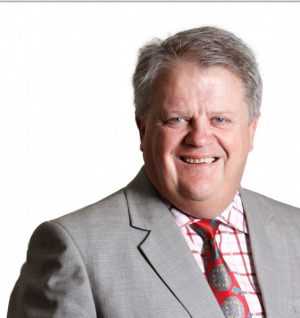
LGAQ CEO Greg Hallam
And boy, did they ever. Figures for 2016 show there was a massive bump in revenues, jumping from $46m to $73m, a goodly chunk of this coming from their commercial procurement arm Local Buy (that includes the $35m membership revenue). In simple terms, Local Buy has screened and listed (for a fee) various businesses from across the state, all of whom can then by-pass the tender process and submit direct quotes for contracts to any of the 77 council members. On the face of it, this saves councils money in avoiding the costly procurement work of tendering and so on. But it also sounds like an invitation to corruption on a grand scale. The Pie has no evidence of or suggesting there is, such activity, but looking at the process, there doesnt seem to be a foolproof safeguard against some expensive jiggery-pokery if someone wanted a new spinnaker for the yacht.
But does it save councils money?
Local Buy is anything but since it opens up work to the whole of Queensland, often bypassing truly local businesses in the highly selective process which requires a fee for ticking the right boxes (literally, apparently). Local Buy takes a cut of the contract amount of the winning quote usually 10% but The Pie is told sometimes more. Of course, since this is all above board and known, what do the quoters do? They of course factor the 10% in and add it on to their quote, in many cases wiping out any significant savings for the council involved, as well in some instances, as denying many a rate paying, money-spending locals a job . This has caused a great deal of angst here in Townsville, whose mayor is a $32K plus a year LGAQ director, and whose sidekick (now on what seems permanent leave), Stephen The Screaming Midget Beckett, is reported to have had loud abusive outbursts with local business people who have complained about the situation.
And to what end is all this? Theres a great deal of money flowing into the coffers of the Association, and they arent shy of shouting themselves lavish overseas jollies disguised as work studies. Why does a lobby group want to be so entreprenurial? Do they want to reduce council membership to zero on the user pays basis (yeah, right), or some witty cynic might suggest, as a lobby group, for a bribery pool? (Just a joke, Mr Hallam, put down the phone.)
But there is a more troubling aspect to this arrangement, apart from freezing out local contractors and permanent local workers rather than special workforce brought in for a set amount of time before disappearing back wherever they came from.

If you care about strong local voice in Townsvilles affairs, it would well to be wary of a crowd called Propel Partnerships, who appear to be getting into bed with the LGAQ. Propels buzz-word blurbs try to disguise their activities by describing themselves as a shared services company and pepper their media releases with such euphemisms as fully integrated customer services; Propel Partnerships is simply a profit-driven, out-sourcing business. Current (or possibly former by now) chairman Jim Soorley, that old Labor stager from way back in Brissy, had his mate Carl Wulff, the then CEO of Liverpool Council in Sydney (now awaiting sentence in chokey for bribery in the Ipswich scandal) enter into an agreement that has ended up with the NSW Crime and Corruption Commission.
This sort of thing can cost local jobs and introduce a totally remote, sometimes hostile letter-of-the-law approach to dealings with staff and with the local community in such areas as rates, payroll services (shades of Qld Health yikes!) and licensing. And not a chance of a face-to-face session of negotiation.
This is an extension of the popular Big Brother move in business, a model that even further removes the public from reasonable (and reasonably expected) interaction with their council.
To understand what happens in both these centralisation scenario, one need look further than the dear old Townsville Bulletin, which has been so savagely ravished by Ruperts money-hungry minions and sloppy reporting staff directed from Holt Street in Sydney, a paper which hilariously subbed in NZ, Mumbai, the Phillipines or Brisbane. Of course, one attraction for councils in this model is that it does away with the necessity of either engagement or accountability with the people who elected them or provided their jobs.
This is the rapidly emerging tip of a massive iceberg, with Greg Hallam and his board deciding rather than try and fight off a competitor in an money-sinkhole business battle, instead join forces and share a cut of a captive pie. This is obvious when Hallam gave this ringing endorsement :
The work of Propel Partnerships ensured that councils were ableto realise efficiencies in their operations while remaining in touch with the needs of their communities. Im confident that Propel has the right formula to bring success to any local government wanting to havethe best customer service, he said.
This type of service clearly does no such thing as remaining in touch with the needs of their communities quite the opposite . Mr Hallams self-serving ideas of best customer service and that of the general public may widely differ laughably so. Saving money, especially public funds, is in most instances an admirable goal, but in this case, it is just another legalised rort of dubious value: and it is actually doubtful that the average ratepayer gets a single cents benefit therell always be reasons found not to lower ratesand charges. So be wary of this sort of further alienation of individual communities by the robotic, rorting remote control of more aspects of our lives.
More Lessons To Be Learned From Post-Pisasale Ipswich
Before we leave this subject, check this out.

Those figures are mind-boggling and it could easily happen here unless we are on our toes after all, before his downfall, Pisasale was lionized by Jenny Hill, who said she wanted Townsville to be more like his Ipswich. It probably is, but the CCC just hasnt found out about it. And this sort of lark dovetails nicely with the cold, callous restructure advocated in the Jenny Hill-0commissioned Nous Report.
And boy, hasnt that Ipswich decision put Hallams panties in a bunch. The LGAQ chief seems somewhat spooked by the Ipswich scandal coming so close to home, and used Trumps favourite trope to discourage any close examination of local government in Queensland.
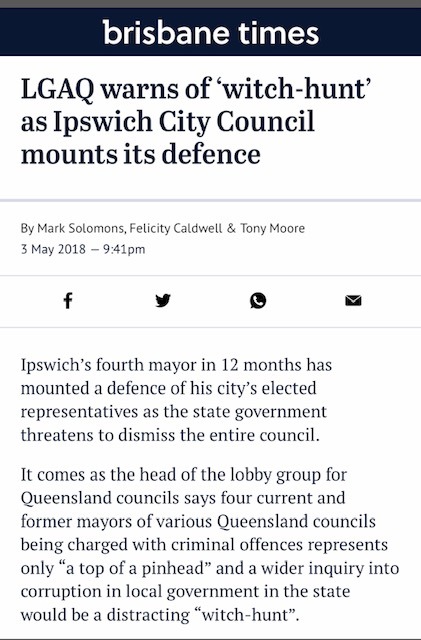
That mentioned head is of course Hallam, and it could be said, on the evidence of other corruption in councils, that the word pinhead could also apply to him. Maybe the CCC might start taking an interest in the LGAQ and all those tens of millions. Now that would be interesting.
Historical Snapshot: Barry Taylor And One Of His Mates Yesteryear
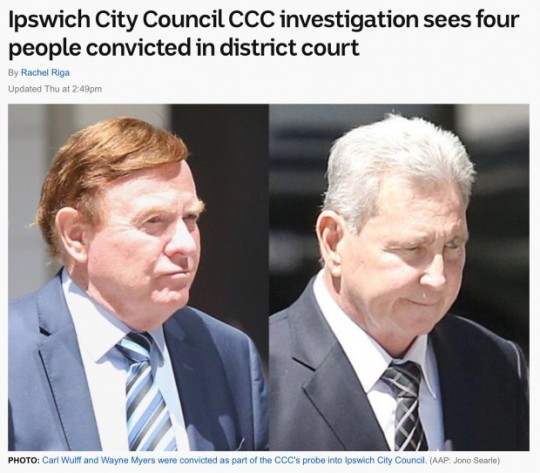
On the left, the bloke that looks like his got the loser of a cat fight on his head, thats the Carl Wulff that was Jim Soorlys pal at Liverpool Council before Wulff headed north to Ipswich. And of greater interest to us here in the ville is the bloke on the right. Thats Wayne Myers, a seriously well-connected go-between linking corporate life to a number of movers and shakers in the Queensland ALP. Mr Myers has pleaded guilty to corruption in connection with the Ipswich council he has admitted he facilitated bribes to go to his co-offenders who have also pleaded guilty. He will be sentenced next month when well see just how well connected he is.
But heres an interesting little bit of nostalgia Mr Myers is no stranger to Townsville, or to legal fee gouger Barry the Legal Foghorn Taylor.
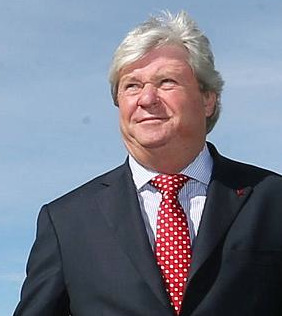
Back in the early noughties, maybe 2004, Meyers rode into Townsville with the hope of siphoning a good chunk of public money into his community telco business, which was being driven out of non-performing mining minnow Rennison.
It was a classic case of the Mates Economy. Myer recruited local Labor fundraiser and Mooney confrere Barry Taylor to corral a bunch of bizoids into his boardroom to hustle the dollars. Each chipped in $20k (including apparently Mrs Foghorn more on that in a minute) and then Myers went about trying to convince His Radiance Mayor Mooney that the ratepayers should (1) chip in an interest-free loan of $250k, (2) $20k of straight-up equity, and (3) commit to a long-term deal for all of the Councils telecommunications needs to the new company.
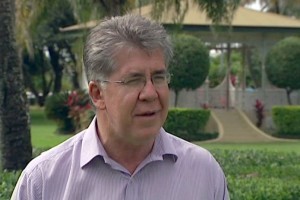
As things transpired, His Radiance, in his pre-meltdown years, had the good sense to have the matter properly researched by his then IT chief Anthony Wilson, who quickly nixed the deal offered by Myers and Taylor. Despite a lot of aww, cmon, mate, old buddy, pal entreaties, Mooney said no. In fact, The Pie was told that Mooney thought the whole thing a bad joke. The deal on the table was a dud. Myers model guaranteed fees to Rennison first and before anyone else; would have delivered sub-par service and cost outcomes to Council (Council could and did do much better); never budgeted for a repayment of the proposed loan; and didnt have a cent of interest for Council.
Poor old Richard Spiderman Ferry had become the chairman of a local business he knew nothing about. He was left carrying the can, when the business model proved a failure. There is no information about what happened to any monies that may have been handed over, but you can bet Bazza put in a bill for any legals.
What Myers (and Taylor, who mustve surely twigged to what Myers was up to if he hadfnt twigged, doesnt say much for his legal or business radar) tried to get away with was an arrangement where Rennison re-sold Optus Services to NQ Telco, and took a clip. Too many layers with too thin a set of margins doomed the activity from day one.
Myers went on his way, and Bazza carried on his hosting of other southern white shoe brigaders and their dubious schemes, notably the disgraced fraudster Craig Gore (currently fled to Sweden in the hope of avoiding jail on multiple charges of financial fraud), who risibly said he would put in a canal estate in the duck pond in front of the casino. Considering what happed later with Port Hinchinbrook, Townsville really dodged a bullet there when that all fell flat, but no thanks to Mr Taylor.
But All This Has Led To A Personal Revelation For The Pie
The Magpie has never fully understood the seething animosity that has driven Taylor on a vendetta against him that continues in the courts to this day. Barry on several occasions over the years, had threatened to sue me, but was never able to say for what (he was drunk on two occasions). Of course, he was all hot air at that stage because Bazza was never brave enough in his bluster to take on News Ltd, for whom I worked at the time. When Peter Gleeson came to town, he was in Barrys pocket even before he arrived, with his wife pre-promised a cushy job with Enema Legal.
I was puzzled that a boisterous boofhead like myself could attract such venom. At one stage, Taylor had Gleeson direct me to delete a quite harmless mention of him he had heard I was to include in the Magpie column (the comment simply said he had bought a multi-million dollar property in Noosa, and Barry said it could damage his reputation in Townsville his what, you laugh?) that was only time any editor interfered in any of my opinion columns for personal and not legal reasons. In that incidence, Taylor sent in a handwritten letter which Gleeson showed me (appalling writing and grammar) that strangely said that I was waging a campaign against his family. I didnt, and dont know his family, and quickly proved in the papers computer system that I had mentioned Taylor a total of 7 times in 8 years, none of them derogatory. I mentioned his wife in passing once when I wrote that she was the director of a company THAT HAD PUT $20k INTO A DUBIOUS TELCO BUSINESS WITH THE COUNCIL! Nothing illegal or even untoward was suggested, except that I didnt think it was a good idea.
So there we have it.
That must have been the start of it all, Baz not only being caught out in the subsequently failed telco venture, but that I had revealed he had inveigled his missus to whack up some cash as well (through a company of which she was a director, as I remember). Totally harmless, just a bit of local gossip, but somehow, Barry became as jumpy as a long-tailed cat in a room full of rocking chairs.
His bluster continued down the years, including threatening to arrange a boycott of Michels restaurant if they didnt drop their advertising on this blog. (They did drop the ads, he was a valuable albeit much disliked customer, but were happy to let me keep the couple of hundred they had paid.) And so it goes on still, he talked poor old Rabieh Krayem into suing me for alleged libel, knowing full well that I have no money or assets to pay 100th of the ludicrous $300,000 claimed.
Well, Baz, hatred comes at a cost, because you didnt reckon on two highly principled and incensed lawyer friends who offered to defend me because they cannot abide bullying, especially legal bullying like trying to spuriously involve my daughter on a technicality in matters that dont even remotely concern her. That alone was a clear measure of your craven behaviour and that of the ninny Venesa Gleeson (Typos wife) as a mother herself, youd think she might have some scruples, but alas, she will use the Hitler excuse I was just following orders least the Court of Appeal has chucked out that bit of vicious nonsense.
Rabieh, make sure you have it in writing that Barry is doing this for nothing for you, and that it really, as a mutual friend told me, purely Barrys show. Otherwise, those Nudgee fees for your two lads may well end in up in the Taylor bank account in Noosa.
The Townsville Property Market Will Be Hunky Dory In 2019, Says The Astonisher.
As the Hotels Combined teddy bear says on telly Really? Dont believe everything Mr Convincing tells you.
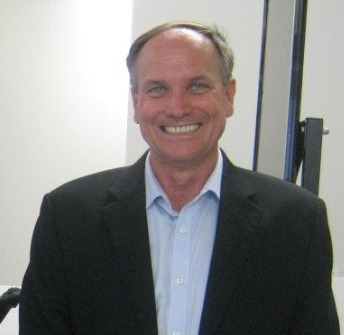
Since the City Economist, David Lynch, seems largely silent, heres a chart showing building approvals for 2018 (December numbers not available yet). The data is from the Councils own website.

One could do some extra work and show the comparisons for the previous year, or two for that matter, but why take work away from Lynchy.
To summarise: to the 11 months, in 2017 there were 641 dwelling approvals. In 2018 there were 432. For those numerically inclined thats 209 fewer or 30.2% less in number. And gee, I thought the stadium was going to be the one catalyst that would turn the whole show around. The one catalyst claim came from none other than the muppets at Enterprise House (where Mr Lynch used to work.)
And to cap things off, The Pie offers these self-explanatory charts.



However, the Astonisher persists with its cheery inanities, but raises an interesting pictorial question. One of the spangled cheer leaders of this self-serving guff is this bloke

Propertyology managing director Simon Presley
A propertyologist sorely in need of a psychologist and some serious sartorial advice. Seriously, are you going to believe a bloke who decides to sit in the middle of a busy Brisbane road, with an empty chair next to him to signify that no one else is that dopey. Keep it up, Mr Presley and youll soon be joining your namesake.
Captain Towns May Have Been A Blackbirder But
At least we have tucked his statue away in a discreet corner, but not those right-wing race-baiters up in Cairns. They have even got Captain Cook throwing a big Nazi salute.
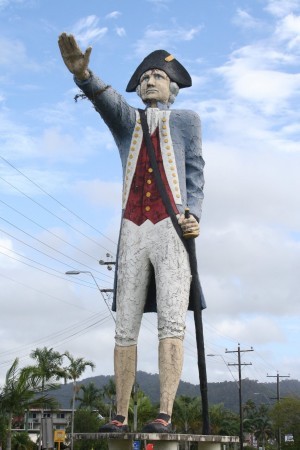
Finally, Not One But Two Mini-Galleries On Overseas Matters
The first is the Brexit hullabaloo, which is far from over, but has been a cartoonists cornucopia. Heres four of the best.



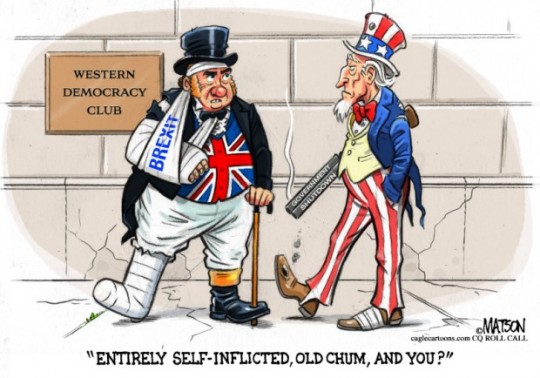
And That Leads Us Into The Week In Trumpistan
What a difference a few hundred metres makes.
Because of his tantrum induced government shut-down, Trump was without catering services to entertain a visiting football team. So as a man addicted to whoppers, he called in Burger King to provide the food for the boys (he couldve just as easily gone with Maccas, asking his guests You want lies with that?)

And just down the road in DC at the very same time, there was a food line of Federal employees who havent been paid that stretched around the block of this massive federal building.

So its true what they say about America being a land of contrasts. That issue continued to dominate the visual commentary of the week, but the New Yorker knew who was needed to sort out demon Donny.
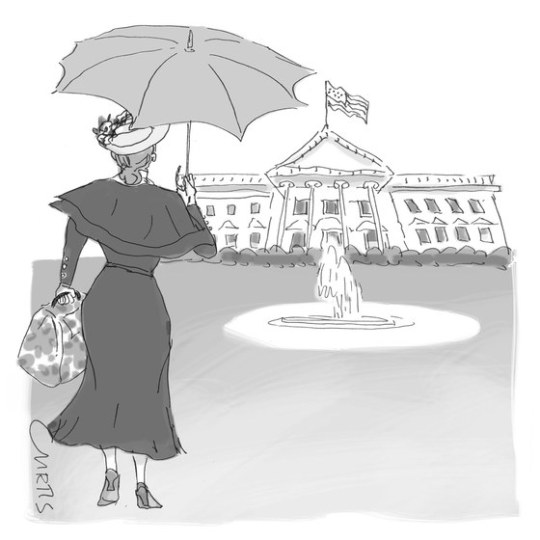
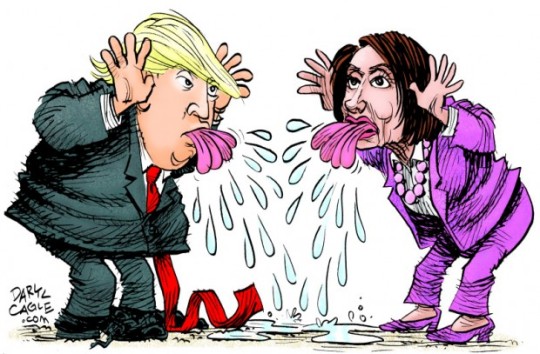
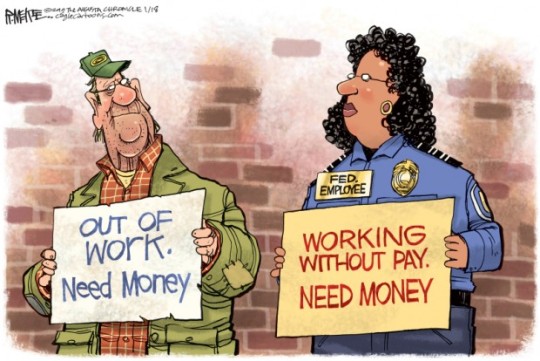



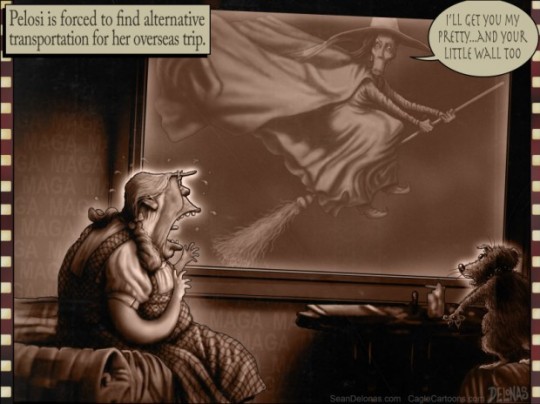







And so it goes
..
Thats it for this week, Nesters, and remember that comments run throughout the week, have your say, there was a very lively thread on the council getting involved in the citys mental health work (some hilarious) and theres plenty of fodder in this weeks Nest. And The Pie is loathe to say it, but times are a bit skinny in the Nest at the moment, with a few blog bills hitting the deck since Christmas, so any help with a donation would be greatly appreciated. The how to donate button is below.
http://www.townsvillemagpie.com.au/the-local-government-godzilla-should-the-ccc-be-taking-a-closer-look-at-the-money-grubbing-activities-of-the-lgaq/
0 notes